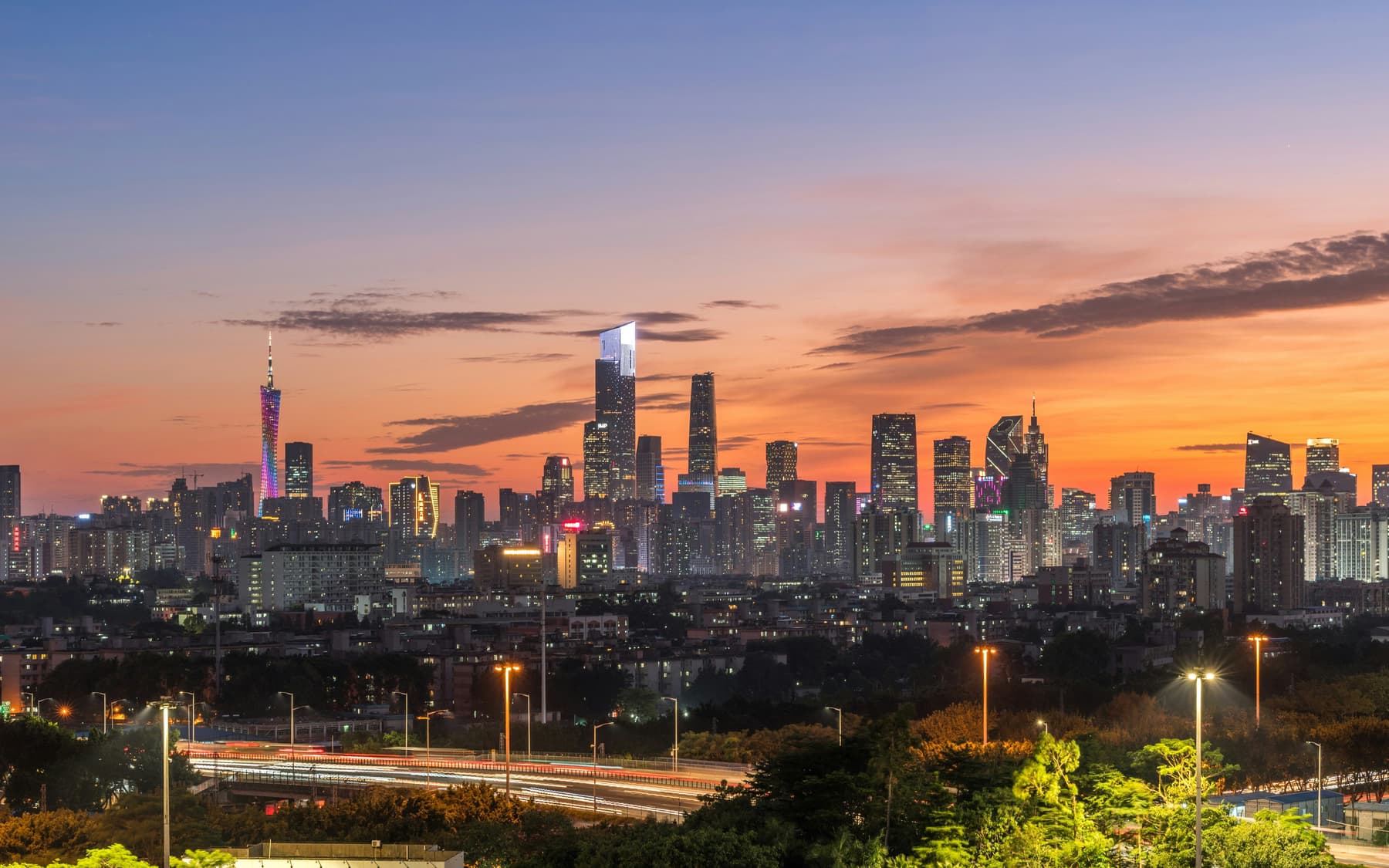
- Published on
- Reading time
- 42 min read
First Time Visiting China
Intro
Last November, Jiayi and I took a surprise trip to China after Jiayi's father had a severe health scare. Over a year later, he's doing excellent, with the family staying on his case about exercising regularly and dieting. Still, at the time, he needed Jiayi and her siblings to return and help care for him until his condition stabilized.
Despite hectic travel arrangements, it was an enjoyable trip mixed with tourism and family time. Travel in China, especially from an American perspective, still bears an air of mystery to it, so I'd like to share my experiences along with the story of how we ended up visiting in the first place.
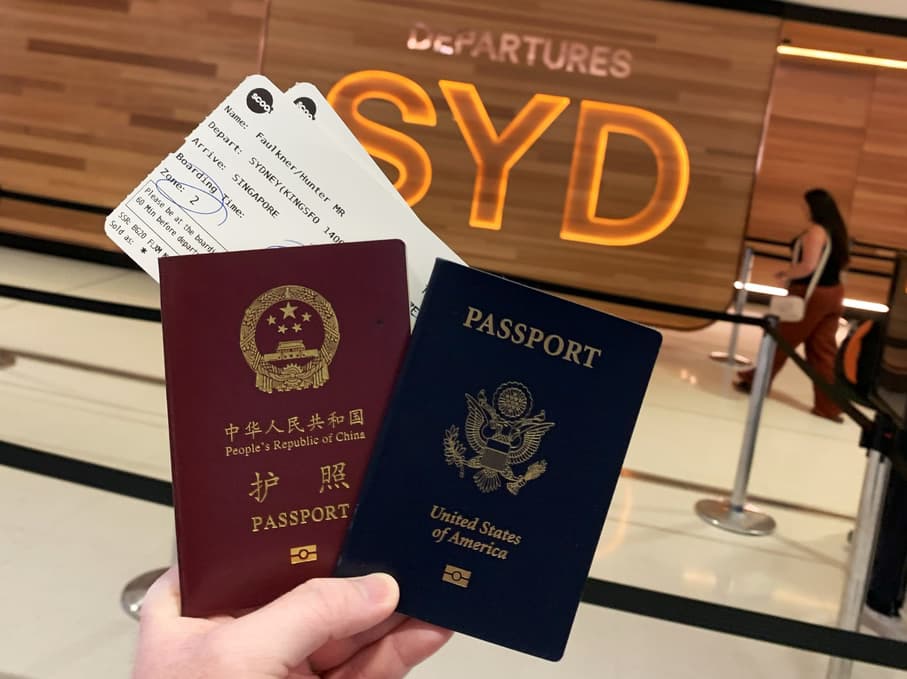
Sections
- Why, how, and when
- Out night in Singapore (Changi airport and Jewel)
- Jiayi's hometown, Qingyuan
- Yum cha with friends in Guangzhou
- A Reunion in Shenzhen
- Time with the family
- Wrapping up
Why, how, and when
After not seeing our families in 4 years, we had planned visits to the US and China during their upcoming holiday seasons. Nearly a year in advance, we intended to travel to the US during Thanksgiving and China during Spring Festival in early 2024. Our aspiration was to apportion our limited time evenly between each side. Additionally, I had a $750 (USD) flight credit expiring in December from a prior, canceled flight. Factoring in these conditions, we had an initial plan, and around July, flights were booked to head back to the US in November.
Father-in-law's health scare
Around a month later, quite suddenly, Jiayi's father had several major health issues, including a minor heart attack and a stomach ulcer. A cousin working at their family's soft drink distribution business went to check on him after he hadn't been to work for a few days, a rare occurrence and found him barely responsive and extremely ill. The family had him admitted to a hospital where he received urgent surgery for the stomach bleed and treatment for pneumonia. Shortly after, they diagnosed a heart attack on top of other blood-related issues.
Jiayi's brother returned to their hometown from Beijing immediately to care for and donate blood for their father, staying for the next few months while he was in and out of hospitalizations. However, her brother owns a fine art school where he teaches in Beijing, which he would soon need to return to for work. Her father was still dependent, so Jiayi and her sister determined they would need to return to help care for him, too. Her brother's availability would run out in early October, and her sister, who also lives in Sydney, had little annual leave from her new job and could only go back for one week in mid-October. Jiayi and I hadn't traveled much, so our leave balances were pretty stacked, with Jiayi having almost 7 or 8 weeks built up at the time (the legal minimum in Australia is 20 days per year with rollover and payout for unused time).
Because she had that much, Jiayi planned to stay for a month, so we booked flights to arrive the weekend her sister was leaving. This obviously conflicted with our trip to America, so I updated my plan to split time between China and the US while working remotely. I would go to Qingyuan for the last week of October and the first week of November, return to Sydney for a week, and then do two weeks in the US, but things didn't quite go as planned!
Melbourne CyberCon and our trip delay
Like Jiayi's brother, I had a conflict disallowing me from traveling to China sooner, a conference for work that had been on the books since June. Tickets, flights, and hotels were already booked for a 3-day trip to Melbourne for Australia's largest cyber security conference, AISA CyberCon. Conveniently, however, it was scheduled for the same week Jiayi's sister would go back, so Jiayi wouldn't need to travel ahead of me. Here are a few pictures from my time in Melbourne:
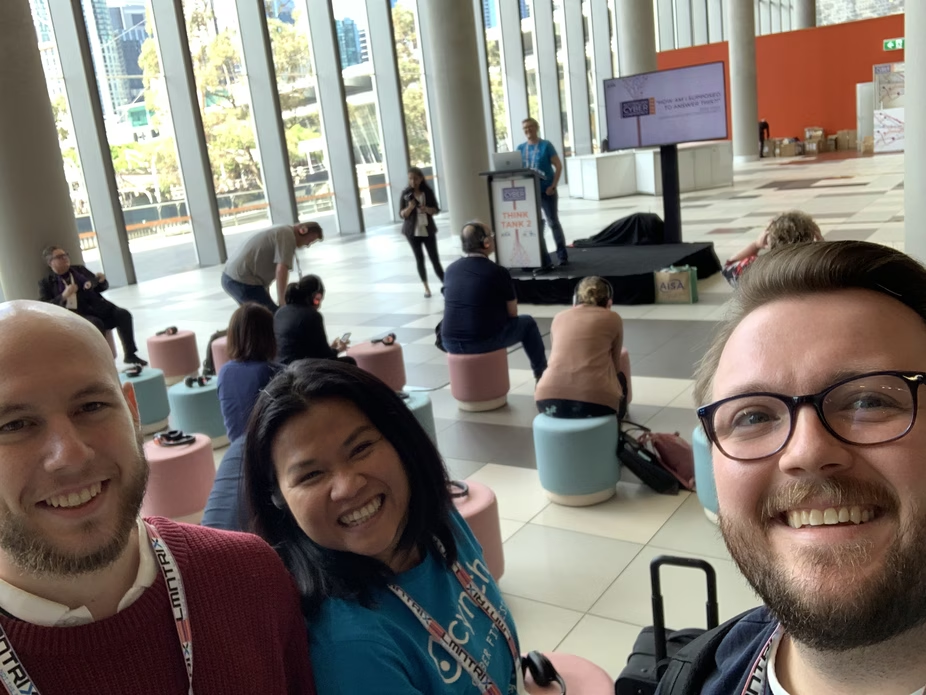
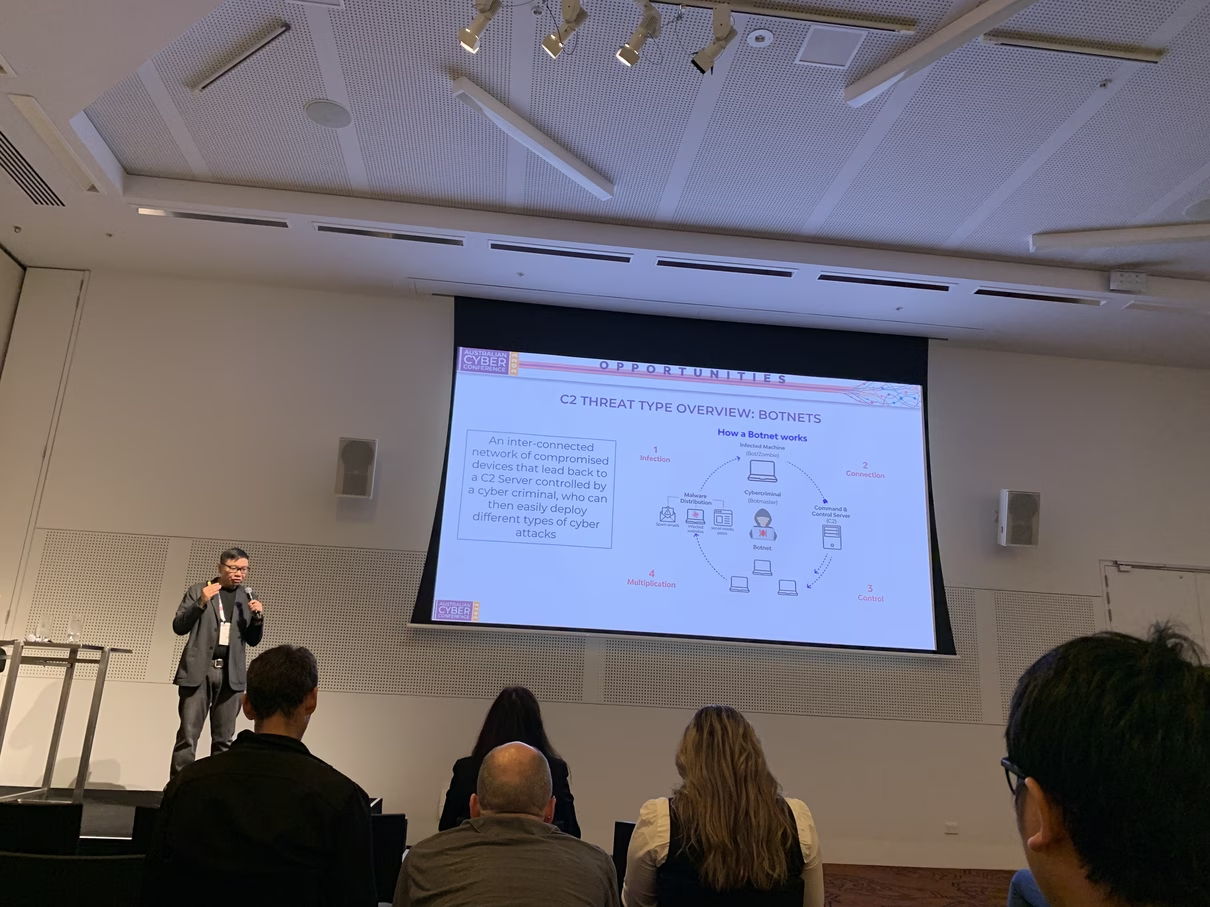
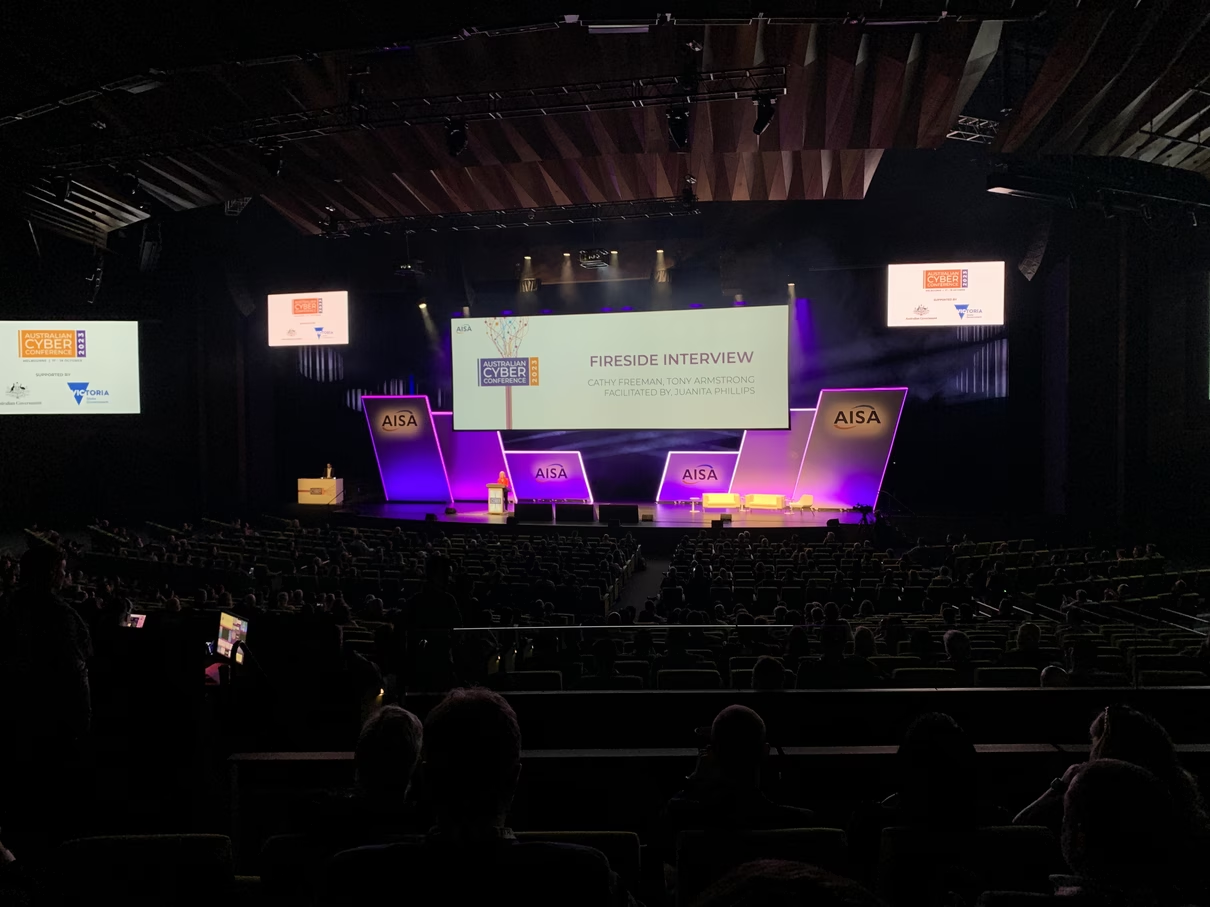
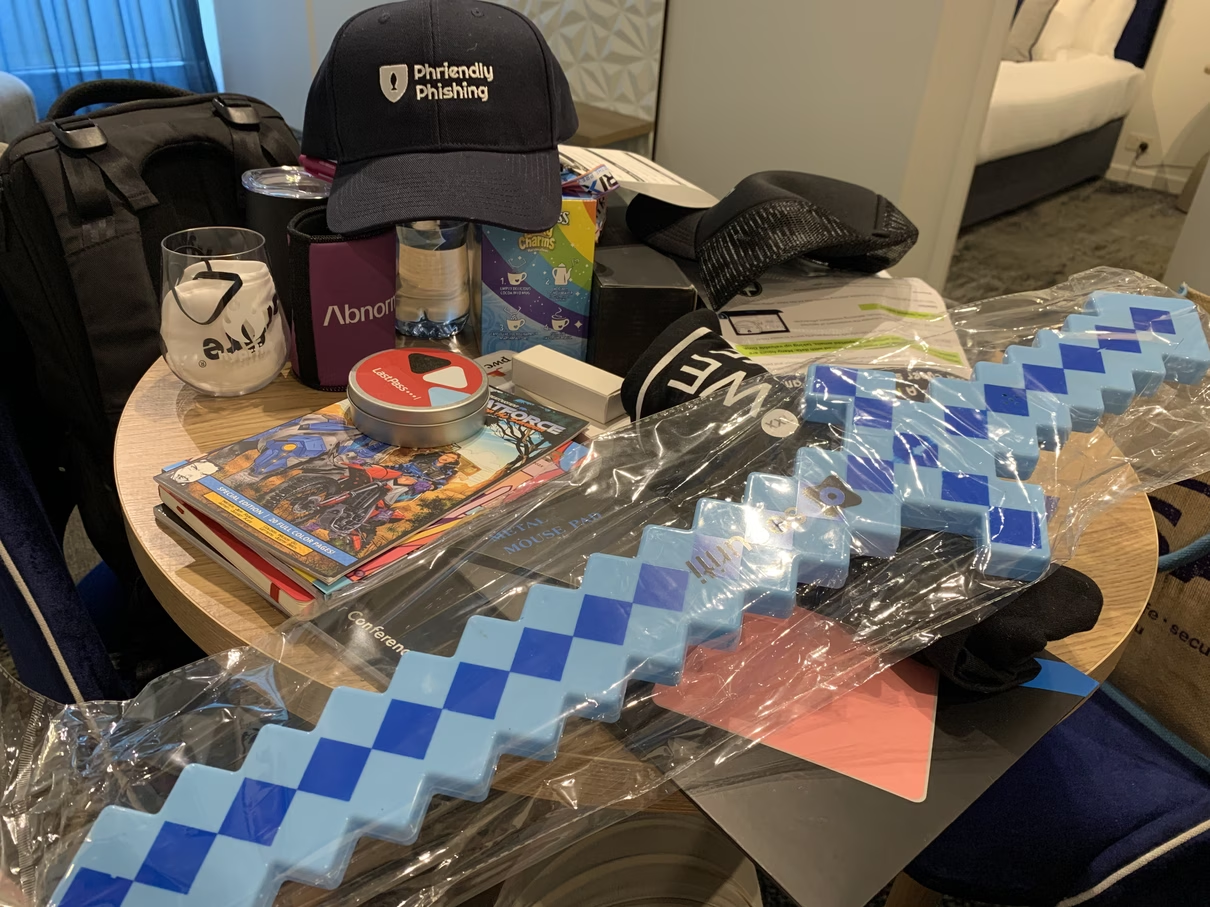
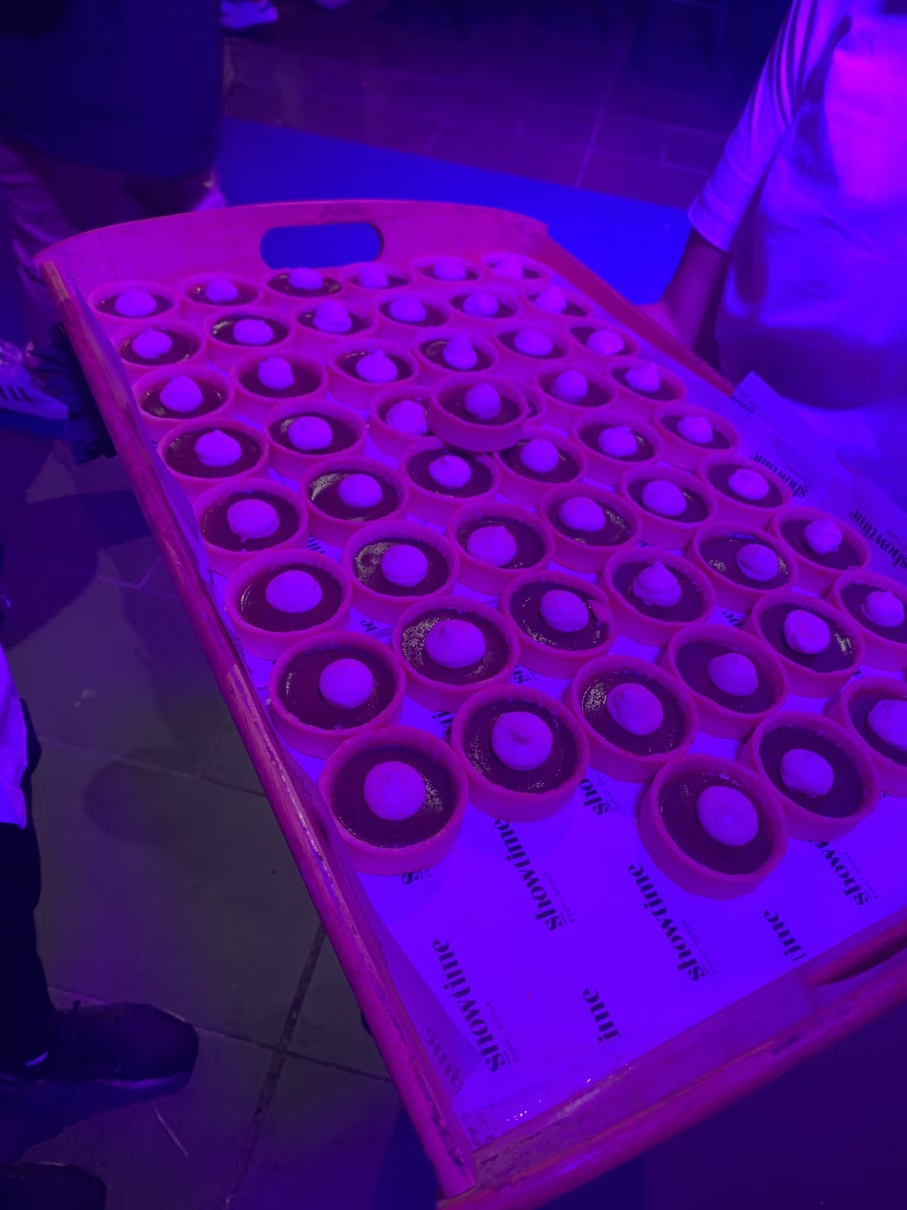
It was great to see everyone in person since I work remotely from Sydney, and I had a lot of fun until I returned from the trip. The event would turn out to be a gigantic super-spreader event, where I and many other attendees across Australia became symptomatic with COVID after the conference. This was only a week before we were supposed to leave! Fortunately, I always purchase flight insurance after a ton of bad luck with flights, so when I was still running a high fever and testing positive the following Wednesday, we pushed our Scoot flight back a week to ensure everything cleared up. Several symptoms hung around for over 10 days, so it was the right call to adequately rest.
Fun fact, this is literally the fifth flight booking I've had interrupted by COVID. 2 flights were canceled at the beginning when Australia closed its border (where my flight credit came from), 2 were canceled when I almost moved to Hawaii for a job where I went to the airport and wasn't allowed on the plane TWICE (I used the flight credit for this, and it got returned when I wasn't allowed to board), and then this flight to China which was electively delayed for my recovery and out of consideration for the other passengers. I recommend always buying flight insurance because we were allowed to change for free!
A never-ending travel plan
As another aside, delaying our trip had created the most chaotic flight plan I've ever experienced. On such short notice, our only option was an indirect flight to Guangzhou with a long layover in Singapore. In and of itself, this wasn't so bad (we wanted to see Changi airport). However, the flight credit I mentioned earlier was with Hawaiian Airlines. As I mentioned, they canceled my flight home from Australia in 2020 because of the pandemic, providing a credit set to expire at the end of 2023. Hawaiian has routes between Sydney and Los Angeles but none to China, so I couldn't change that to leave from Guangzhou. Therefore, I was stuck with the original flight from SYD to LAX, and because my stays in China and the US were now back-to-back, my journey from Guangzhou to Memphis evolved into this monstrosity:
- ✈️ Guangzhou to Singapore
- ✈️ Singapore to Sydney
- 🛌 1 night at home in Sydney
- ✈️ Sydney to Honolulu
- ✈️ Honolulu to Los Angeles
- 🛌 1 night in Los Angeles
- ✈️ Los Angeles to Houston
- ✈️ Houston to Memphis
6 flights in total and 3 days of travel!!! I felt bad for those I visited with back home in the US because I was an exhausted, jet-lagged zombie for the entire stay.
Out night in Singapore (Changi airport and Jewel)
Now, we can finally get on to the trip. On November 4th, we departed and had an exciting 12-hour layover at the world-famous Changi airport! We landed around 6:30 PM, 5 hours before the mall and shops would close. After going through Singapore's entry process, we were greeted with a massive Christmas tree. Underneath the tree, we took a tunnel leading to the center of Jewel and its iconic indoor waterfall, The Rain Vortex - the tallest indoor waterfall in the world, pumping 10,000 gallons of recirculated rainwater every minute!
Jewel's architecture and indoor landscaping were stunning. Our gawking made it obvious we were tourists, which led several friendly locals to approach us to ask where we were from, if it was our first time in Singapore, and if we wanted help taking some pictures, which I'll share below. She was welcoming to the country and suggested we check out the "new waterfall" recently constructed in Terminal 2. This one was actually a massive, realistic screen people could walk through, and I've included a photo of it below.

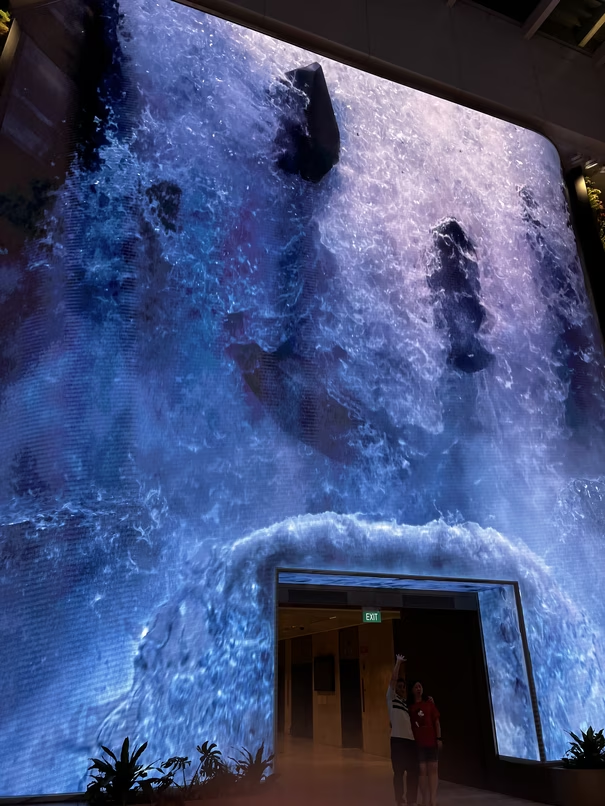
Next, we bought lots of stuff at a Don Quixote (the smaller "Donki" type), which I was expectedly nostalgic for from my time in Tokyo. They had many of the same Japanese products, so we got a few snacks, teas, and the heated, scented face masks we love. Realizing we were hungry, we headed to the lower food court beneath the waterfall. Whenever I go to a new country, I prioritize finding McDonalds to compare, so that's where I hit first. Uniquely, this was the only one I've found serving waffle fries, and there was a limited-time K-POP collaboration going on with branding and decor that had really cool pixel art:
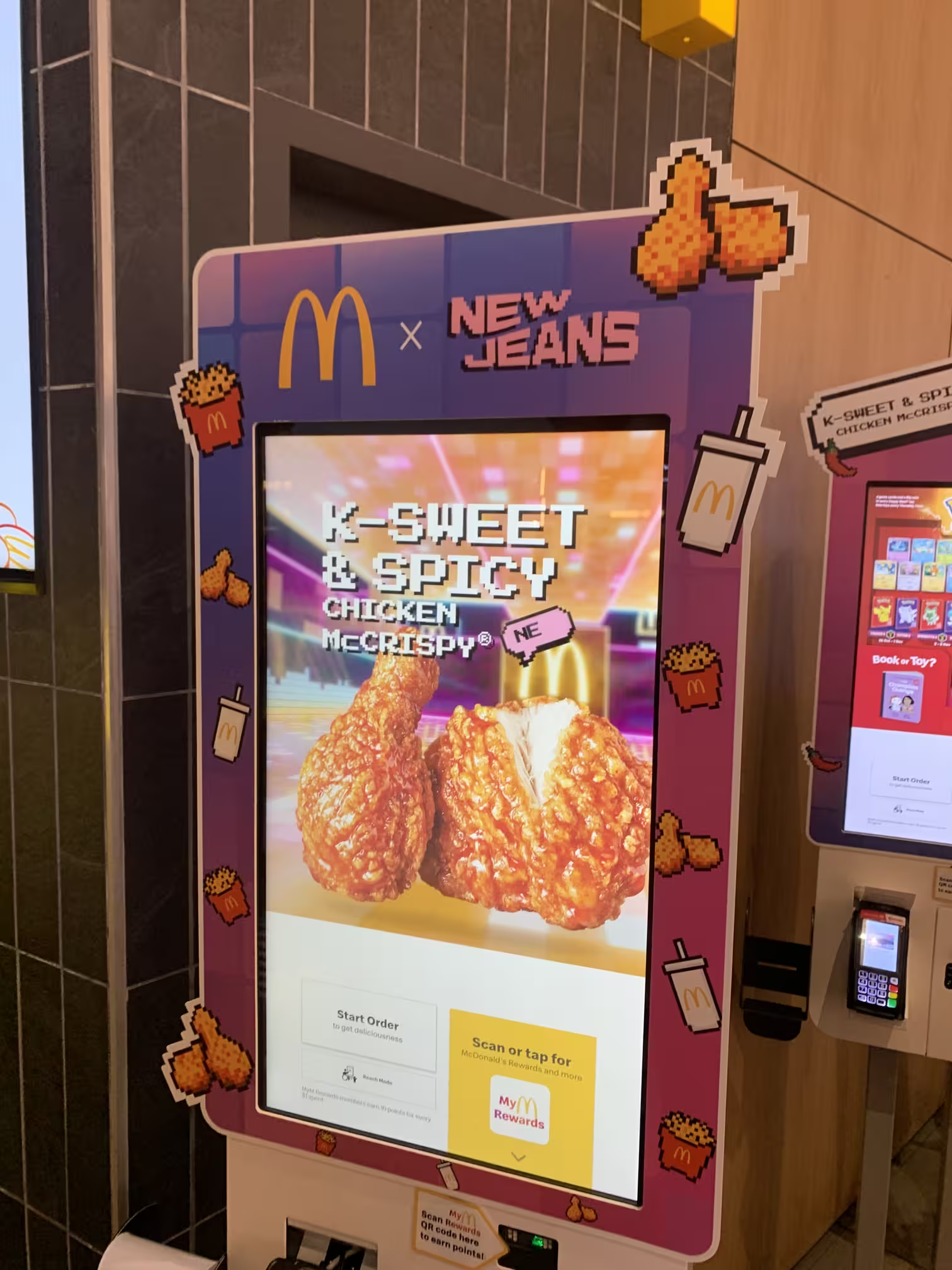
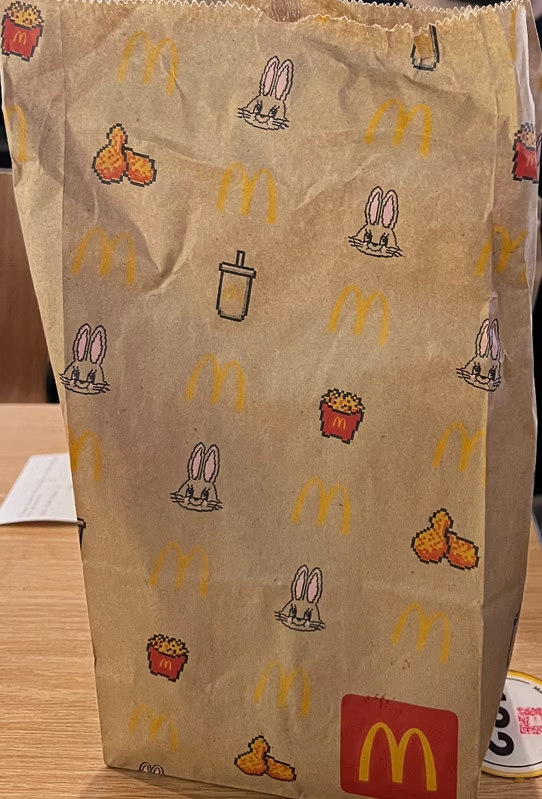

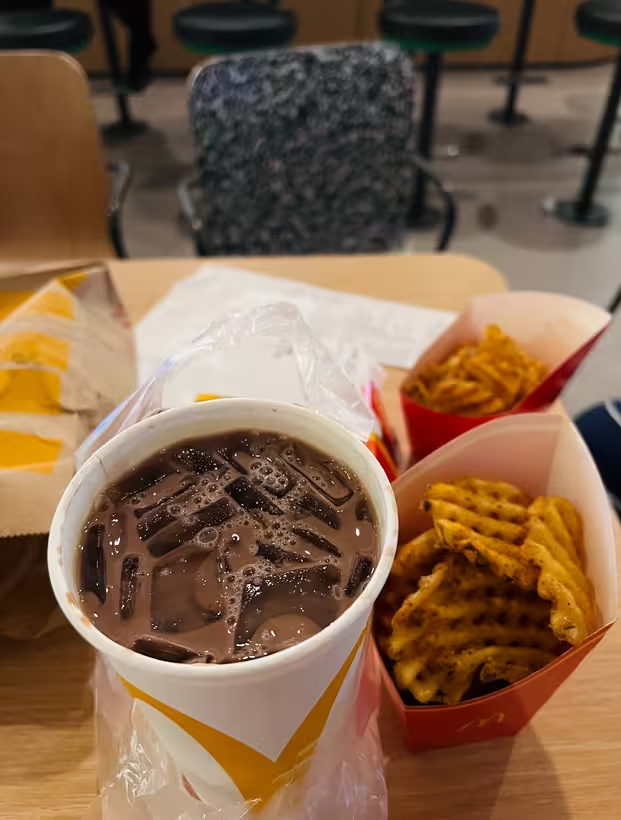
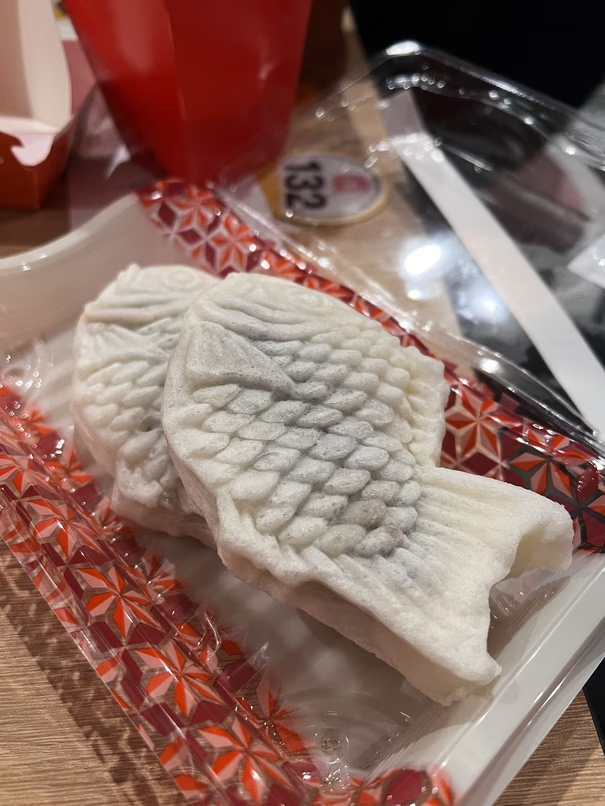
At the mall's highest level, we viewed the closing light show projected onto the misty waterfall. It seemed like a regular occurrence, but I'm unsure if they do it every night. Either way, here's almost all of the show featuring an indoor tram cameo near the end:
Shortly after, they shut off the waterfall and closed the stores around 11:30 PM. For the next few hours, we explored the rest of the airport by riding the trams, including the one that passes through Jewel's center that connects Terminal 2 Transfer E to Terminal 3 Transfer B. Despite the airport being big enough to get lost in, the trams make getting around quick and convenient. Once we'd had our fill, we returned to the international terminal and found some recliners to nap in until our 5 AM flight.
If you have a layover at Changi, the chairs in the international departure lounge are complimentary, comfortable, and equipped with international outlets to make saving money on a hotel reasonably doable. These are located on the far side of the duty-free shopping area after passing the goldfish ponds. The bathrooms were clean, so we felt comfortable brushing our teeth and washing up for bed. I'll drop some additional pictures below from our time exploring.
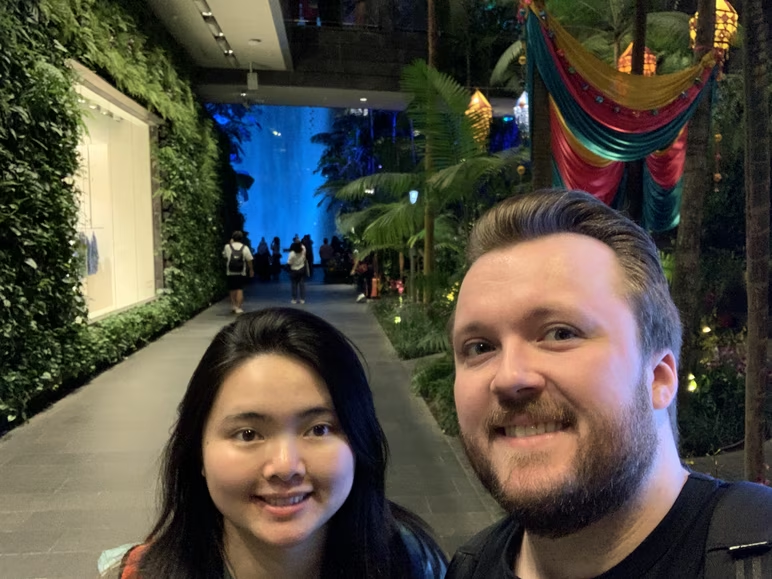
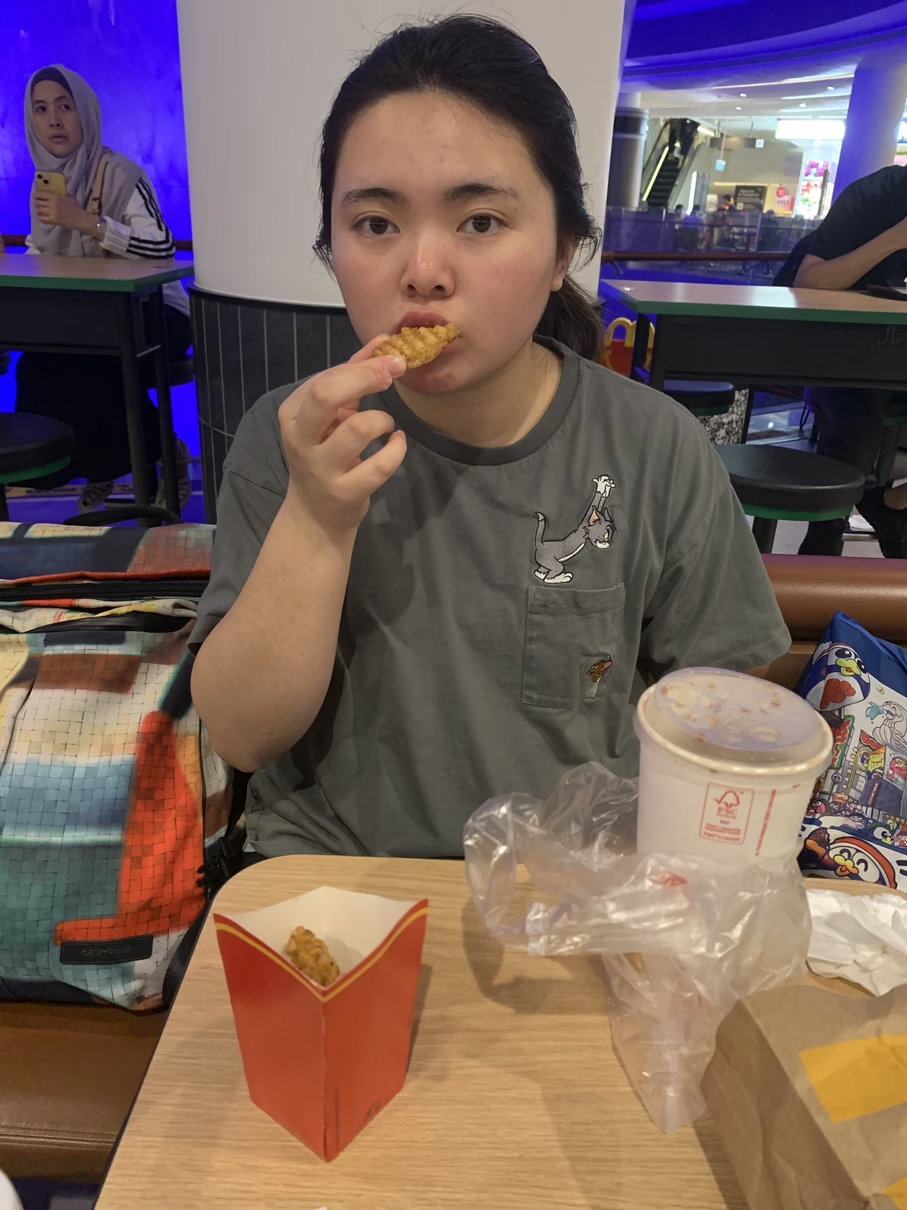
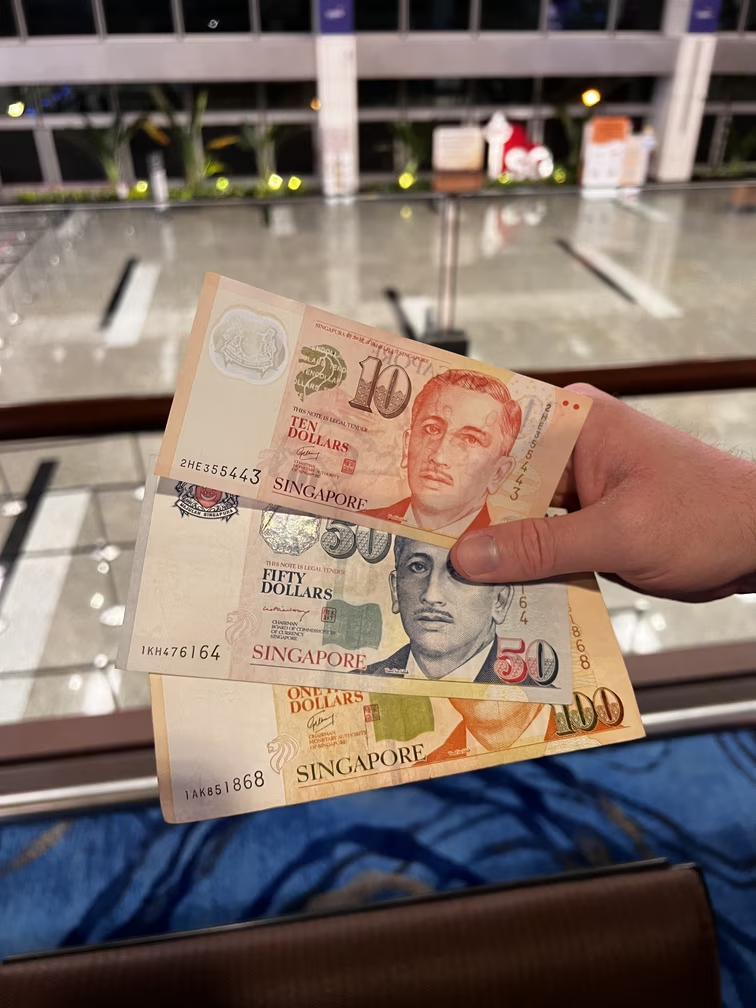
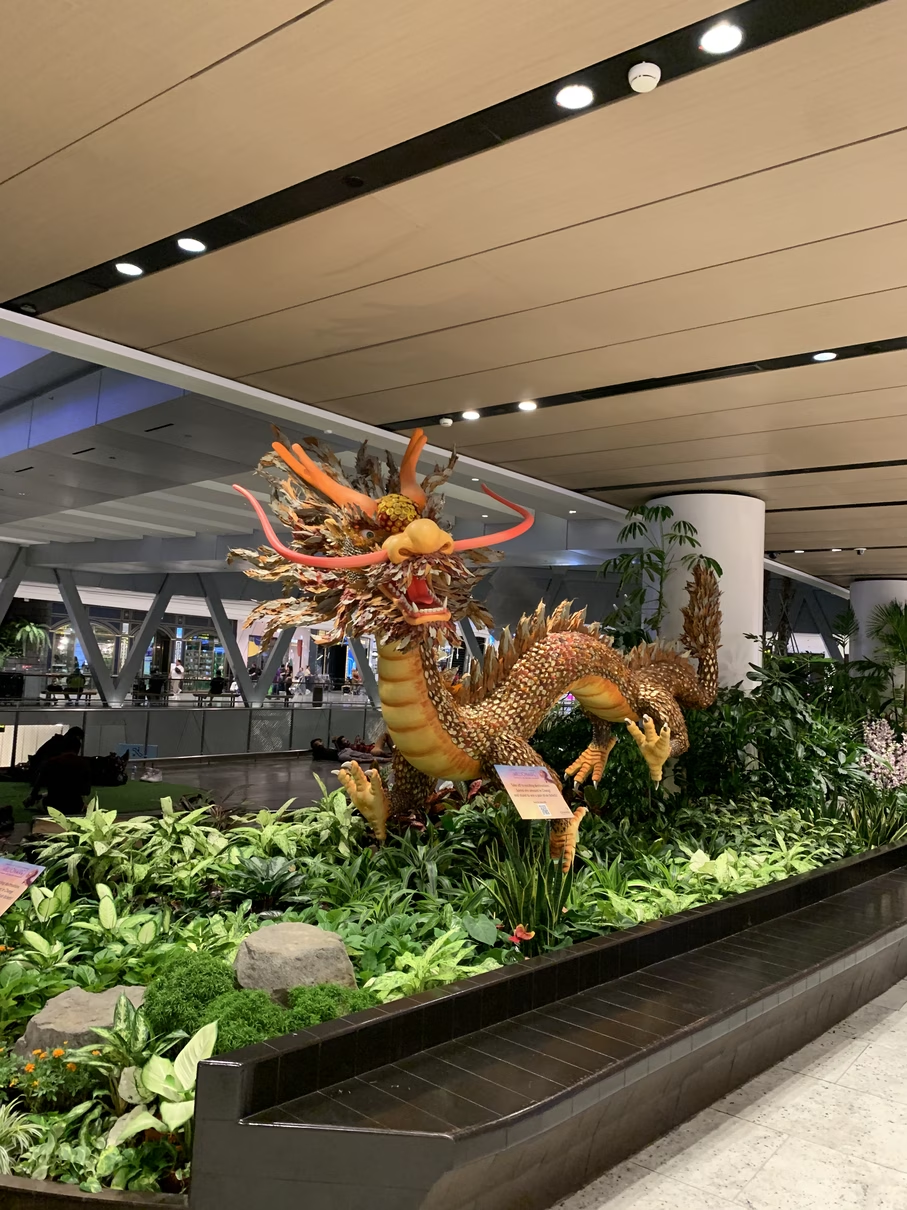
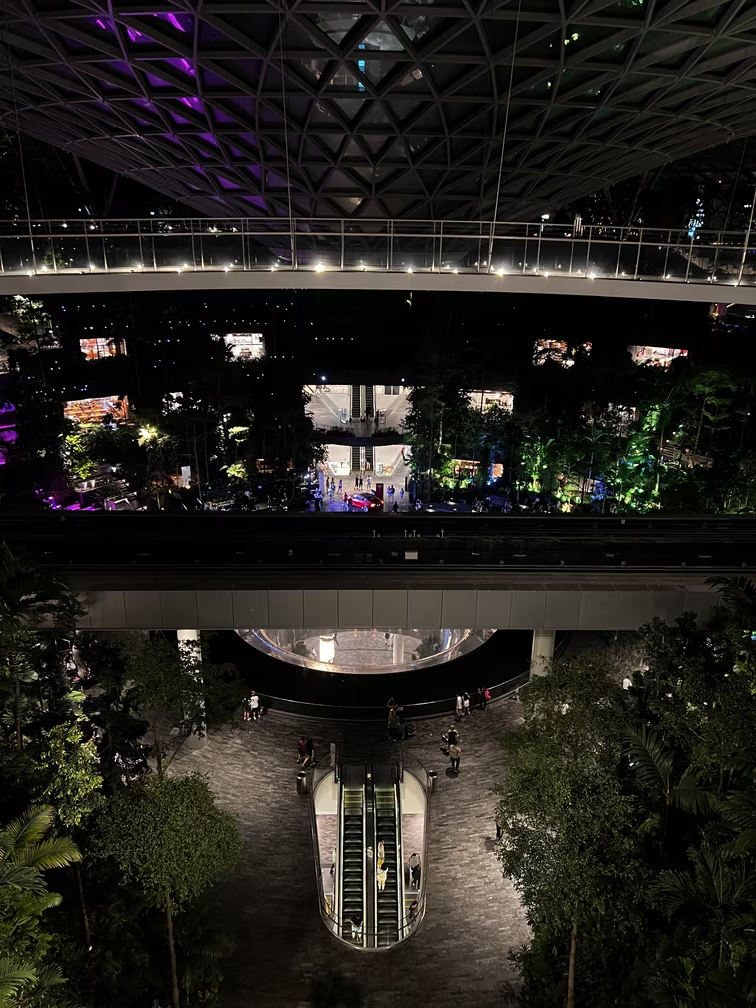
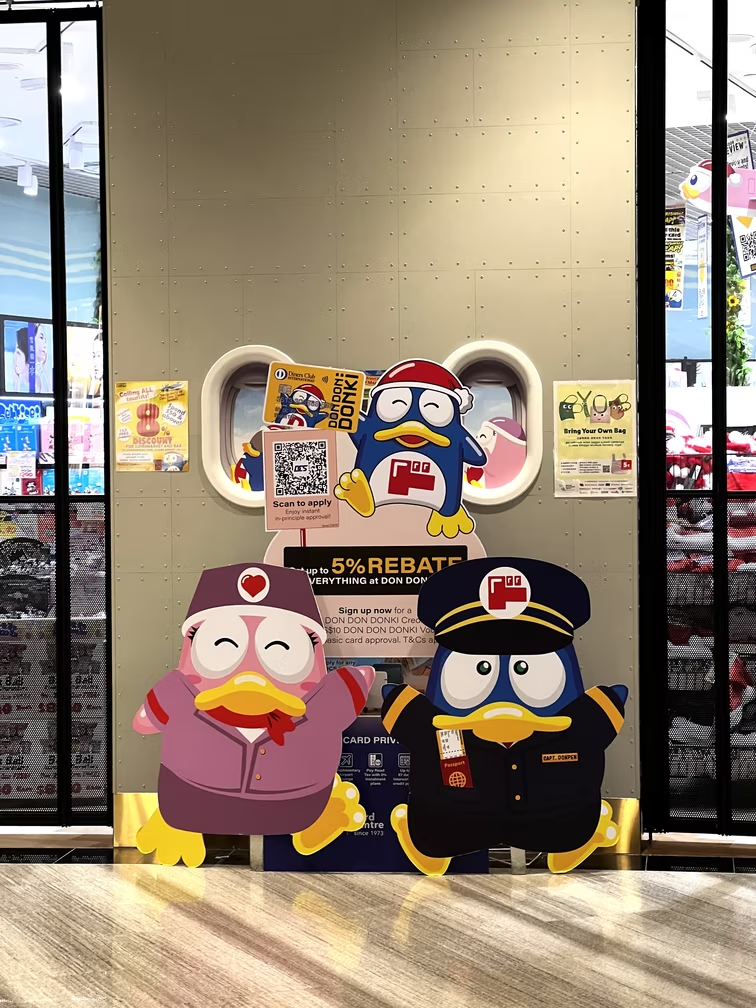
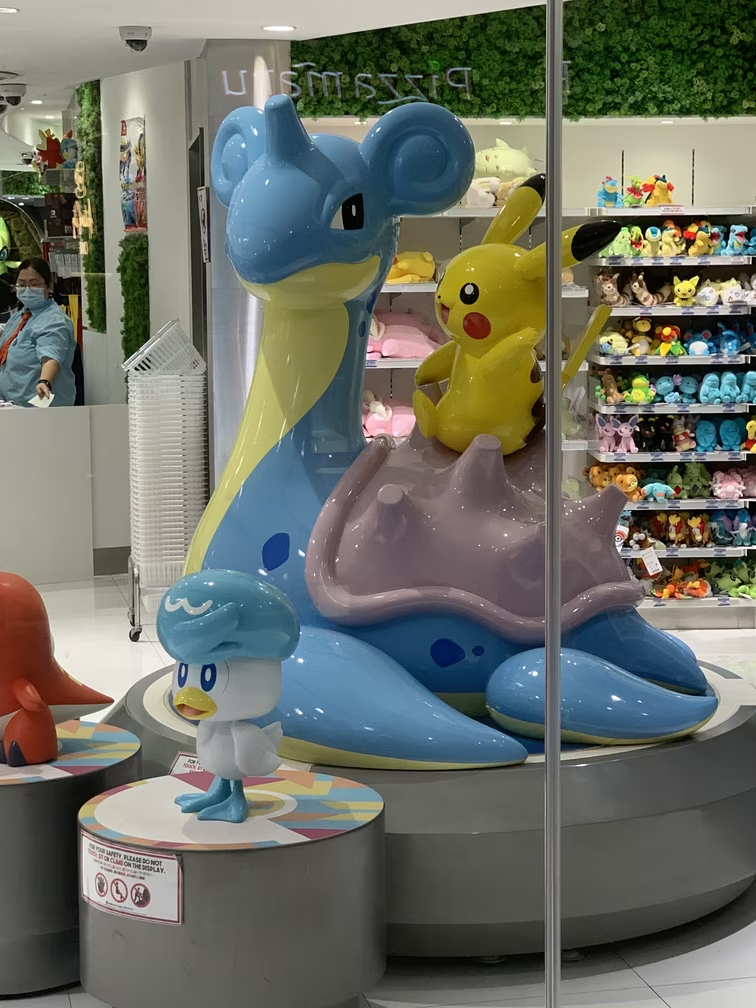
Jiayi's hometown, Qingyuan
The flight from Singapore to Guangzhou was only about 4 hours, but it felt like a drag due to my lack of sleep (I can't sleep on planes). After landing in China, we booked an hour-long, shockingly cheap taxi from Baiyun Airport back to Qingyuan! Since Qingyuan is a mountain city, the drive grew evermore picturesque the further we got from Guangzhou. Exiting the highway, we were greeted with many floral decorations on a massive roundabout - a sight that would grow familiar across many of China's inner-city roadways (we saw similar flower arrangements at roundabouts and along roads in both Guangzhou and Shenzhen).
Most of her family lives high up in apartment complexes along the Bei Jiang River, providing amazing views of the natural scenery. We were dropped off at one of their newer apartments where Jiayi's grandmother lives. While unpacking, I studied their traditional Chinese decor and interior design like marbled floors, abundant wooden accentuation, and intricately carved dining chairs. Additionally, because the apartment was new, it had one of those high-tech toilets with a washer, dryer, and heated seat like they have in Japan! Furthermore, I was introduced to a few items unique to Asia like the electric afternoon tea table on their balcony and a UV dish sanitizer used for drying dishes to combat the unsafe water supply.
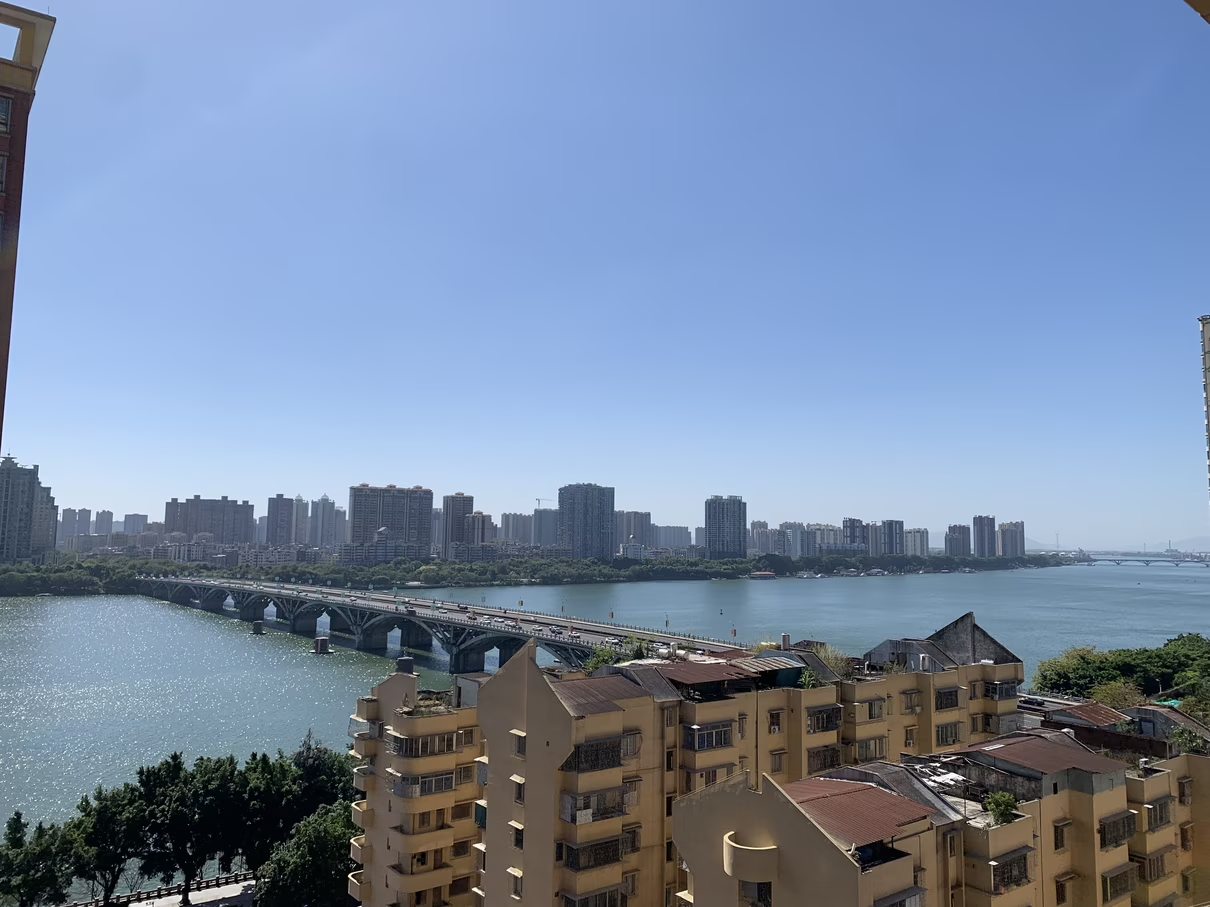
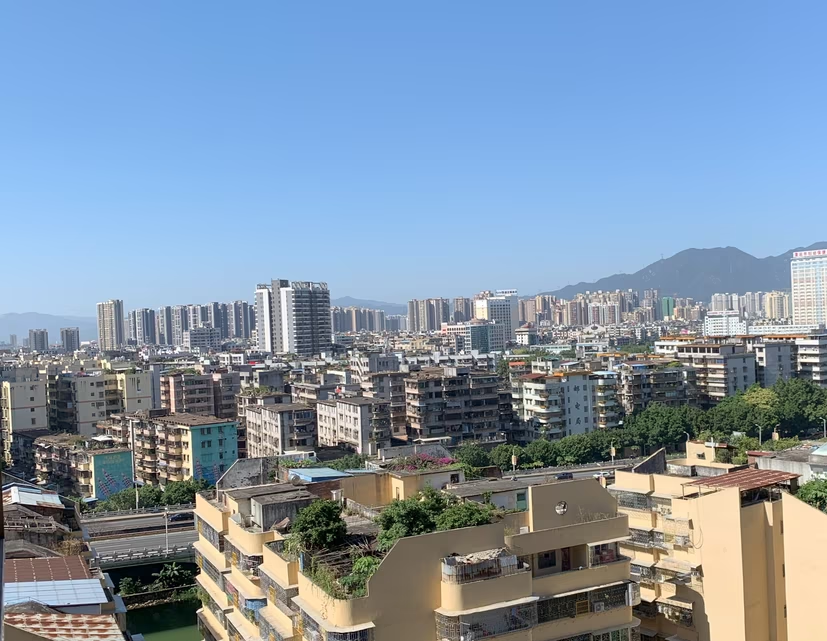
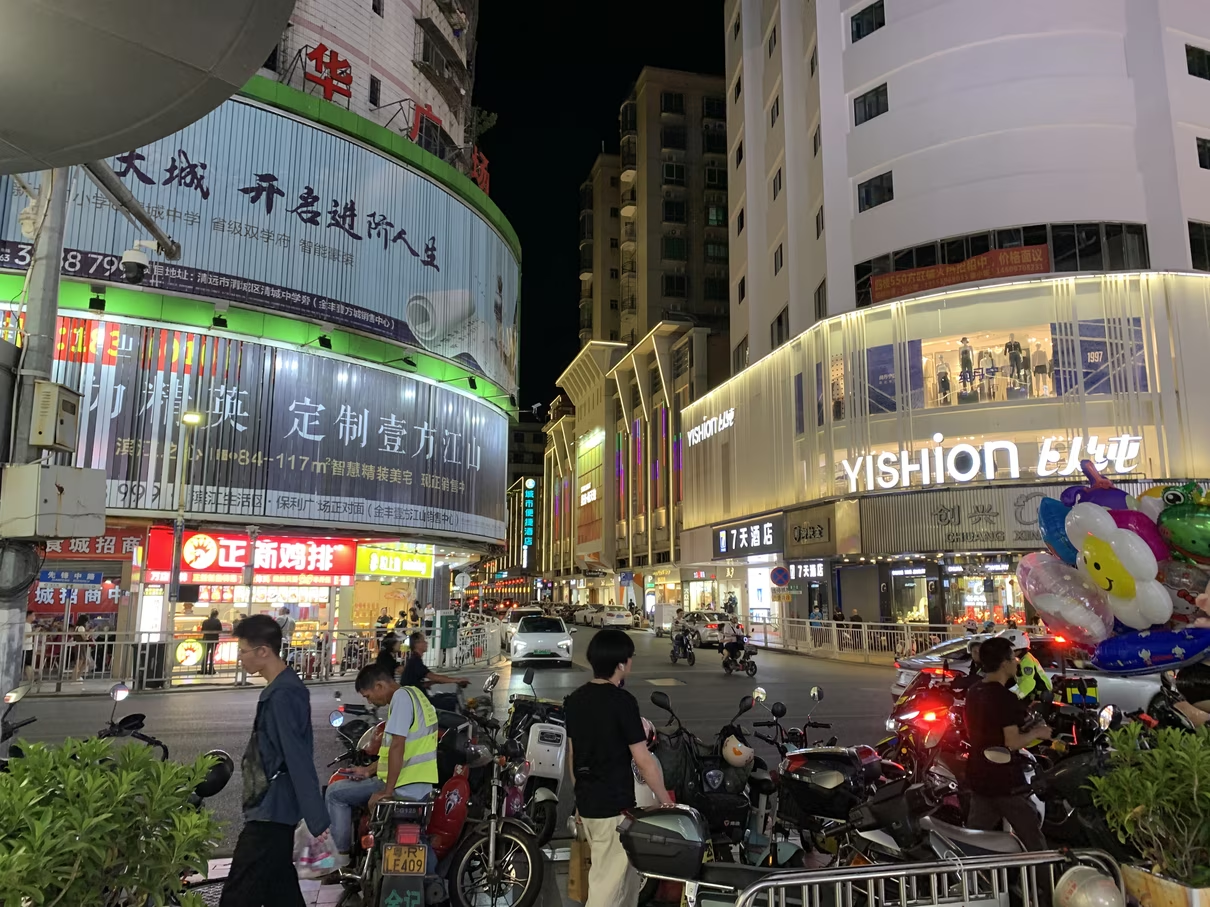
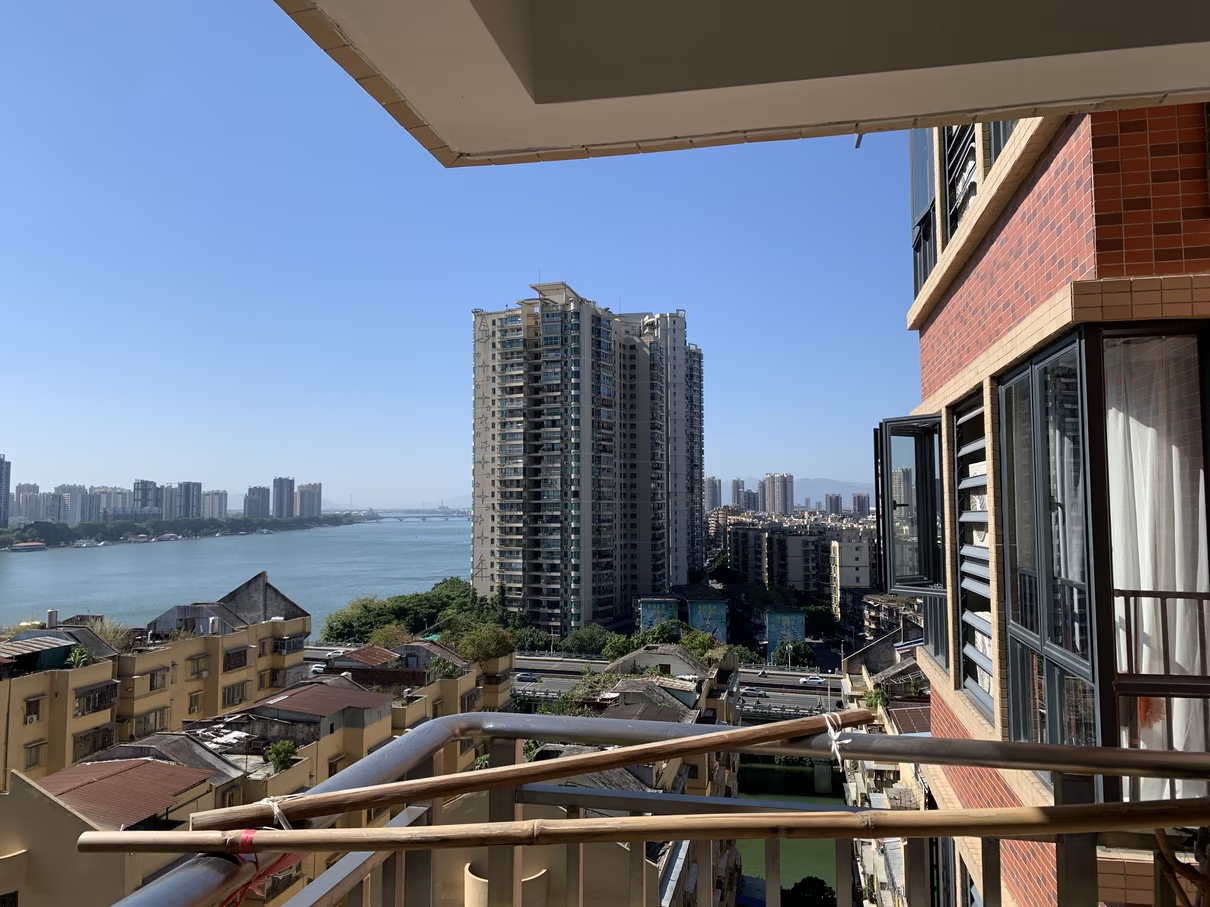
That first day, we walked around the main shopping centers in town. The grocery stores were memorably chaotic - not in a cluttered way like Don Quixote, but wildly crowded. I anticipated it to some degree because when Jiayi and I first met, she explained that she was from a small town in China. Her "small town" has a population of almost 6 million people 😂, but, to be fair, that's relatively small for a country of 1.5 billion.
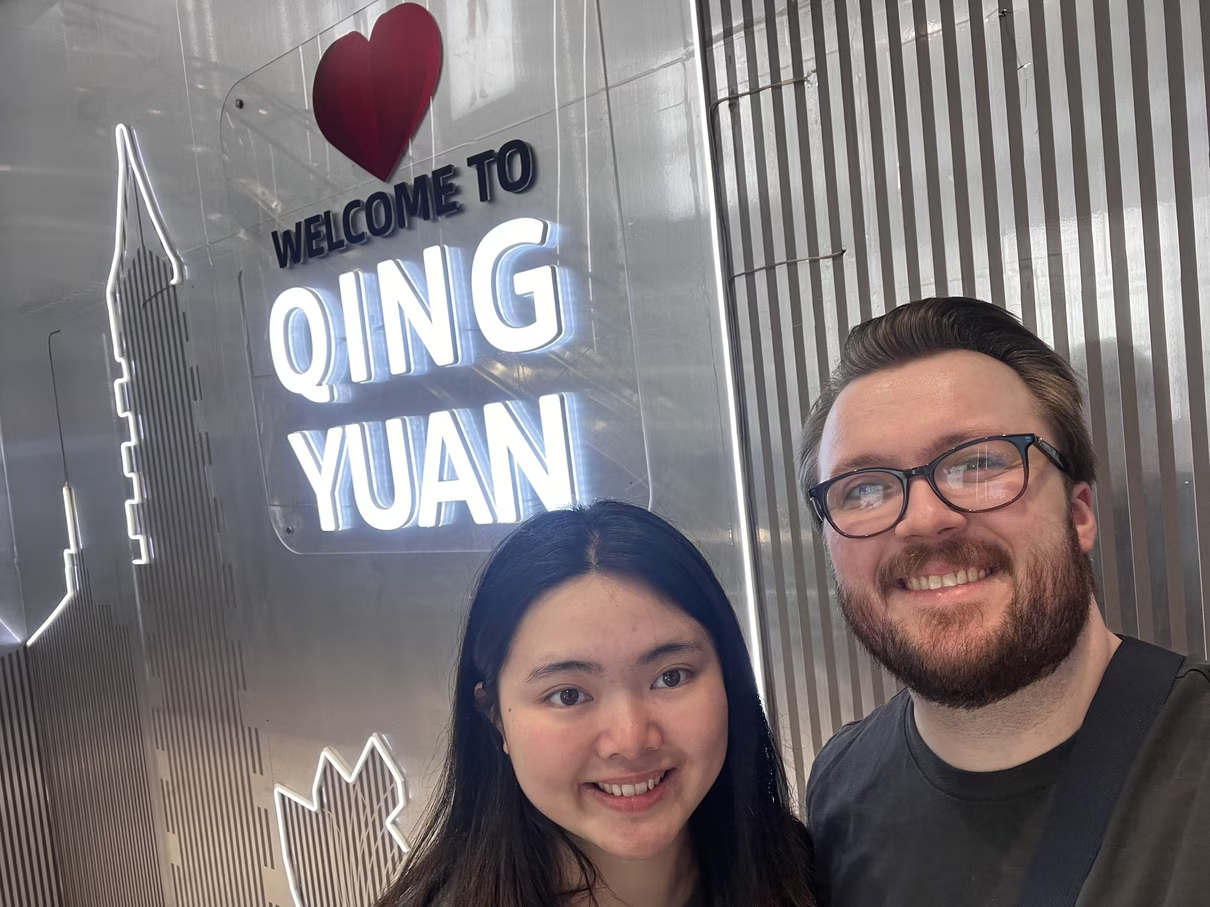
Chinese McDonalds
After picking up supplies and groceries, it was around dinner time. If you've been paying attention, you can probably guess priority number 1 for my first dinner in China 😈. The McDonalds in Qingyuan was quite unique. First, they had an isolated ice cream stand at ground level, and the restaurant was on the second level. By a landslide, it is the cleanest McDonalds I've ever seen, and despite being a smaller store, there were like 20 staff. Some were even leading a hosted birthday party for a little Chinese girl and her friends in which the kids dressed up and play-worked as though they were actual McDonalds employees.
The menu was pretty standard, although they had a few things that were China-specific, such as a hot popcorn chicken pyramid (literally) and delicious breakfast burritos. The burgers were just as good as American McDonalds, possibly better, but the fries were unsalted and bland. Altogether, it was light years better than Australia's "Macca's", which my family and I can hardly eat without getting sick 😷. Here's the restaurant and the items we tried throughout the trip.
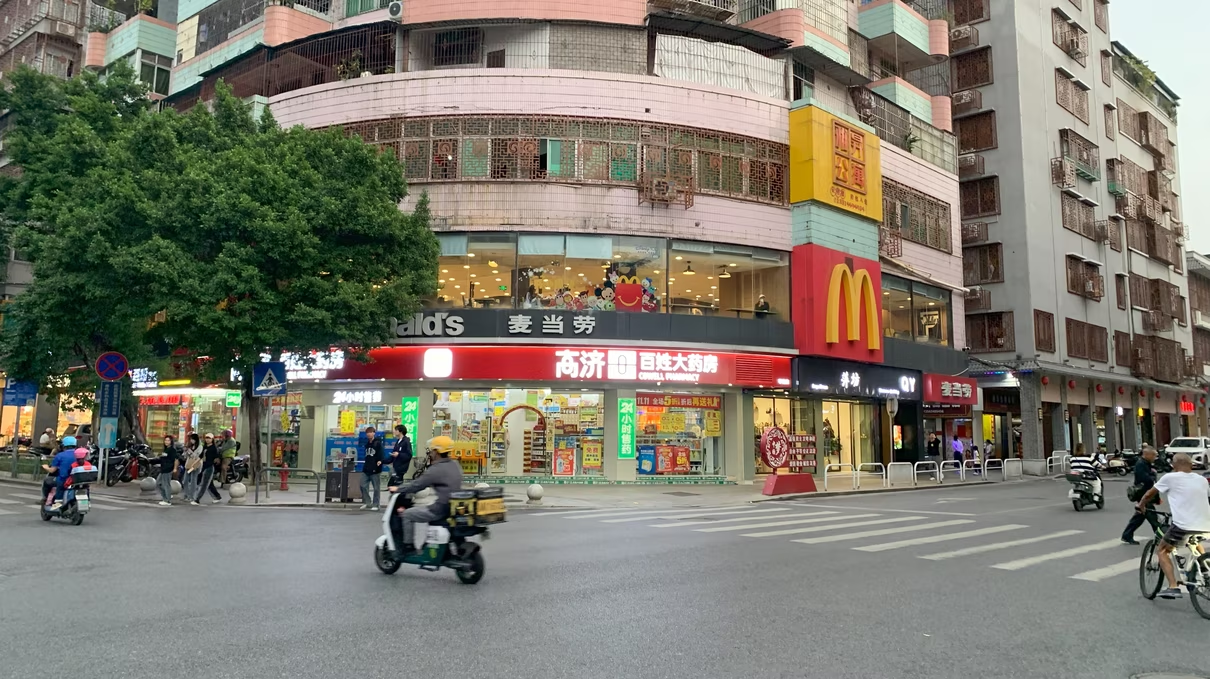
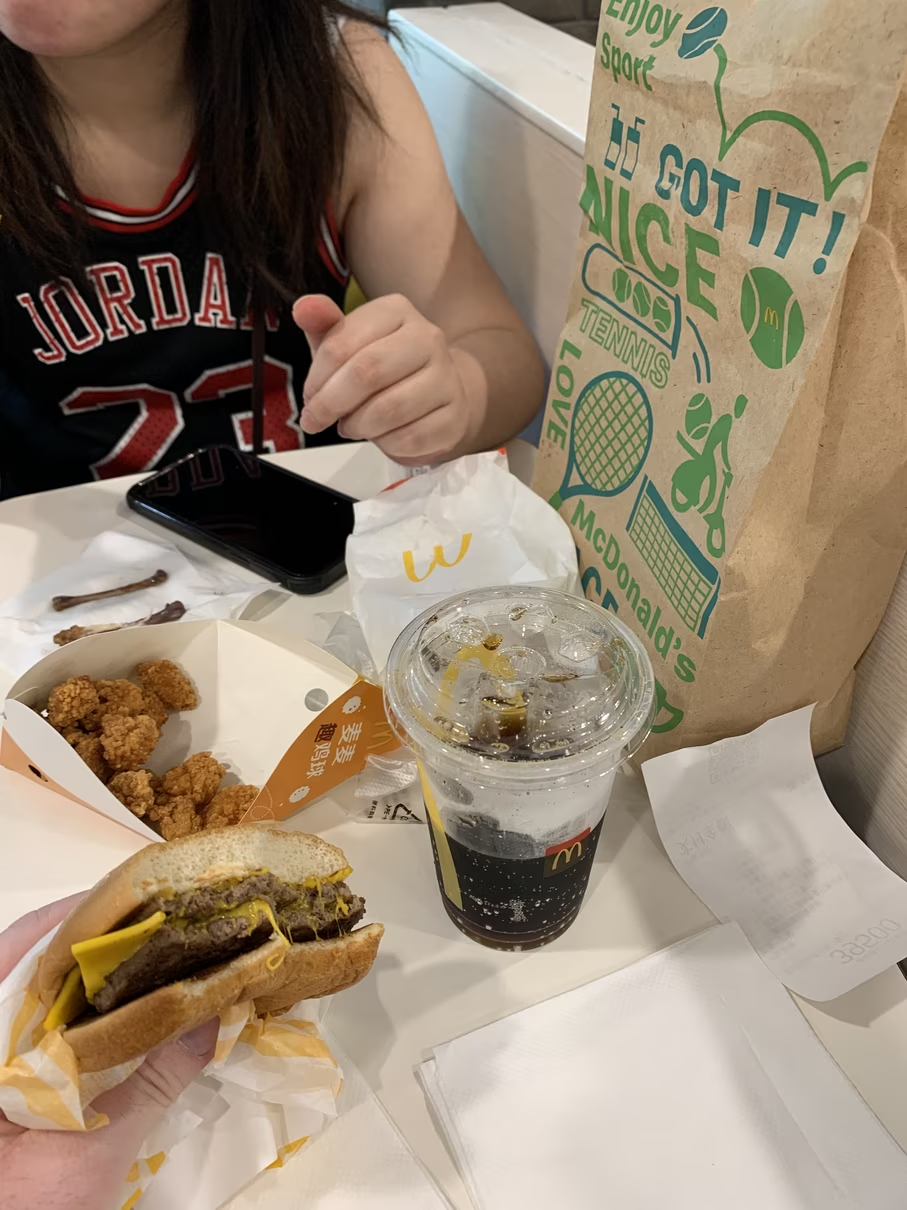
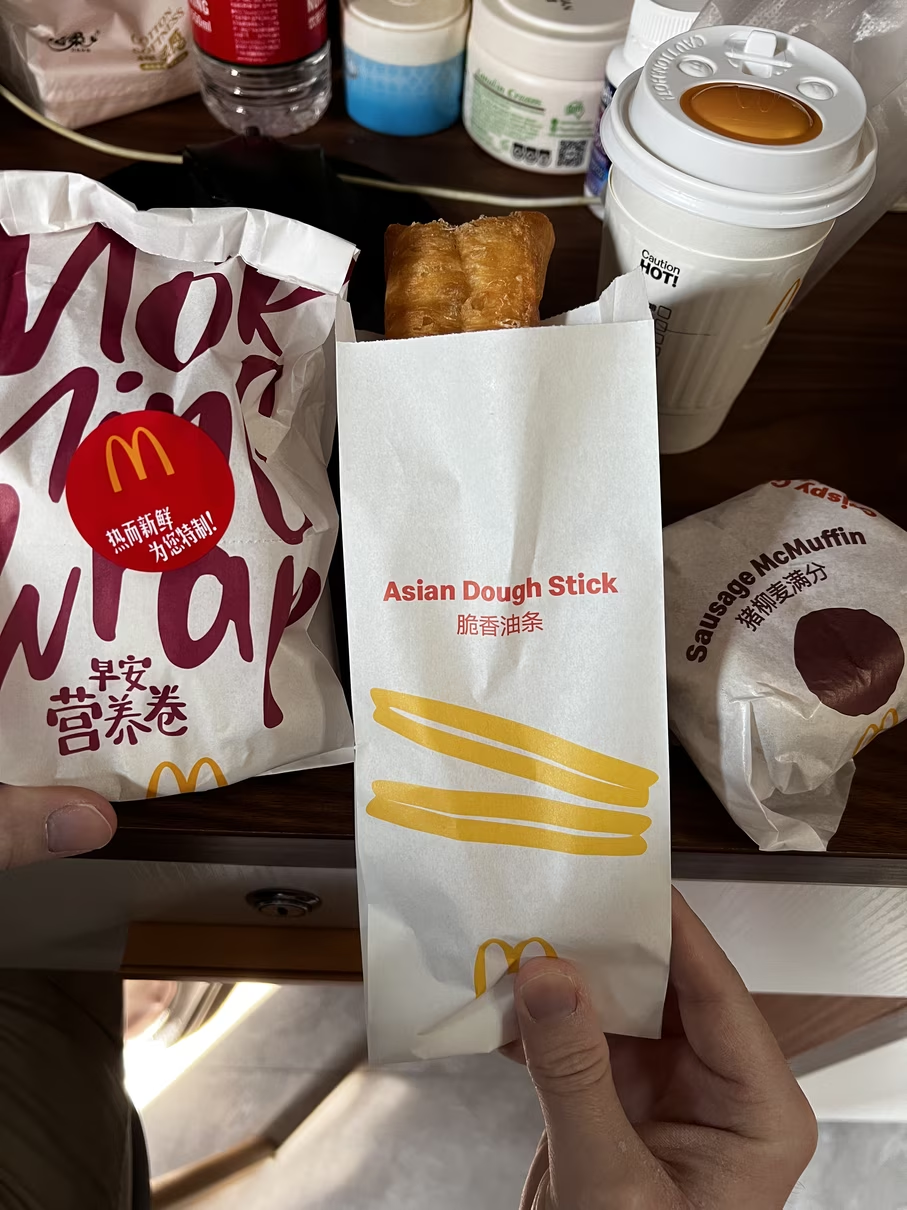
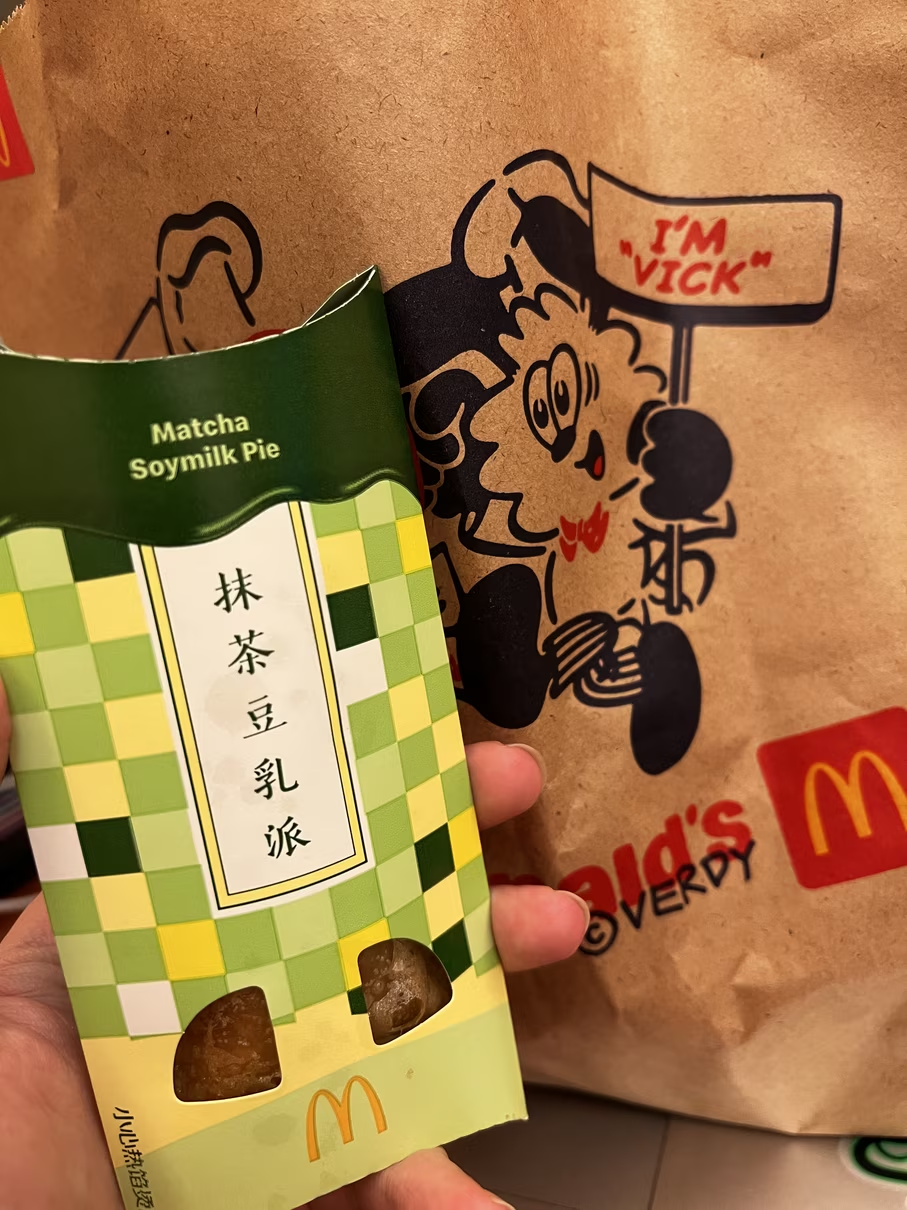
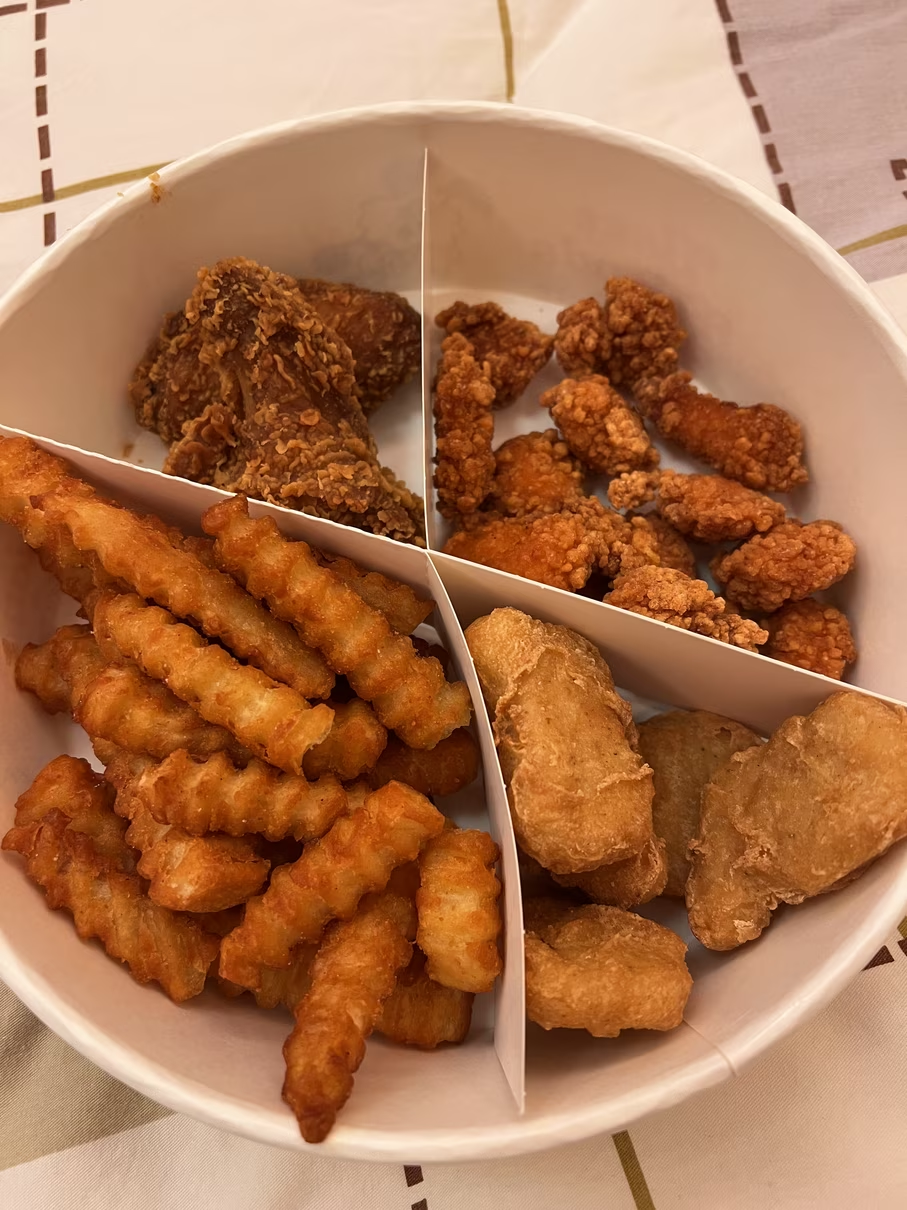
The last thing I'd like to mention on Chinese McDonalds is that they do some pretty wacky promotions. Toward the end of my stay, they ran one comprised of a $15 (USD) meal (outrageously expensive compared to local food prices) and a random bonus cat-carrying bag...? Though I'm not a cat person, I couldn't pass up such an oddity, so here it is in all of its glory:
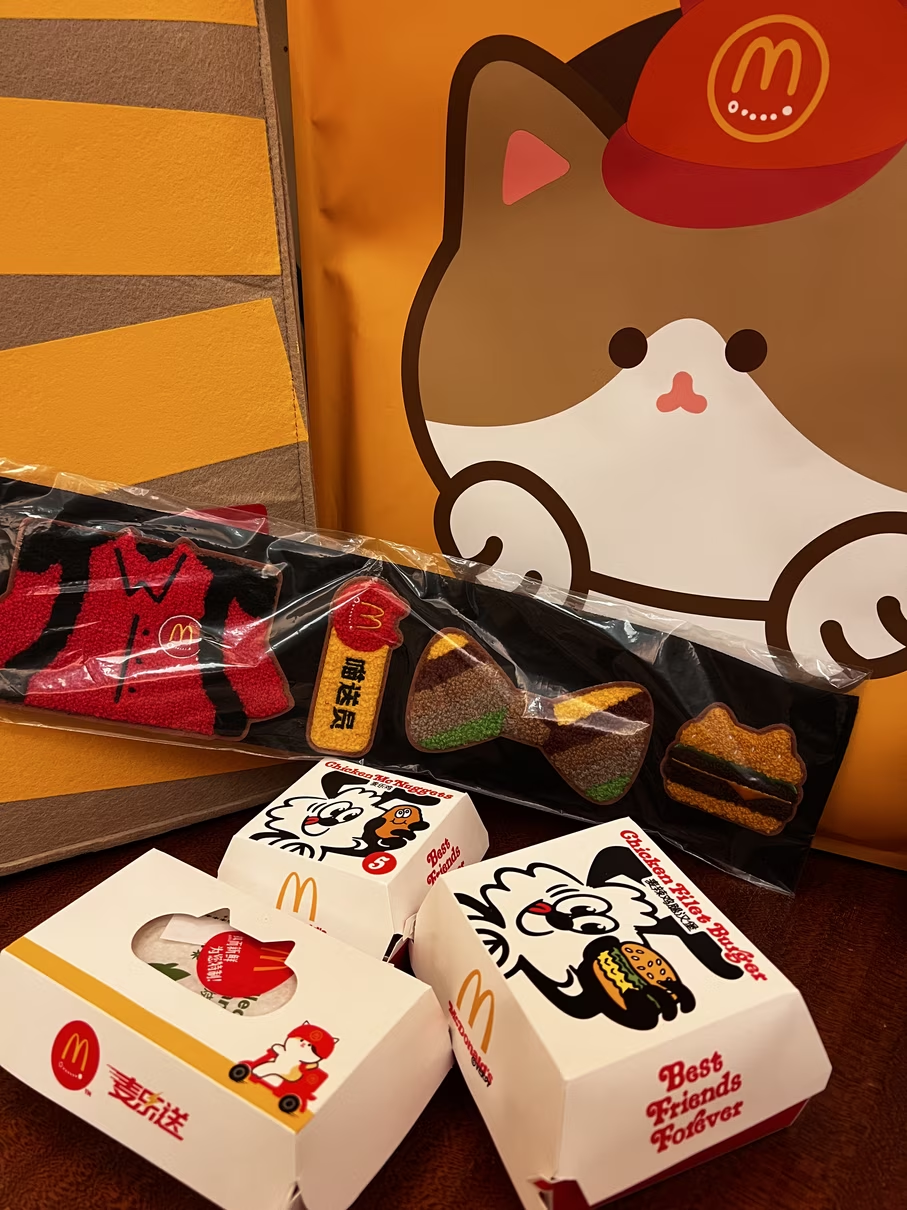
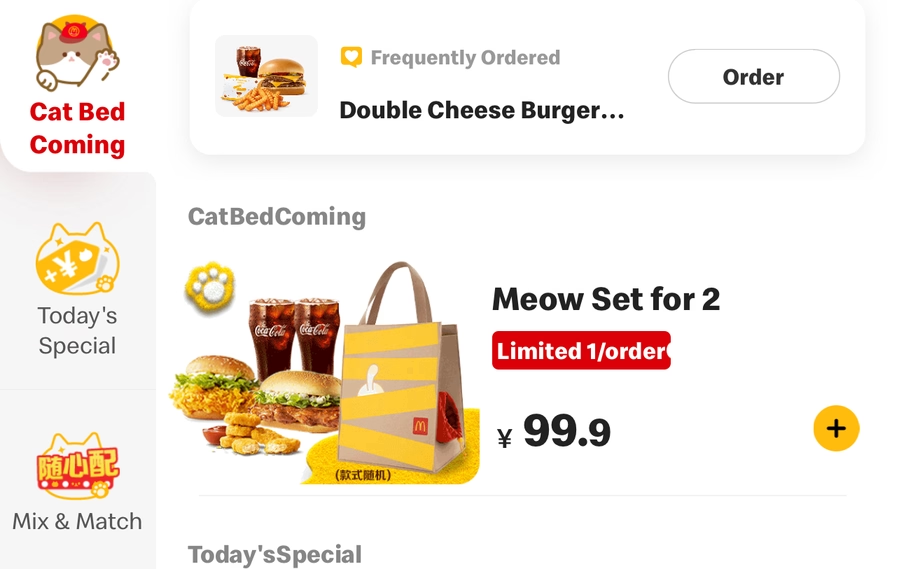
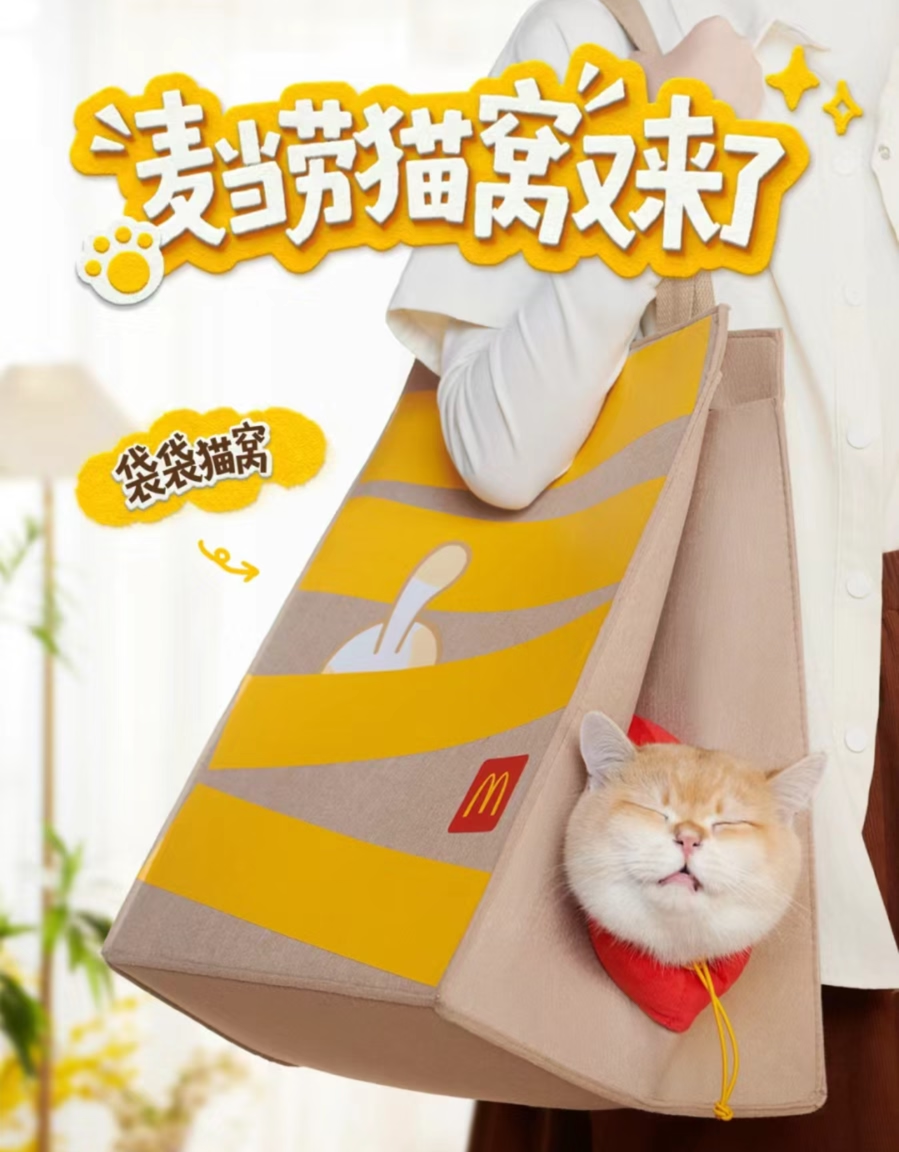

Eyes on the foreigner
As the only white guy many of these folks have likely ever seen in person, I was getting a lot of looks, which I'm used to from rural trips in Japan. Stuff like that never bothers me unless there's a hateful element to it, but that didn't happen in China. People were exceptionally welcoming, and a few shops offered small gifts when we were in Guangzhou as a welcome to the city.
Police Registration
Unless you have family in China like we do, it is highly recommended that you stay in a hotel that will register you with the police. Foreigners are legally required to register at police stations in the cities they stay in to create a record of where visitors are. Larger cities like Shenzhen, Shanghai, Beijing, or Guangzhou have online systems that make this process easier. Otherwise, most foreigner-friendly hotels handle it on your behalf.
Despite having family in China, the process was a drag. Jiayi's town is considered by the government to be rural despite its high population and urbanness. Because of this, I had 3 days to register instead of the usual 24 hours. We tried on the morning of the second day, but the police required the homeowner to present ownership documents. So, we had to return the next day with Jiayi's uncle to complete the process.
Under normal circumstances, they seem flexible and accommodating. However, if not completed at all, one might have their visa canceled to prevent them from returning. The primary annoyance here is that foreigners must re-register in every city they stay in, so a multi-city trip can be cumbersome without hotel registration. You even have to re-register if you return to a city you've already been to 😭.
For the rest of that Wednesday, we explored more of Qingyuan's newer area, which had a large mall and entertainment center that didn't exist when Jiayi first moved away. There, we got to try Chinese Pizza Hut, a much better port than the vile Australian interpretation. Unlike in America, the restaurant was quite fancy. The dining room had warm, intimate lighting, higher-quality seating, and upscale dishes like steak and lobster?! It honestly felt like we were on a date somehow 😂. Genshin Impact, possibly the most popular video game from China at the time, was doing a collaboration with the restaurant, so we got to see a lot of decorations with the characters. We used to play the game daily for most of its first year, and Jiayi used to stream it on Twitch, so it was awesome!
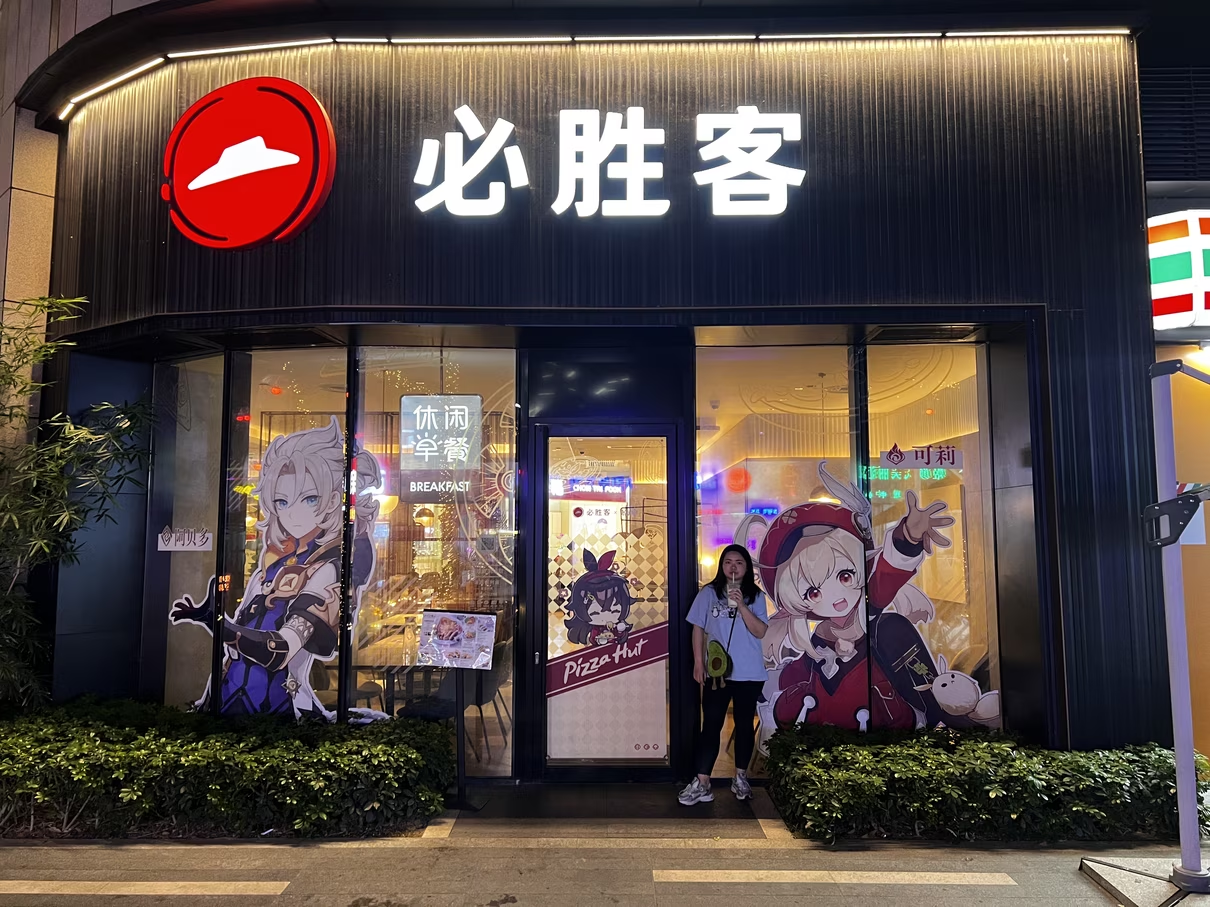
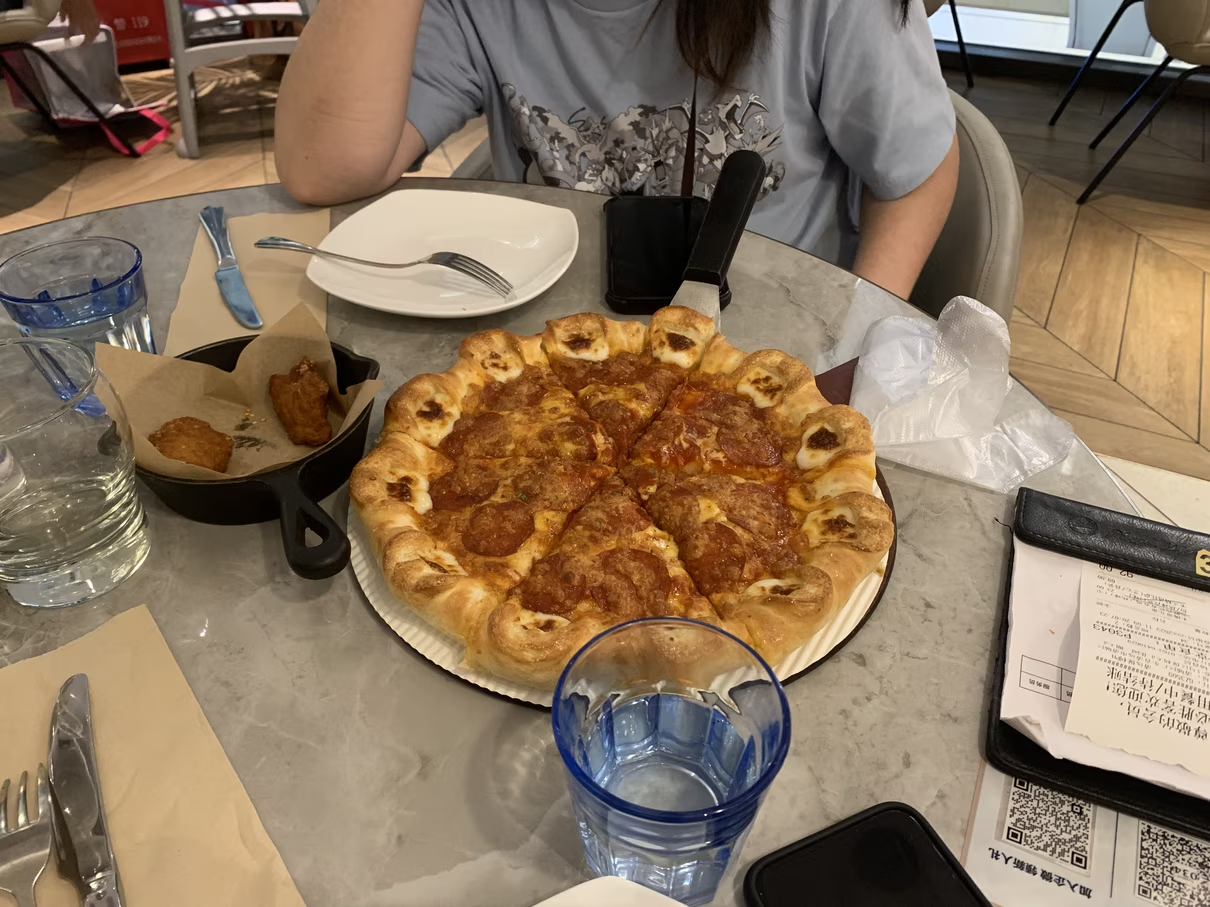
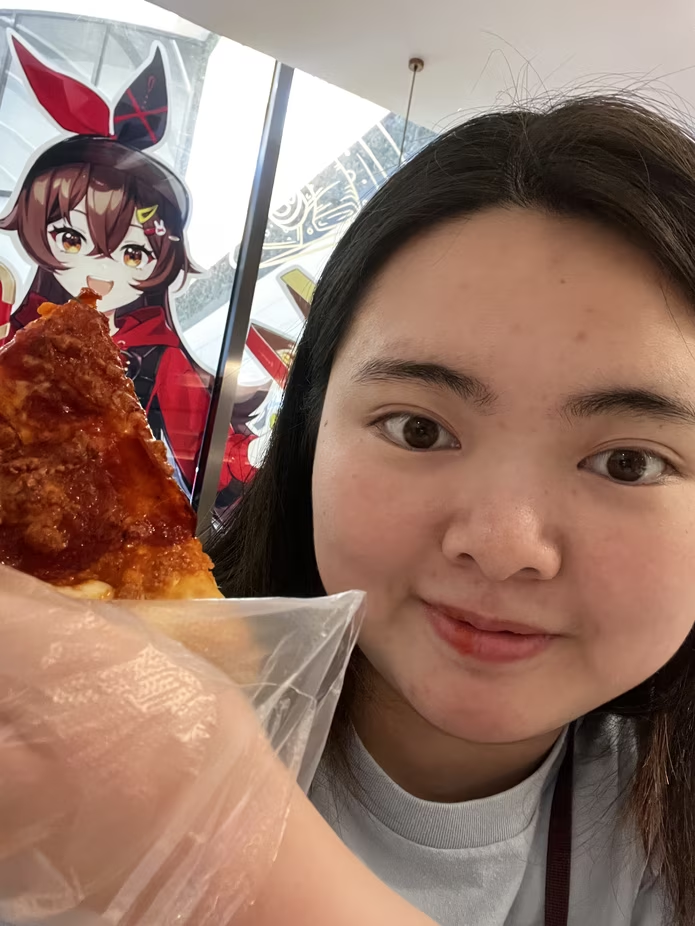
We hadn't done much due to my working and Jiayi helping her dad, leaving only the evenings to explore. Luckily, businesses in China close late, so we tried plenty of restaurants and visited places that Jiayi missed from childhood, such as her favorite snack shop and bookstore.
Midnight ferry on the Bei Jiang River
Later in the week, Jiayi's mother suggested we take a boat ride along the river. I suspect they felt guilty for not wanting to risk contact and tried to suggest things to keep ourselves entertained while distancing. To paint the scene, the riverside buildings were lit with red, animated neon lettering every night to feel cyberpunkish. Knowing this, we anticipated excellent views and were thrilled to book the tickets.
When we arrived, the ferry looked pretty surreal on its own. In terms of culture, it took the decor to another level with traditional wooden elements like red railings, tiled roofing akin to that on a temple, and several indoor tea rooms furnished with the apparently standard, carved furniture. We boarded early to get seats at the front and had the best view as we made a big loop to pass in front of Jiayi's parents' apartment. Several bridges danced with animated neon lights as we sailed beneath them. Altogether, it was a great experience except for inconsiderate folks who kept smoking on the boat, flicking their ash into a strong wind to be swept about unpredictably 😑. The ride probably lasted half an hour, didn't cost much, and was absolutely worth it for the night views of Qingyuan's riverfront!
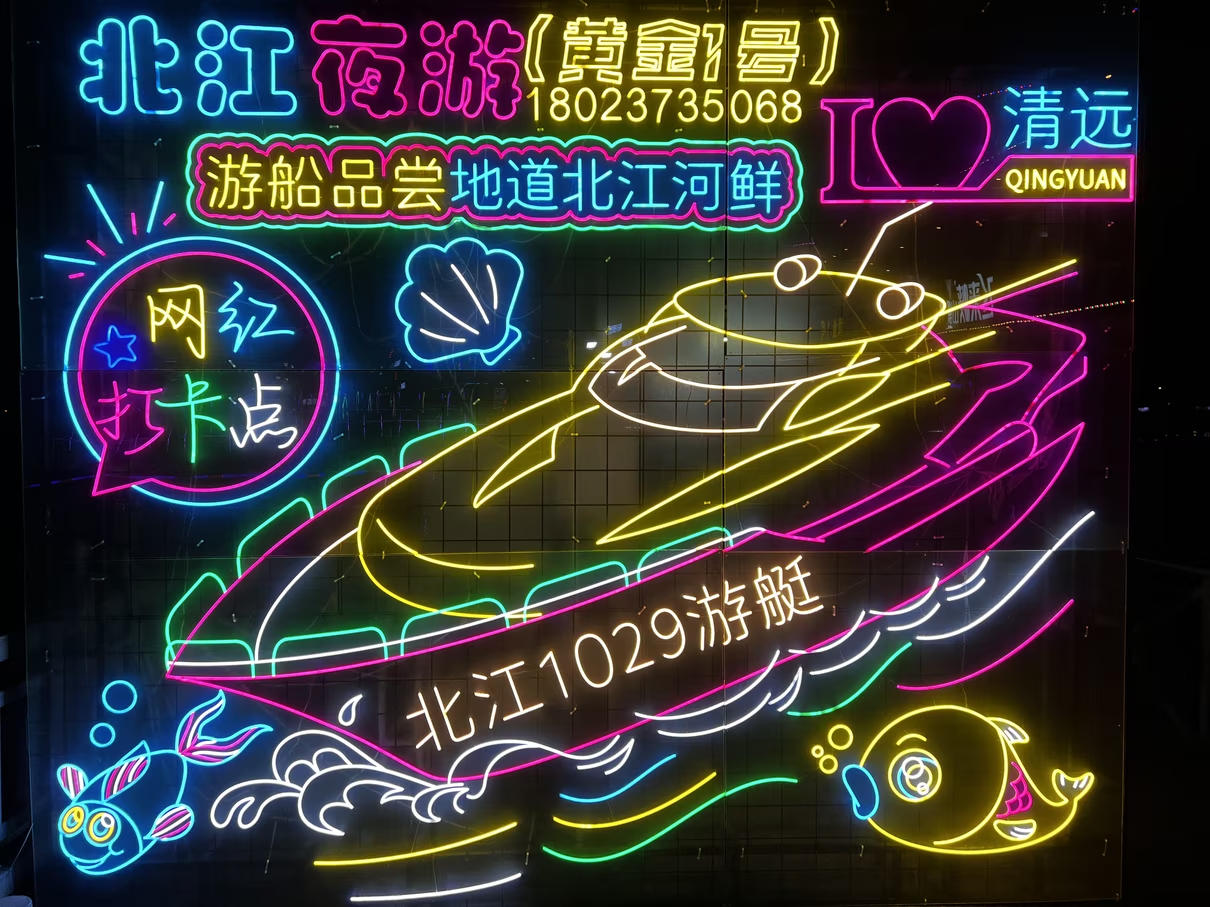
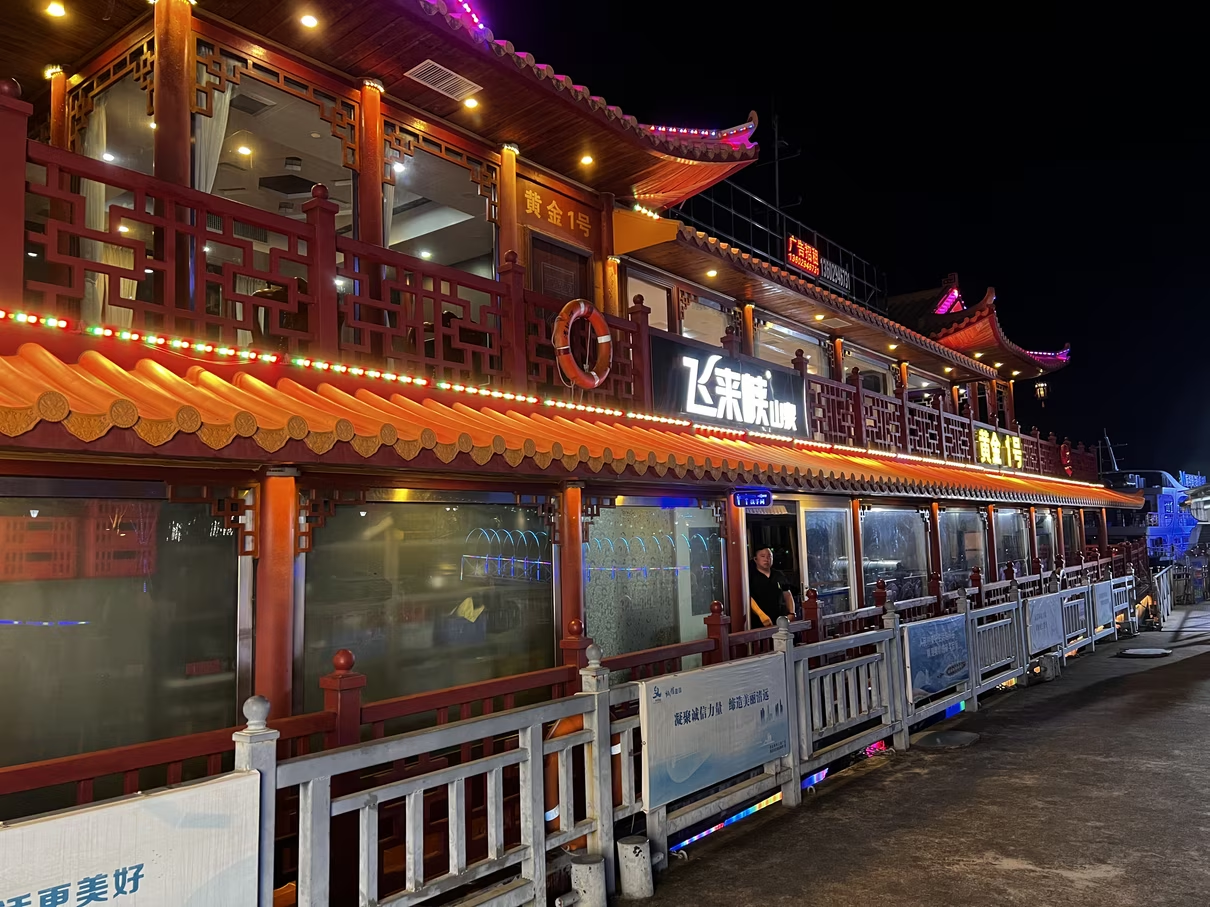
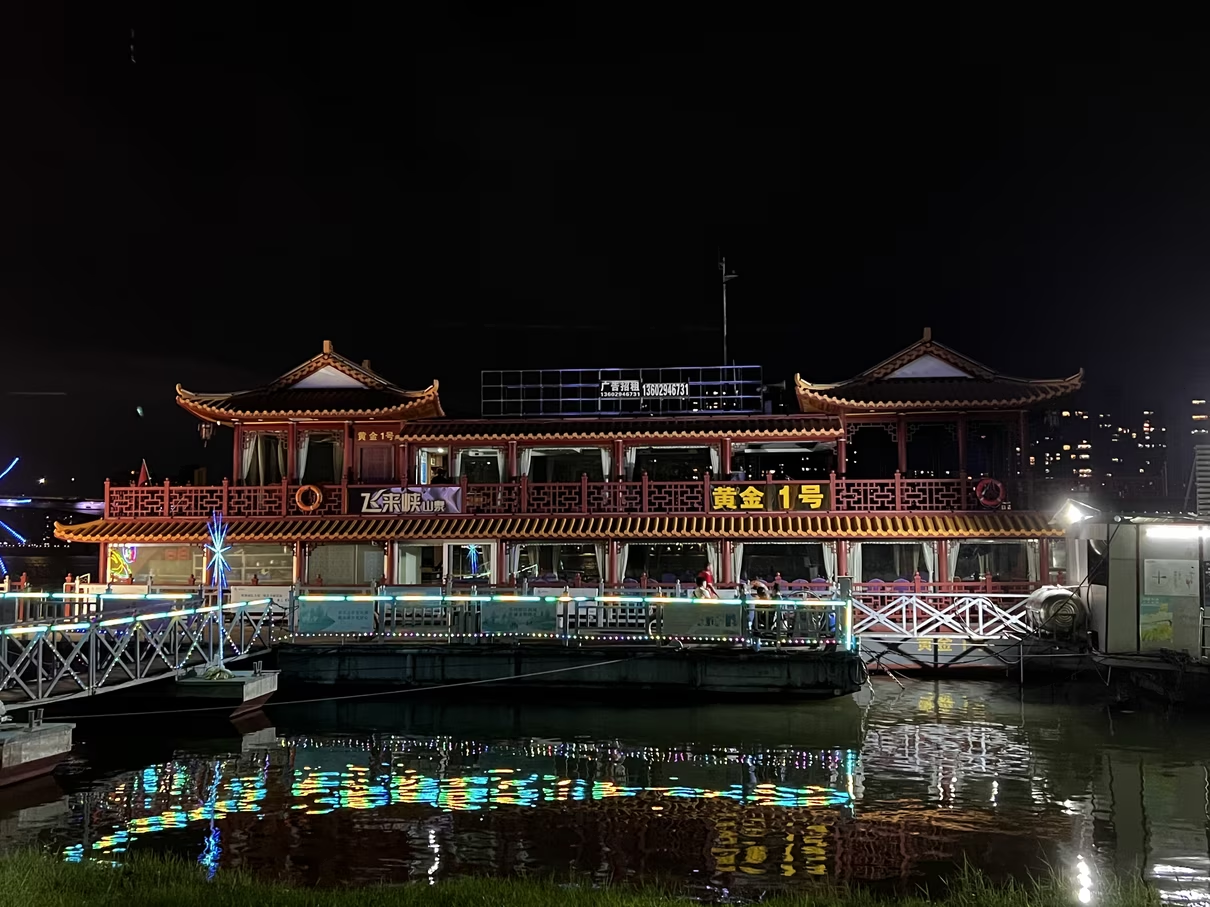
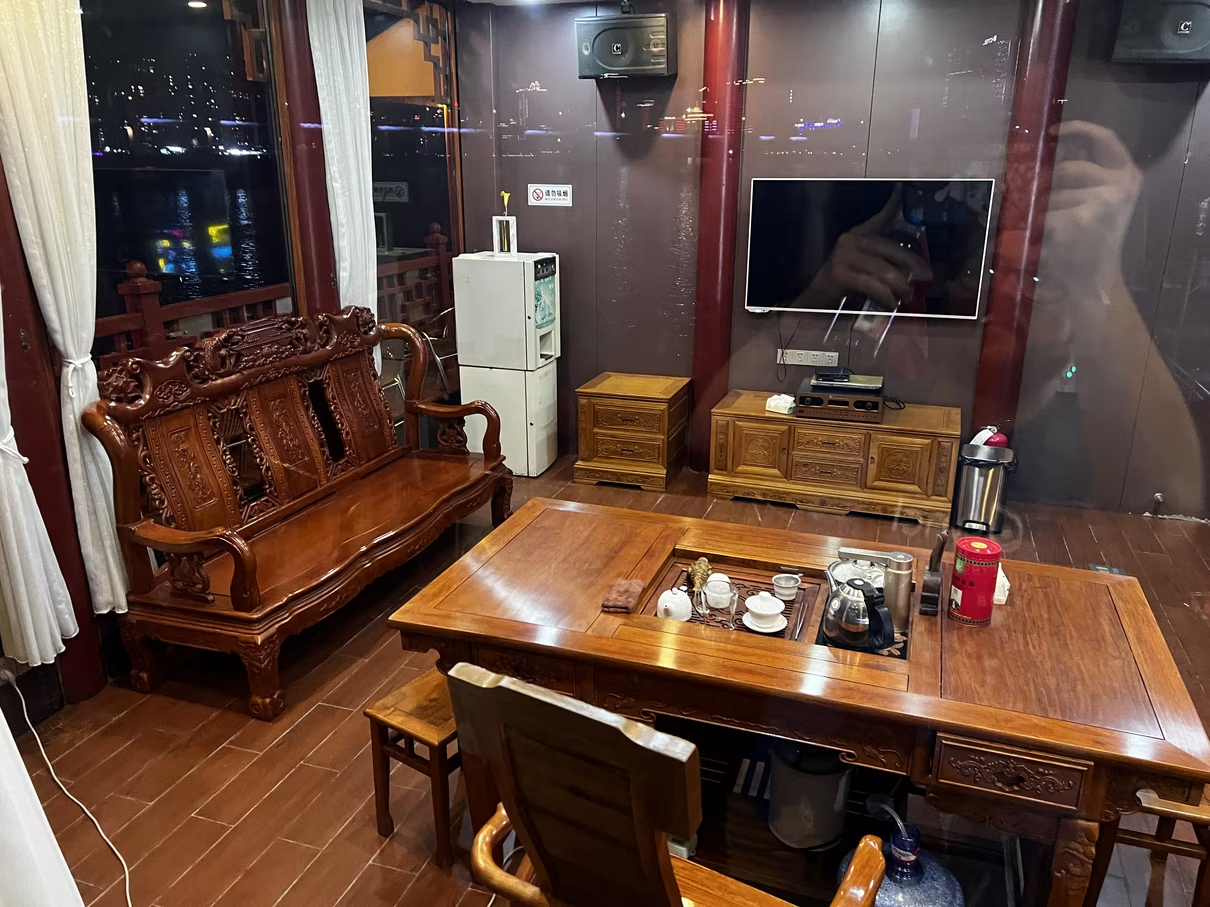
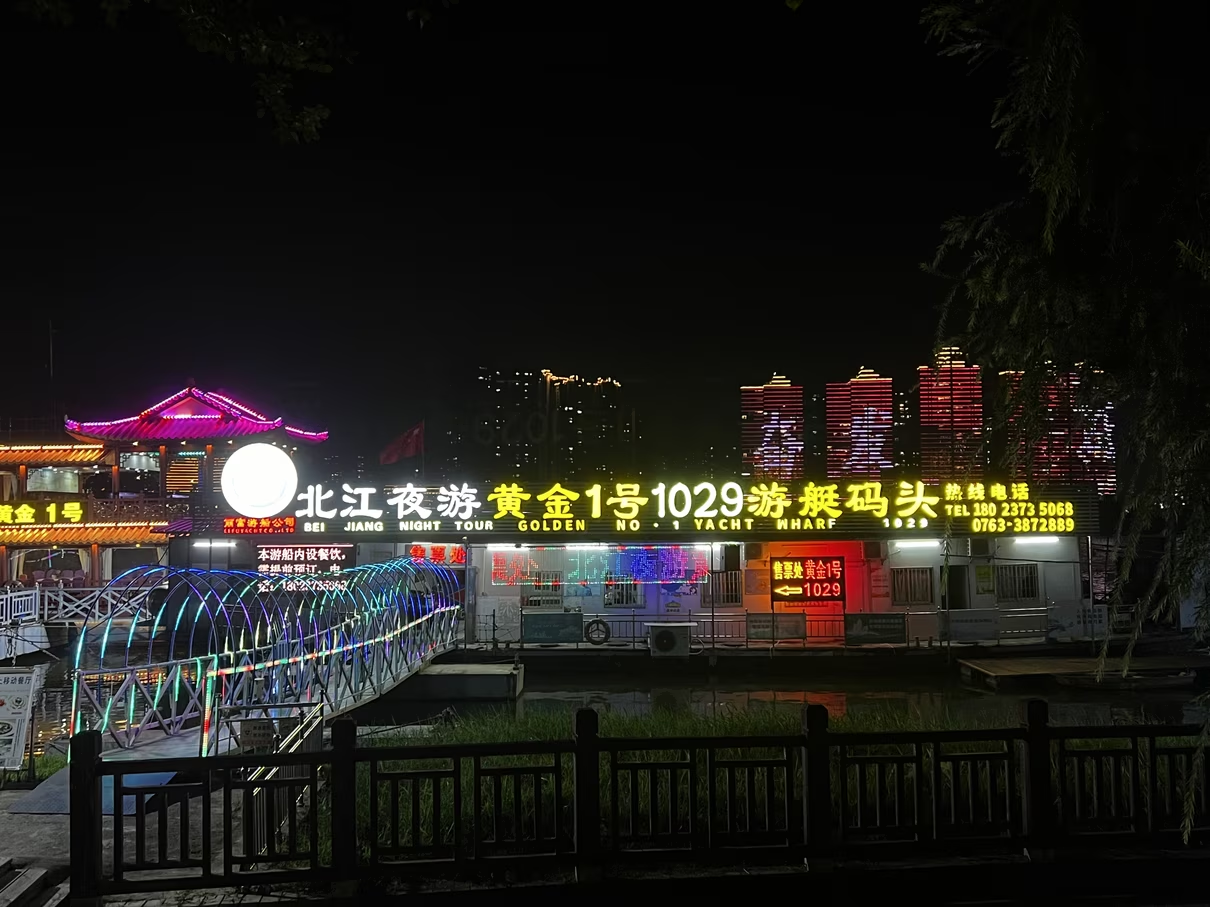
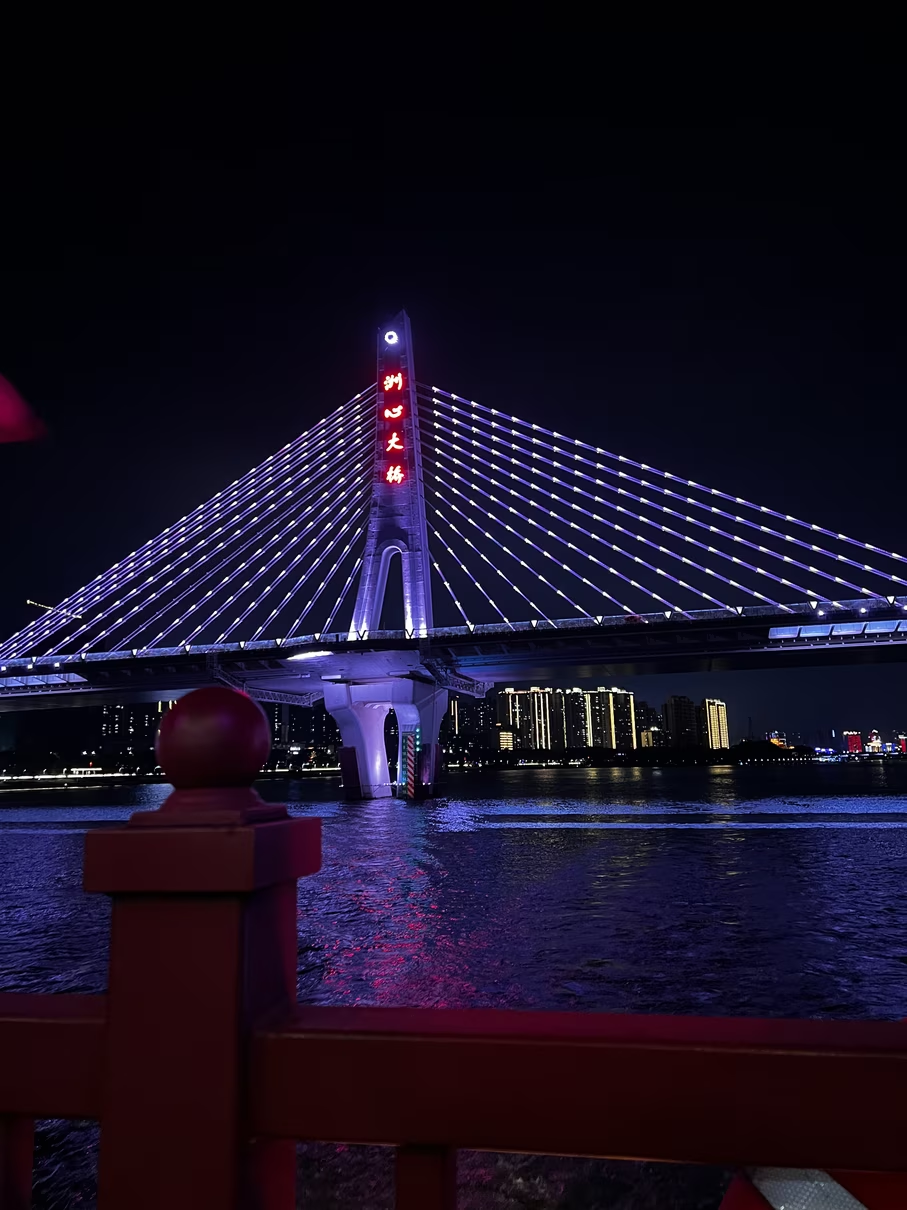
Cheung Fun, our favorite restaurant of the trip
So far, I may have given the impression that I only ate American food. Though that is likely more true of me than most foreign visitors 😅, I had eaten plenty of Chinese food, too! In fact, we had yum cha several times already, a traditional Cantonese breakfast, where dishes are picked from steam carts that are wheeled around the dining hall.
The night of the ferry, Jiayi took me to a place specializing in my favorite Cantonese dish, Cheung Fun (steamed rice noodle rolls). I had only had it alongside other dishes in yum cha, so this being a Cheung Fun-specific restaurant elicited higher expectations. The dish resembles paper because it is a thin sheet of rice noodles wrapping the fillings. Typically, I get it with prawns, scrambled eggs, and chives. However, other variants exist, such as a red rice version, which I'll mention later. Once cooked, it is topped with soy sauce and occasionally a sprinkling of something like sesame seeds, though I prefer just the sauce.
This restaurant served the best Cheung Fun I've ever tried. We had it four more times throughout our stay because it was just that good and right behind Jiayi's father's apartment. Open late, the restaurant had a quality late-night aesthetic with excessive neon signage and towers of steamers pouring steam onto the lamp-lit street. Plus, the best part about the place is that each plate only costs ¥5 - ONLY 80 CENTS!!! Check out the vibe and our food:
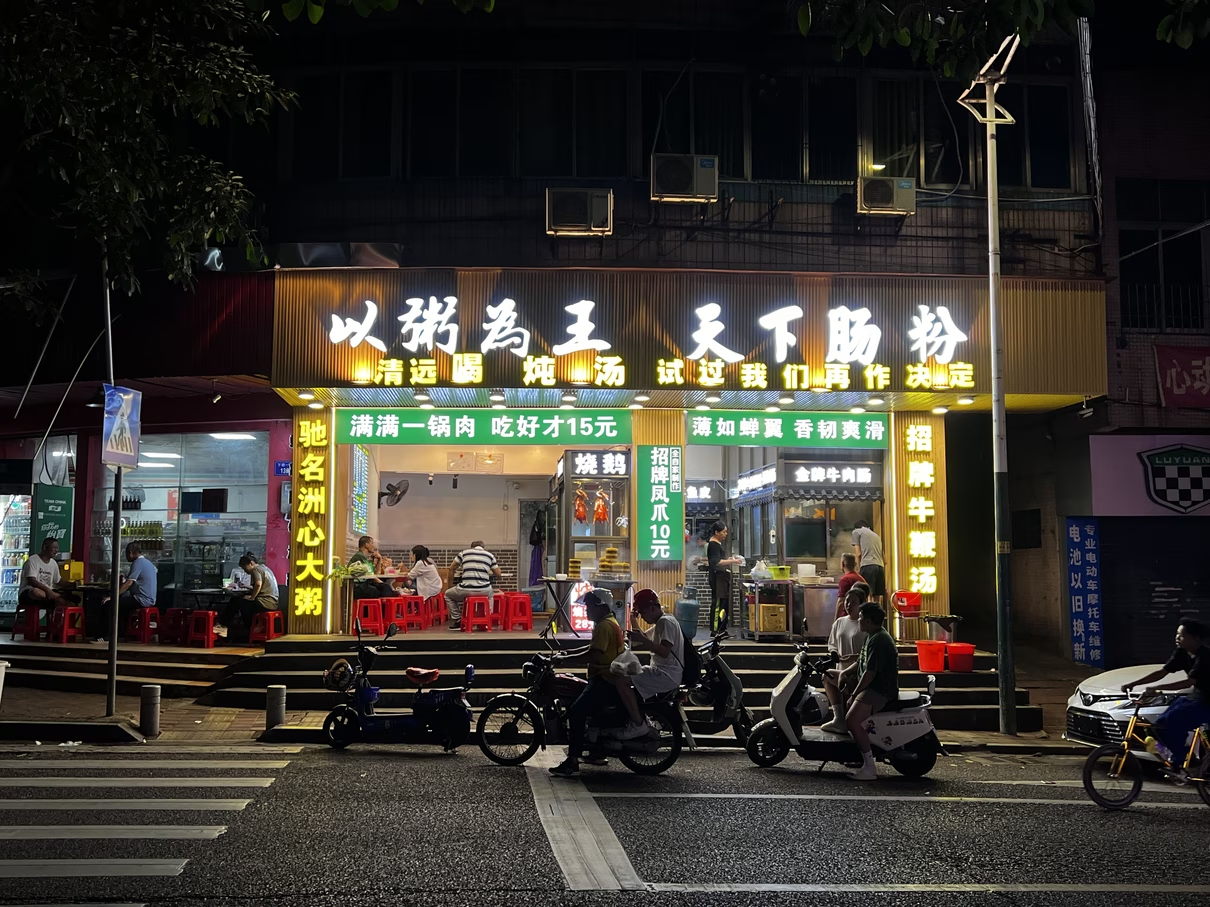
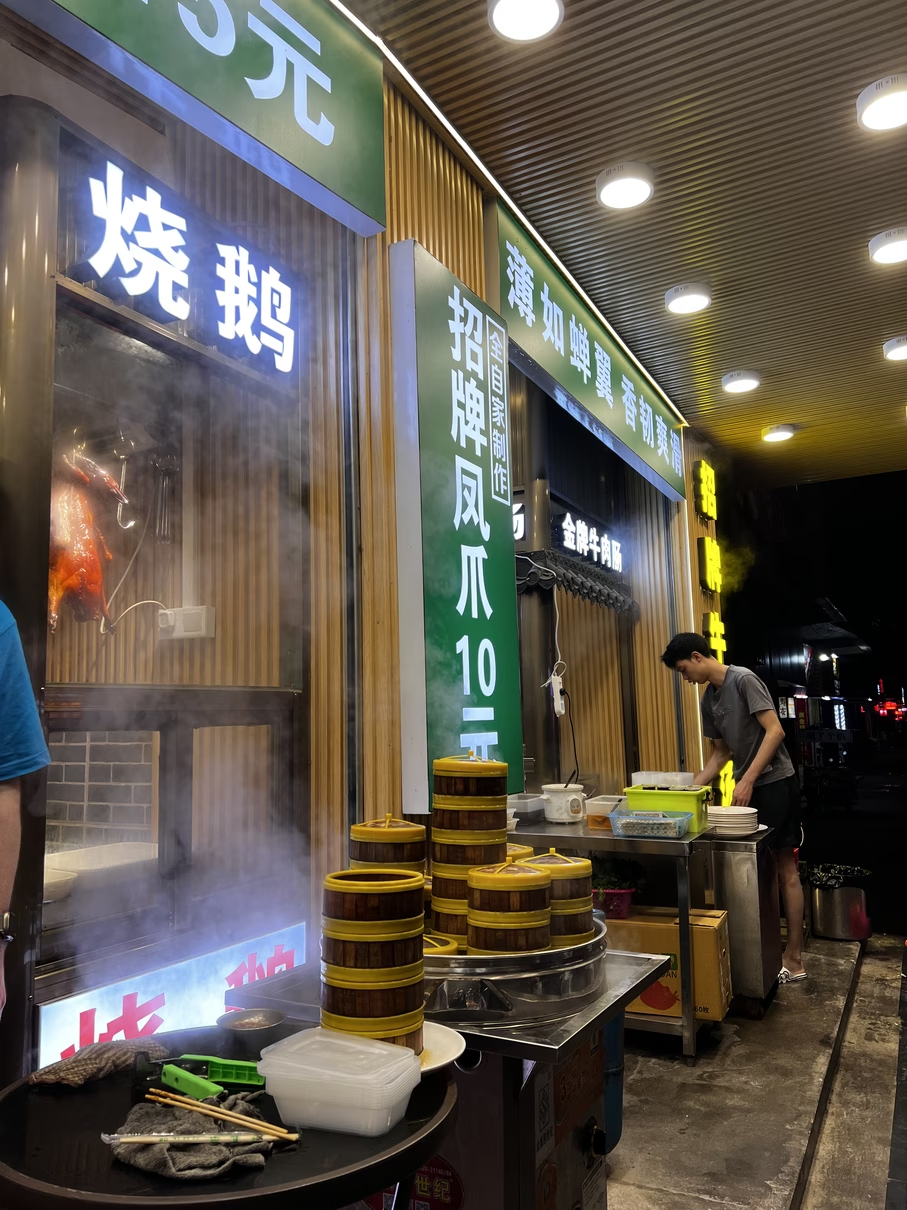
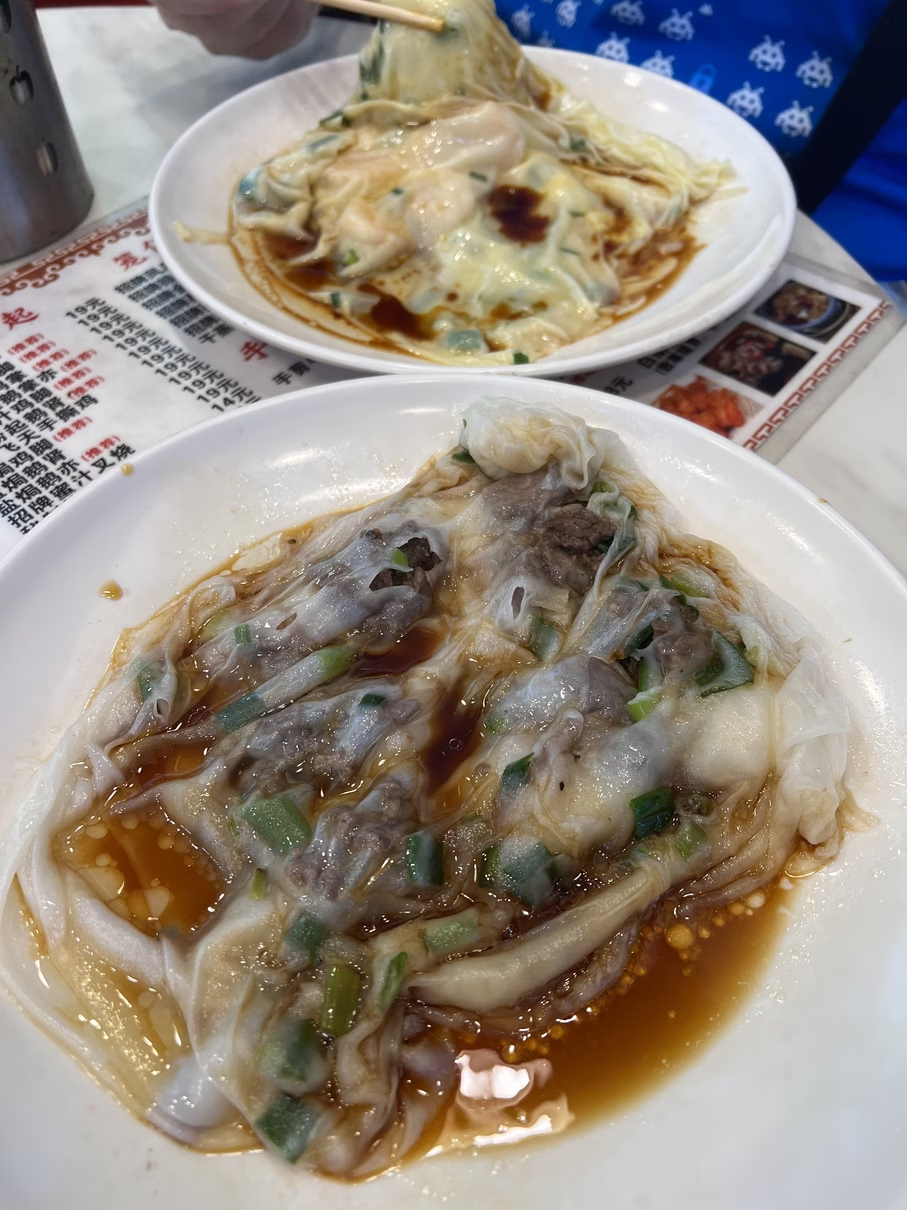
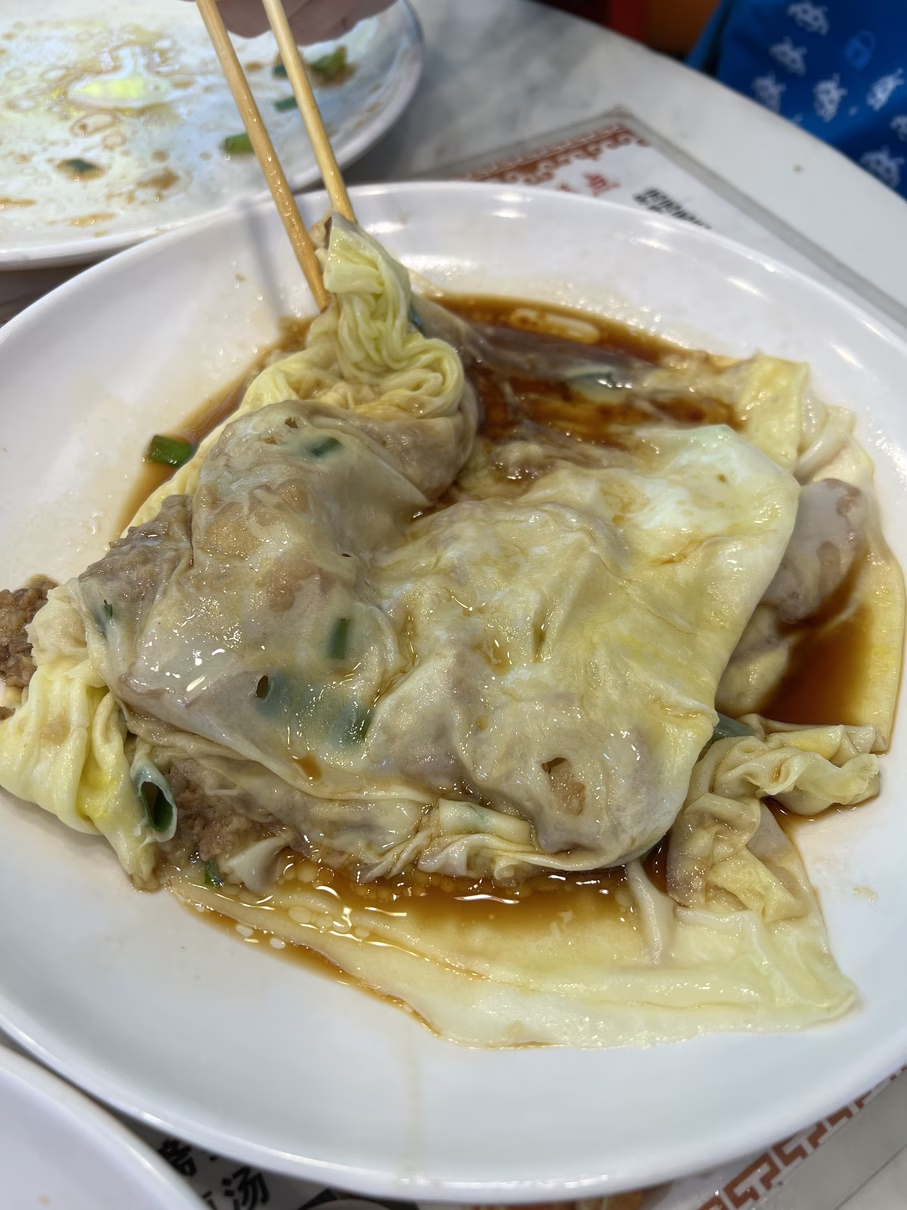
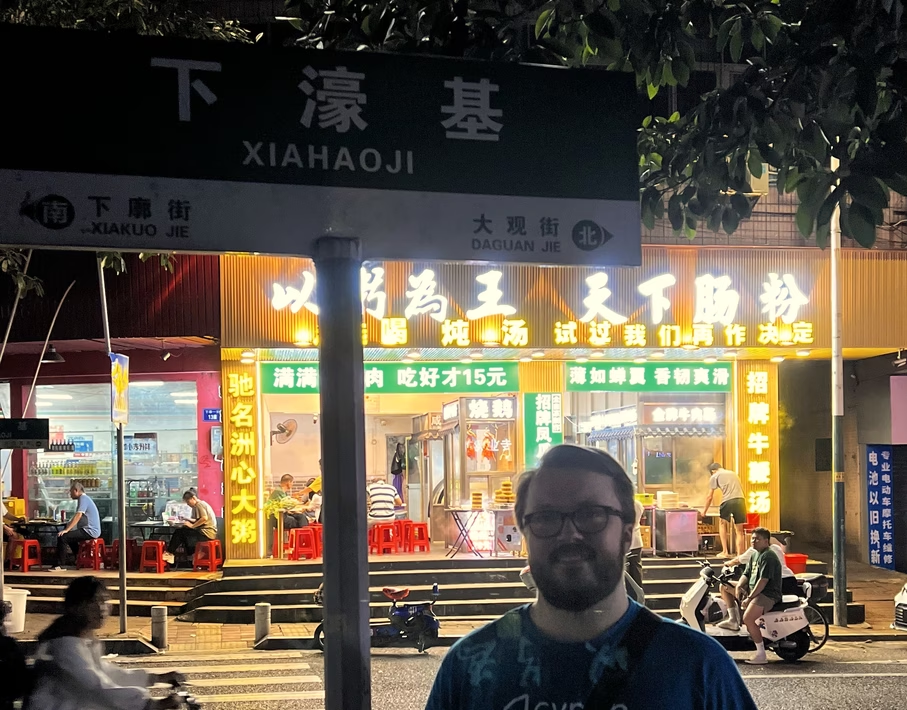
Rounding up our first week
Ultimately, we had a fun first week in China. Perhaps the only drawbacks were the heat, humidity, and lack of family time. The taxis were cheap, the local foods like yum cha were delicious, and the people showed me a lot of hospitality even though Jiayi had to translate everything for me, which I could tell she was feeling more tedious by the day 😅.
Because of getting COVID, we didn't spend any time around her mom and dad. They wanted to make sure I was completely over it to keep her father safe while immunocompromised with so many potential comorbidities. To help her father, Jiayi made food and medicine deliveries while wearing a mask. She couldn't go inside the apartment or risk any contact, unfortunately.
Yum cha with friends in Guangzhou
A complication of my father-in-law's illness was his having low plasma and other blood-related issues that required several transfusions. In China, such things are treated as a trade by which family members of the sick individual donate blood to help others in exchange for the blood their family is receiving. The vast population's demand pressure on hospitals, coupled with the lack of charitable donations, results in mass shortages. Given that, family and friends donated for her father while we were still in Australia. Her brother was the first to donate. When Jiayi and her family posted about the situation to ask for help on Chinese social media, several friends offered to donate, too.
Two of our kind benefactors were Jiayi's high school classmates living in Guangzhou. We had planned to visit there at least twice, so we invited them to yum cha as a thank-you. We decided to meet Saturday morning and booked tickets to ride the bullet train into the city. It was awesome and hit about 300 km/h, cutting the travel time from 90 minutes by car to only 20 minutes!
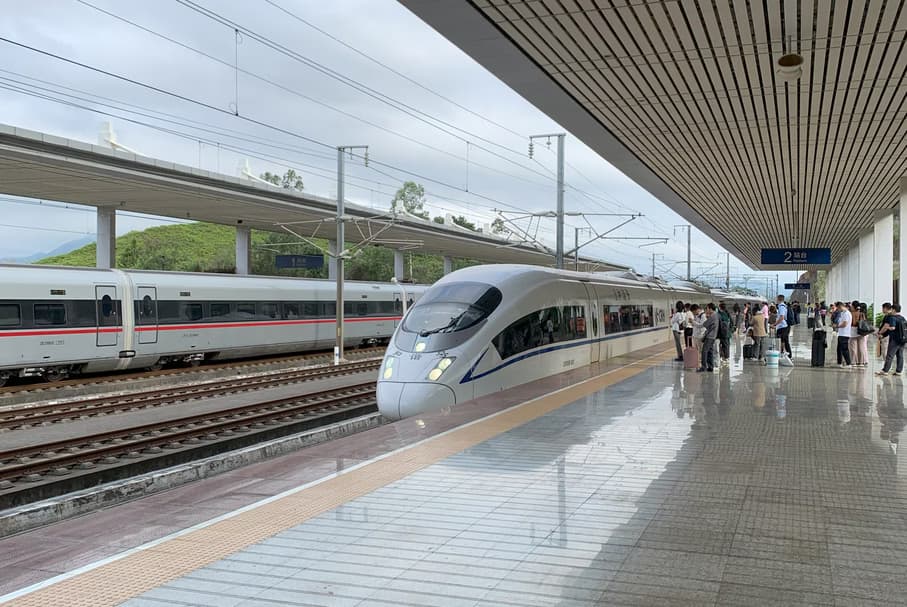
That morning, the bullet train dropped us off at the largest station, Guangzhou South. The crowds were huge, and the place was maze-like, even for Jiayi. Unlike the US, every country I've lived in or traveled to has well-connected public transport. We knew the metro could take us anywhere in the city, but the number of lines proved tricky to navigate. Machines for ticketing required these archaic, plastic tokens that we had to carry around and keep up with since we didn't have metro cards like the locals. We got lost a bit and took the wrong line once, but we finally arrived at our destination near the city center.
Guangzhou Jiu Jia
For years, I had wanted to try a famous restaurant in Guangzhou called Guangzhou Jiu Jia, a yum cha place. Yum cha is the staple cuisine of Guangdong province and serves as the most traditional breakfast tea meal for Cantonese. I became aware of this place via the frozen goods they sold internationally, which Jiayi introduced me to when we arrived in Australia. My favorite items were the liu sha bao (salted custard bun) and he tao bao (walnut buns) cooked via steamer, an appliance in every Cantonese kitchen that most Americans are unfamiliar with. Once Jiayi made them for me and realized how much I loved them, she shared that the brand was a well-known, real-life restaurant in her province. Ever since, I had wanted to go there and try the authentic, fresh versions of their frozen items, and it was finally my chance!
We exited the station to a dull grey sky, and the buildings stood so tall that they disappeared into the clouds. Avoiding the misting rain, we ducked under trees to establish our whereabouts and direction on the map, then moved quickly to avoid getting wet, hoping we were headed the right way. Luckily, we made it, went in to reserve a table, and Jiayi's friends arrived soon after.
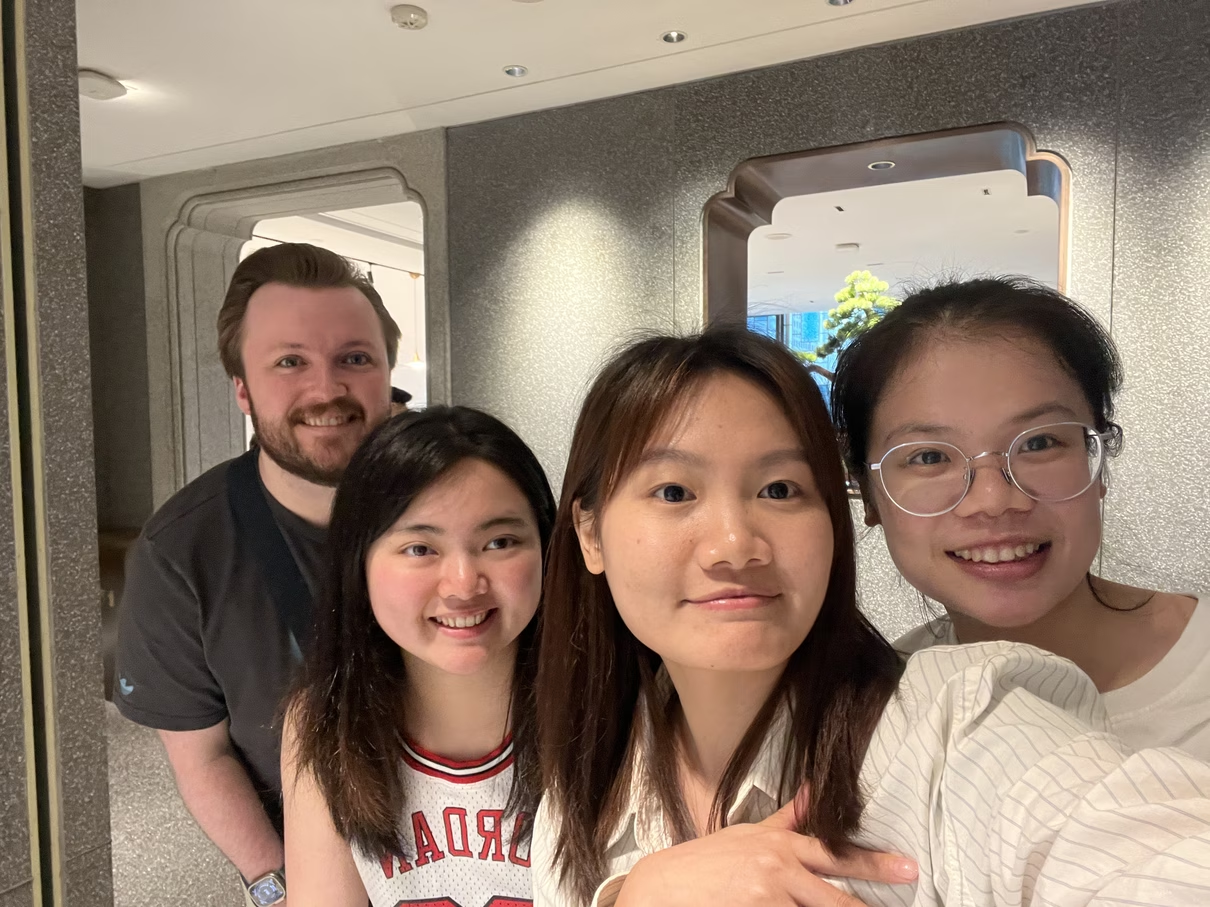
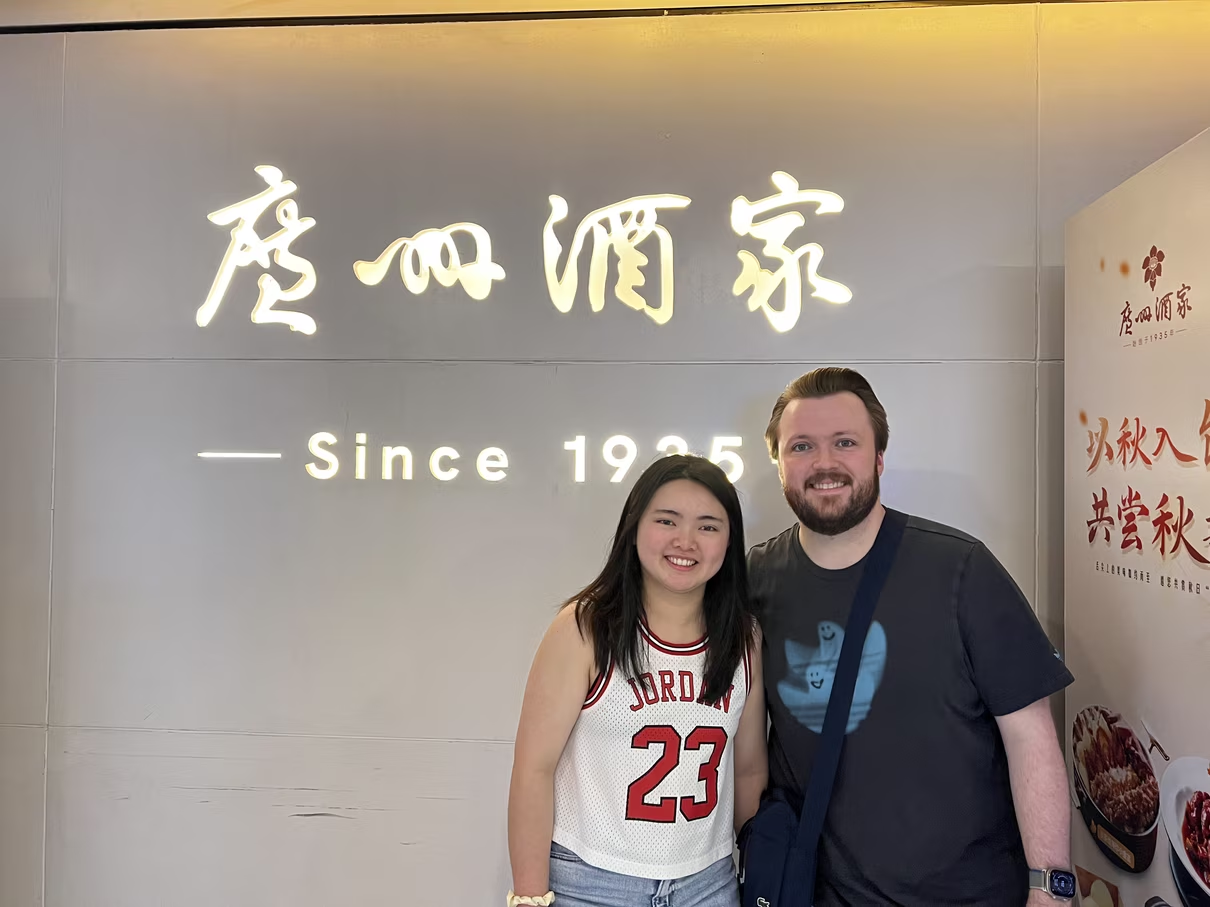
The restaurant held a fancier vibe. Taste-wise, it was the best yum cha I've ever had by an insane margin. The highlight for me was the selection of teas and a unique Cheung Fun variant I foreshadowed previously that was made with red rice noodles wrapped around a crispy prawn roll. We ordered three of them!
Notably, the service was less traditional without the food carts. Instead, everything was made to order, and they left an iPad on the table for us to request more at our convenience. Everything is usually served in small portions, so placing multiple orders is normal. I took plenty of pictures, so here are some of the many items we tried:
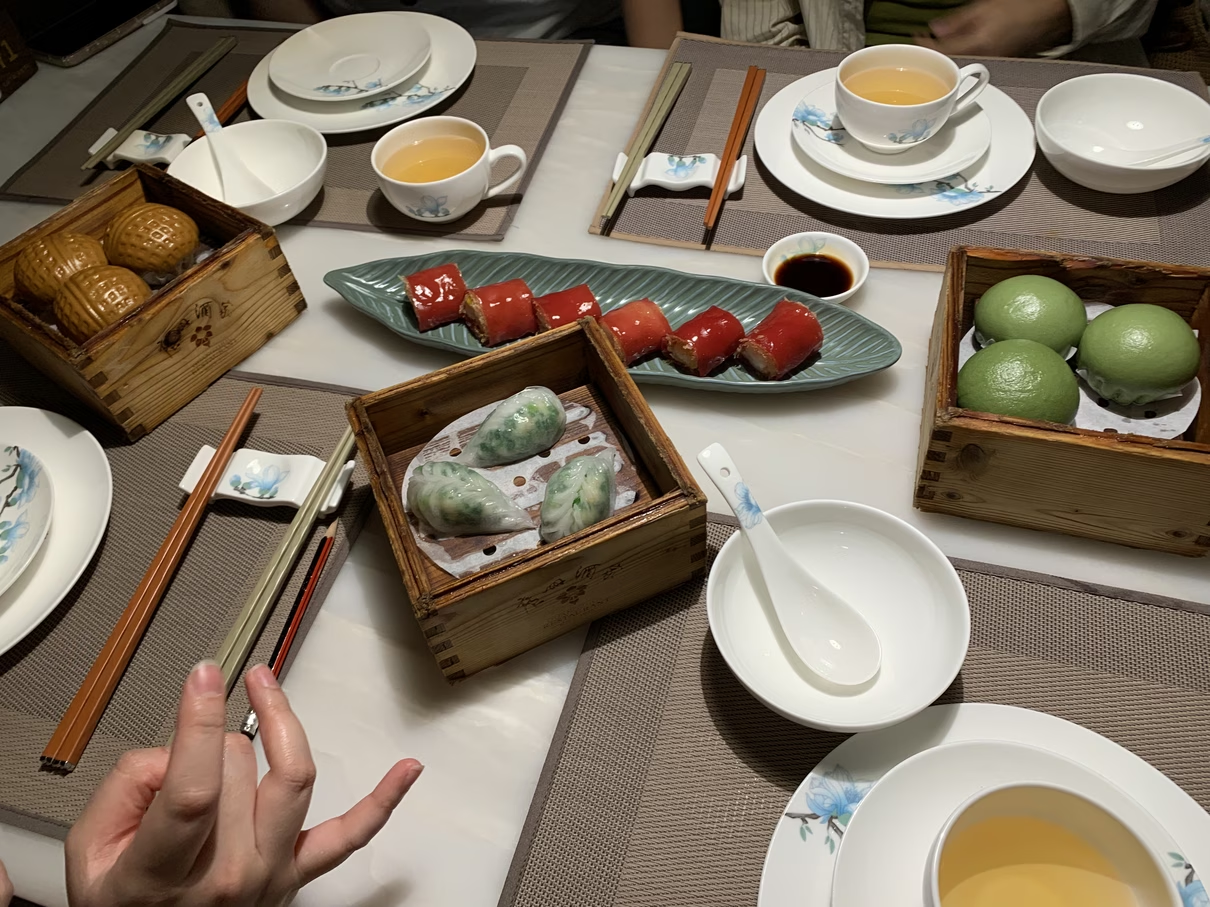
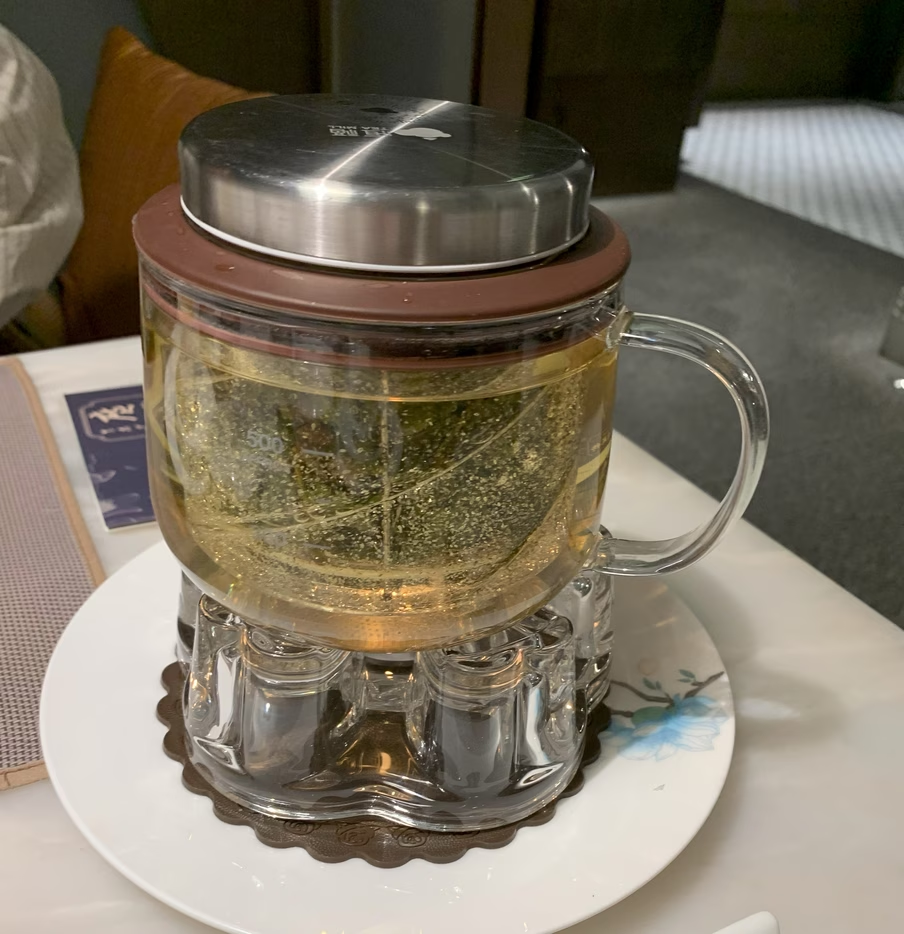
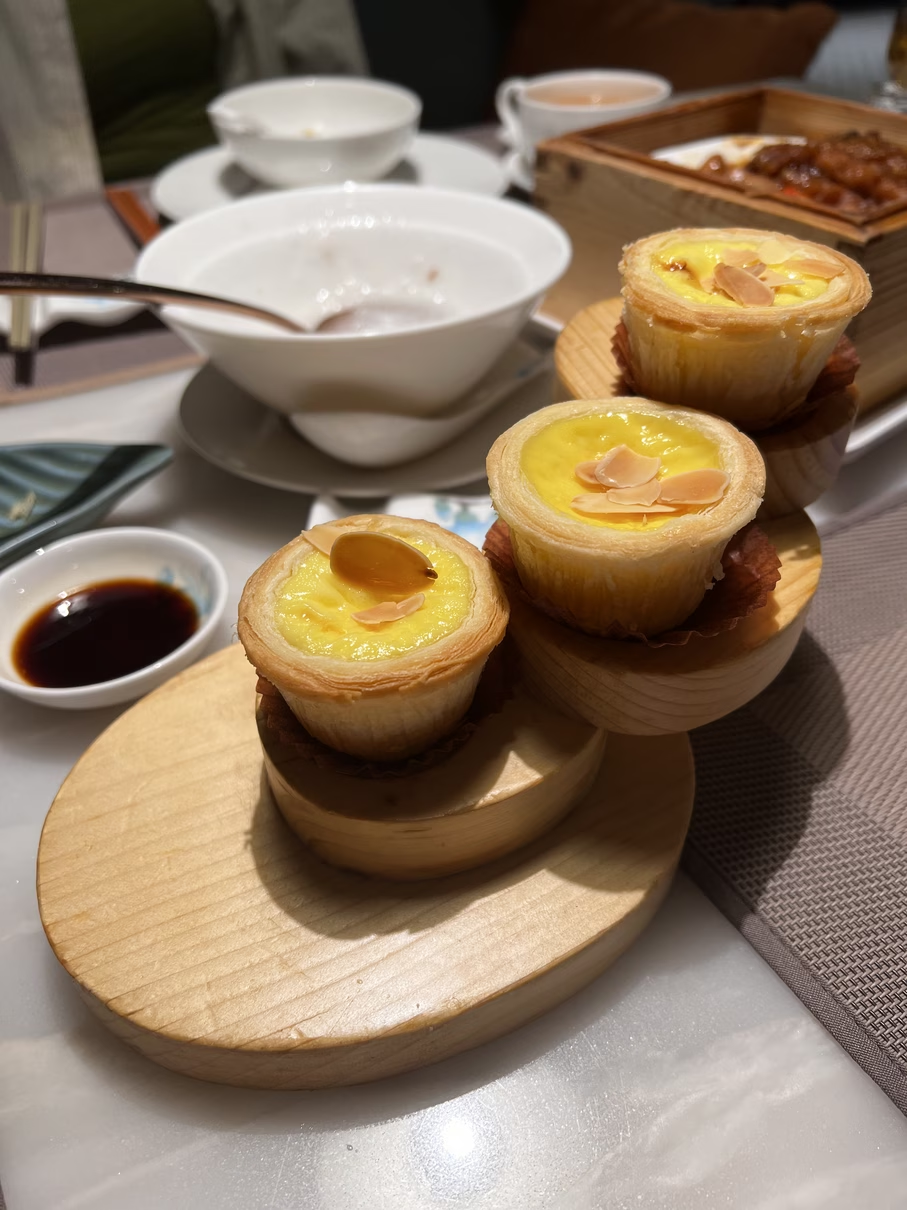
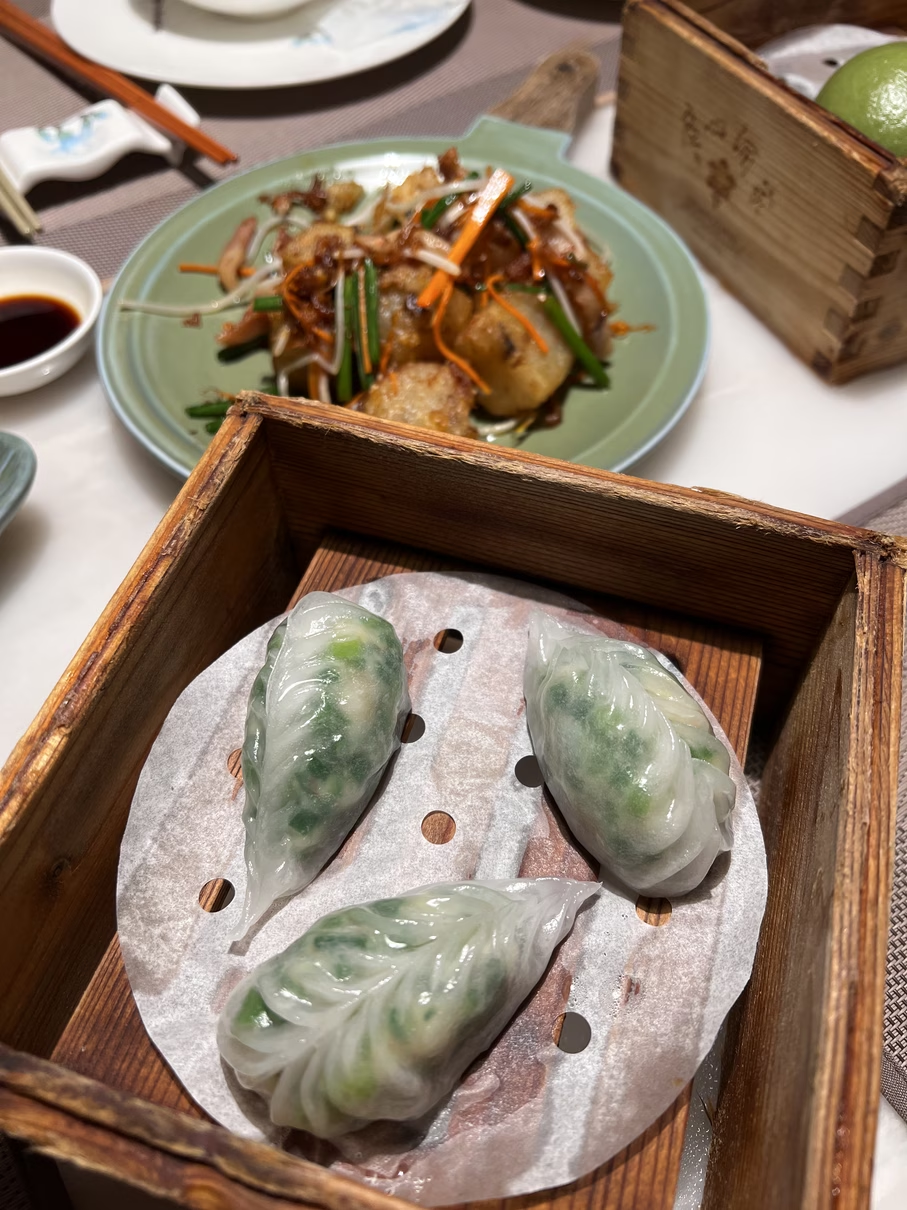
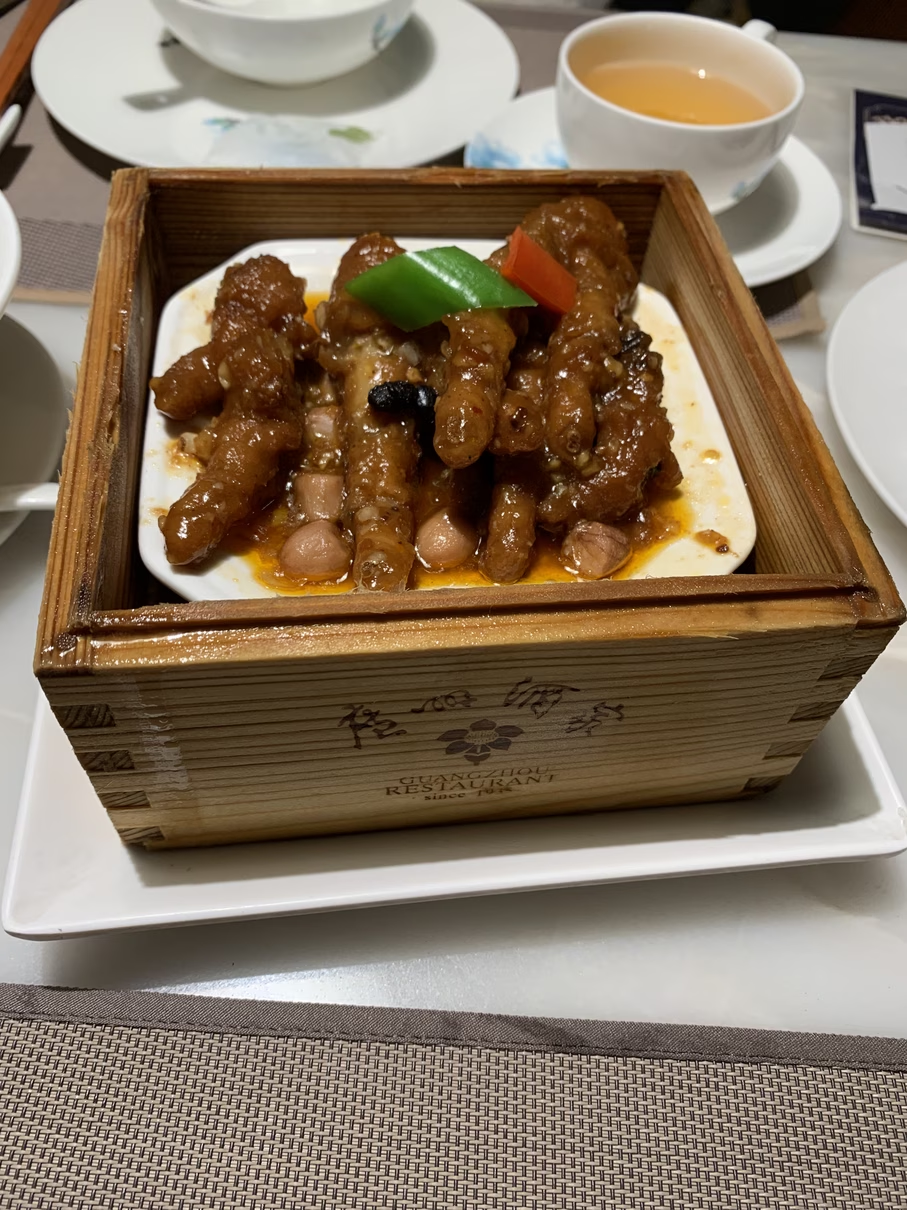
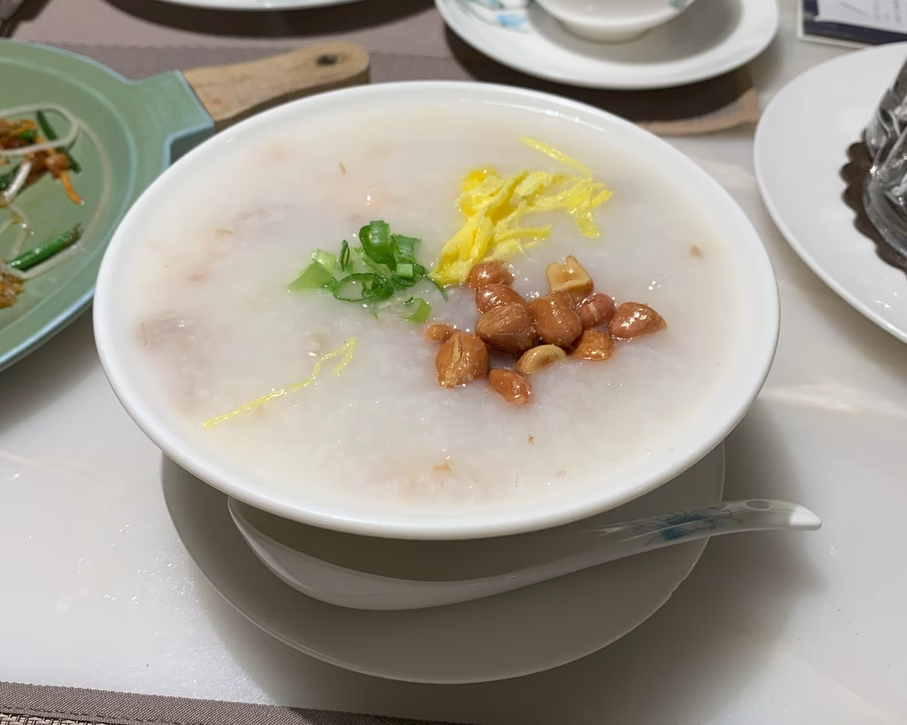
Hua Cheng (Flower City) Square
After breakfast and an extensive photo shoot in front of the restaurant, her friends took us on a tour of the city's central park, Hua Cheng Square. It was just around the corner from the restaurant, and thankfully, the mist had stopped. Working through skyscrapers, we came to a clearing where we were greeted with a full view of Canton Tower except for a few obstructive clouds.
At ground level, the square is a giant park in the center of the tallest skyscrapers in the city, just across the river from Canton Tower. The park was relaxing, and it covered a gigantic secret mall underground. From what her friends told us, much of that mall was new. There were a few metro stations and hundreds of shops and restaurants. The intricate tunnels connect to nearby towers, each with malls at their bases. At the center of the square was a large opening that served as a picture spot, as shown below. Shortly after, her friends had to head out, so we parted ways and continued exploring the area.
Our first stop was a strange cylindrical popup shop in the park. It happened to be a post office that also sold collectable stamps, special envelopes, and commemorative currency notes. Of the notes on sale, they had the crown jewel of Chinese currency collecting in stock, the Dragon Note released in the year 2000 to celebrate the millennium. We picked up a few things, notably a stamp collection book that can be taken to different Chinese cities to press exclusive stamps into the pages!
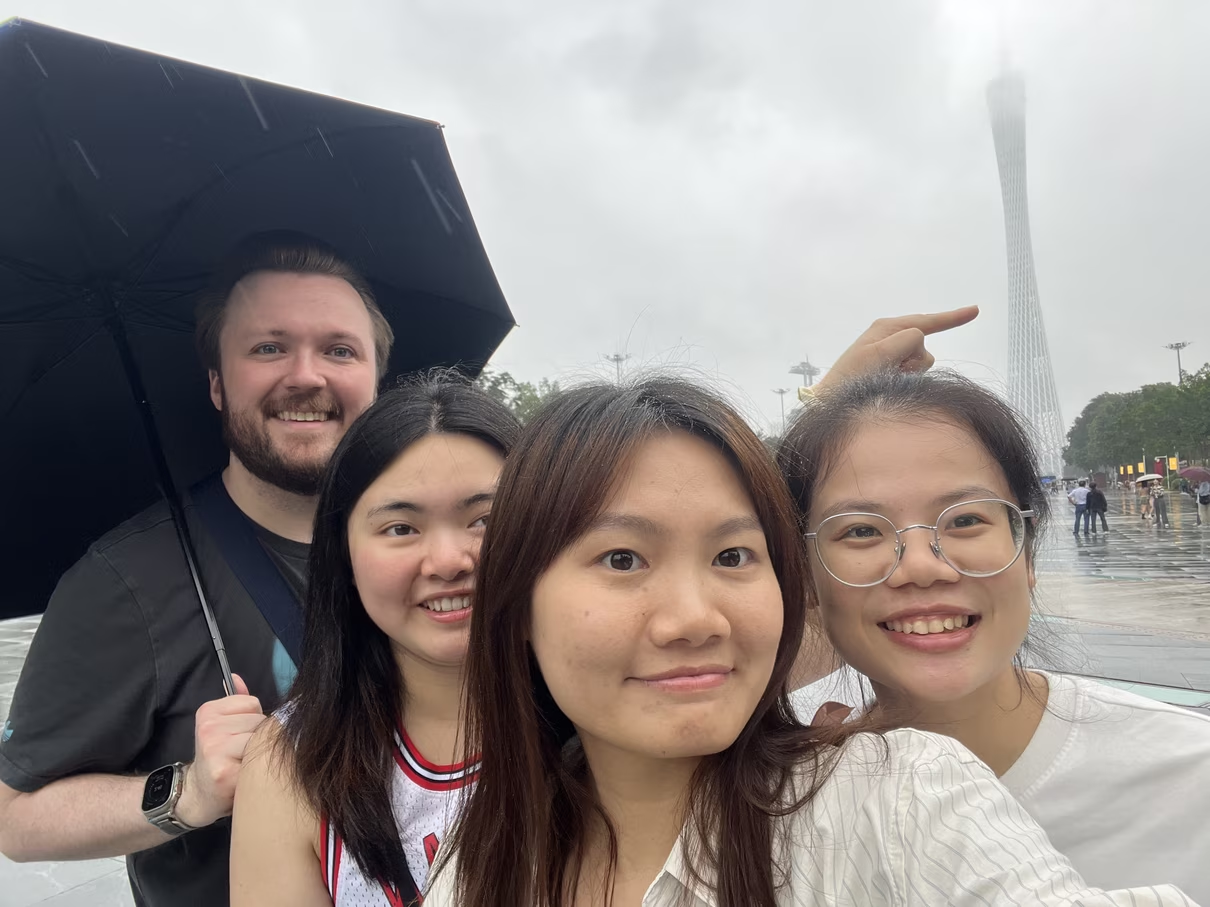
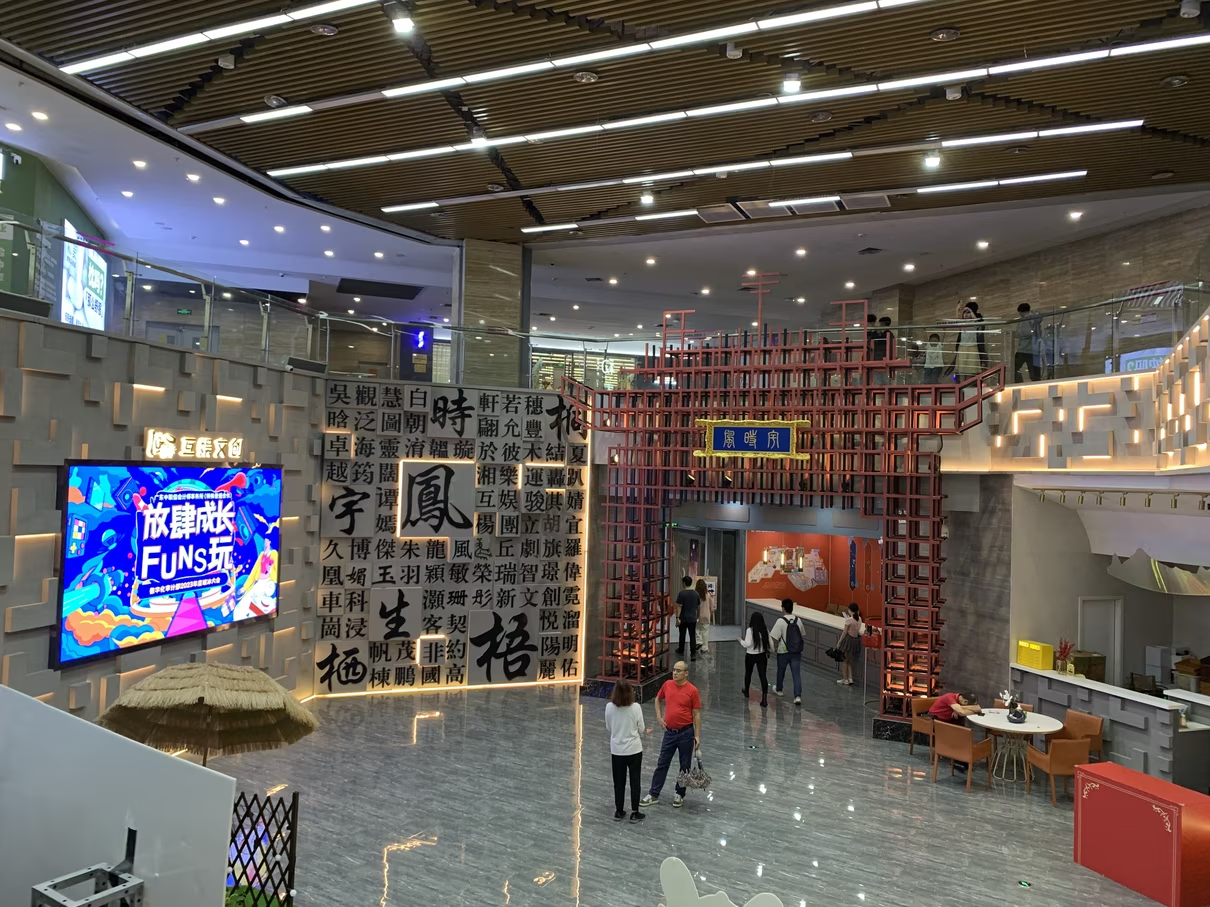
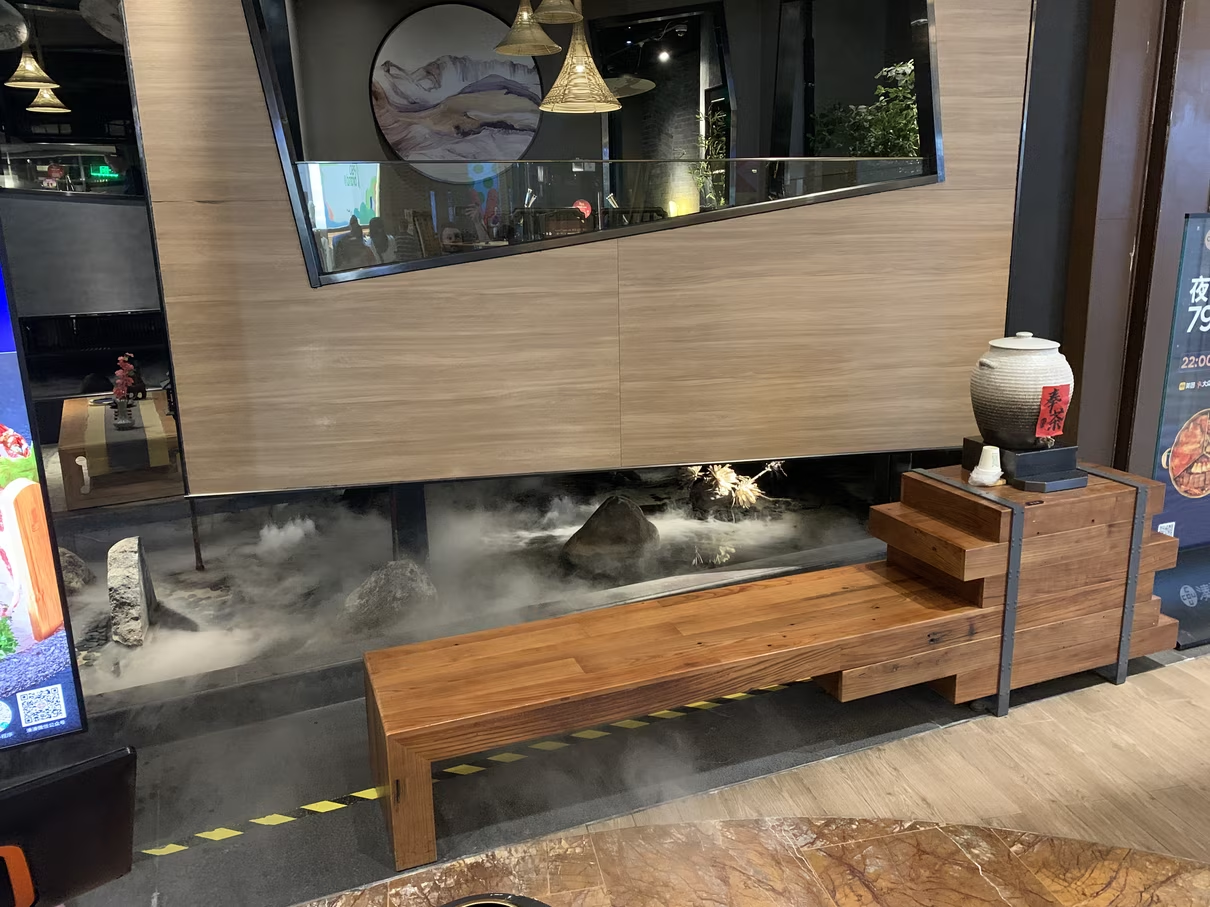
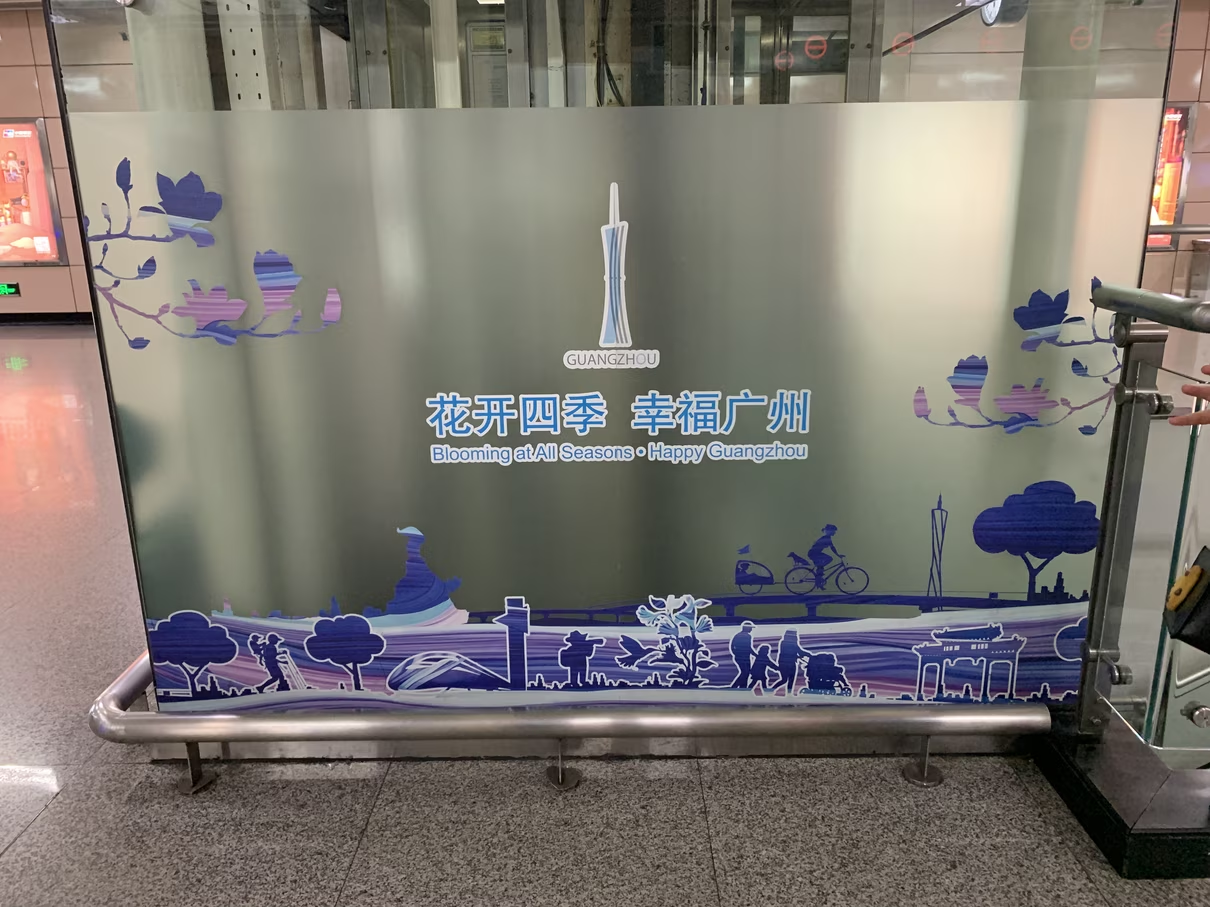
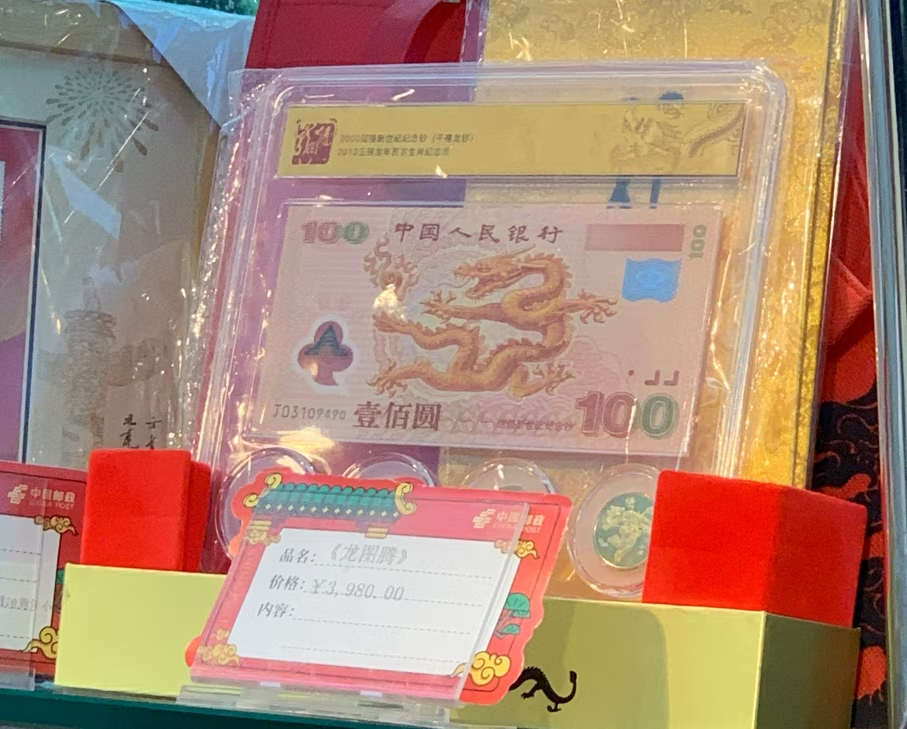
Heading down into the mall again, we found a food court where I was shocked to see a Dairy Queen! Unfortunately, we couldn't try it after the feast we'd indulged in earlier, but the differences in branding were fascinating. Meandering our way through the tunnels, we unknowingly entered a connecting tower that houses the most luxurious mall in the area, K-11. Originating from Hong Kong, this chain brands itself as an art mall. We shopped around several unfamiliar, artsy clothing brands, got some milk tea, and admired art pieces strewn throughout the place, including the vibrant Guangzhou sign pictured in this blog's thumbnail! After picking up gifts for Jiayi's family, during which a kind shop owner gave me a sticker pack to welcome me to China, it was time to get back to Guangzhou South for our scheduled bullet train departure. We got lost and almost didn't make it in the confusing metro, but everything turned out ok with a quick sprint to the departure gate 🚄.
A Reunion in Shenzhen
In 2019, when Jiayi and I were studying abroad in Tokyo, one of our best friends was a Chinese girl named Tina. Originally from the North, she recently relocated to Shenzhen, which borders Hong Kong just South of Guangzhou. Conveniently, getting to Shenzhen takes less than 45 minutes by bullet train. We made plans with Tina before arriving in China, so that Sunday, we headed down to catch up with her!
Our tour of the city hotspots started at another giant mall, where we ate at a Shanghainese restaurant. The mall was a mix of outdoor and indoor segments with a new-age vibe and a younger crowd. Chinese big tech (HuaWei, Lenovo, Tencent, etc...) has a lot of offices in Shenzen, so it's clear why the city had taken on this atmosphere. After lunch, we found another Dairy Queen and decided to pick up some ice cream this time, but they didn't flip the cup 😔.
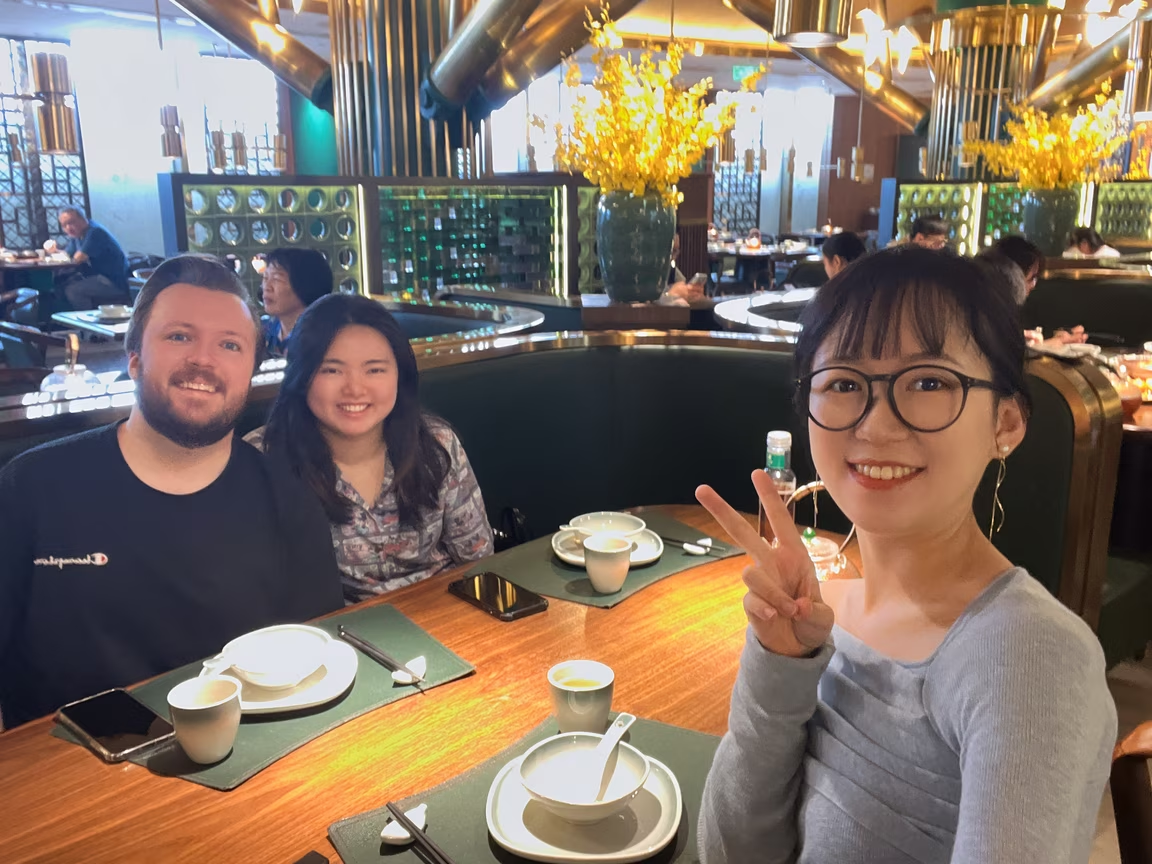
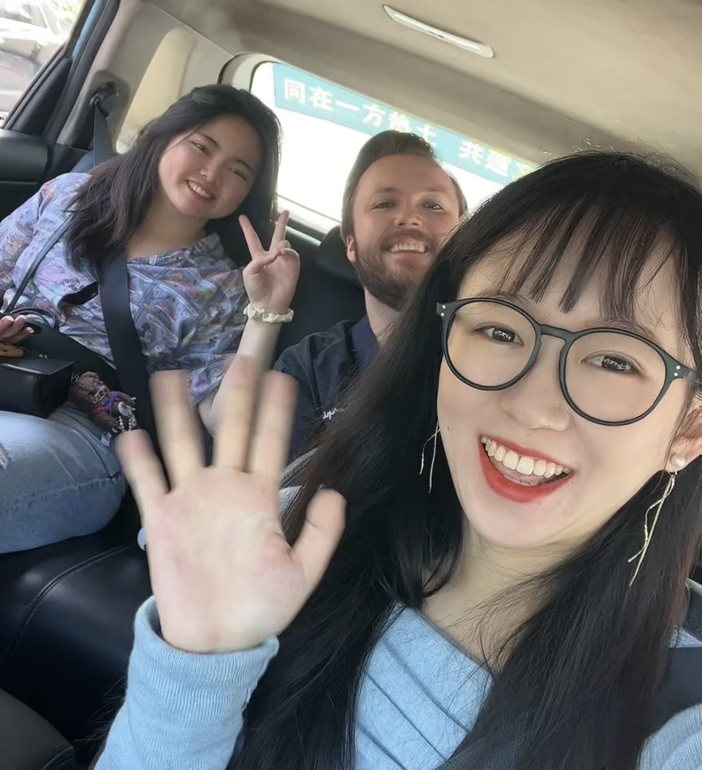
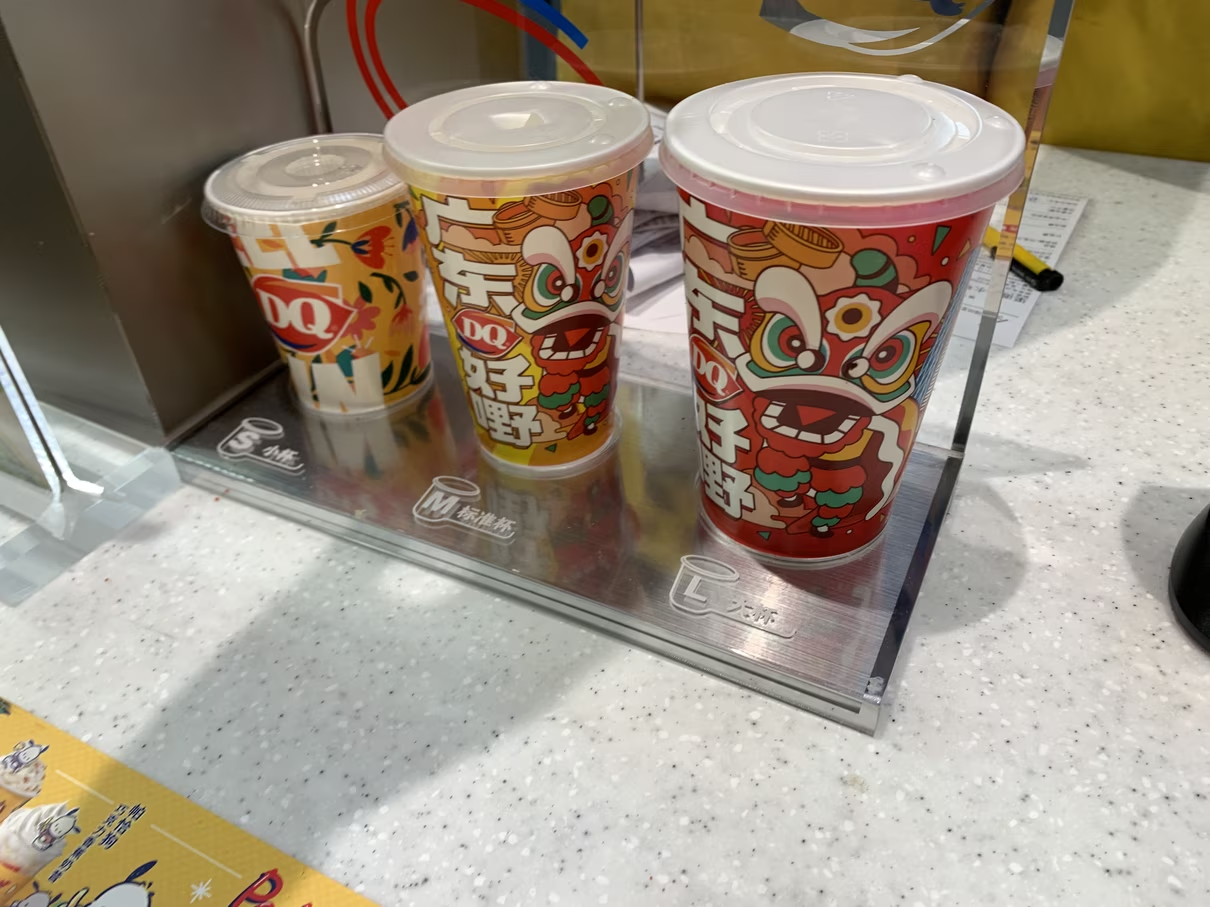
We hopped in a cab to visit the opposite side of the city, encountering many more floral arrangements and colorful landscaping along the cross-city highway. Tina took us to a harbor park leading to the bay at the city's edge. At a lookout point on a bridge, we had unobstructed views of Shenzhen and could see some of Hong Kong's islands in the distance!
To end the day, Jiayi and Tina had found a crab restaurant in another mall that happened to be downtown, just under Lenovo's Shenzhen headquarters. This mall had a similar young vibe, and while I was exploring on my own, I came across a parade of Pandas and a random outdoor performance of the Beauty and the Beast. Overall, the city was energetic, and I wouldn't mind living in Shenzhen one day. It seemed pleasant for young folks in the tech crowd and had a bizarre character in a "keeping the day-to-day interesting" kind of way.
Breaking free of these distractions, we had run so short on time that we couldn't finish our food! We hurriedly called a cab to the bullet train station, said a sad goodbye to our friend, and traveled back to Qingyuan.
Time with the family
As a reminder, I was still in a pseudo-quarantine until after our day-trip to Shenzhen, so it was finally time to see the family! I hadn't seen her mother or father at all the first week, only Jiayi had when delivering food and supplies. This was also the first time I was getting to meet her dad in person. Her mother had come to stay with us for 3 months in Sydney over the Aussie winter, May - August, but her father didn't visit. Before then, we couldn't have visited China until after March 2023 even if we wanted to because their border remained closed until then.
I was excited to see "Zhongguo ba" and "Zhongguo ma" which literally means "Chinese dad" and "Chinese mom", respectively. The whole family gets a kick out of me calling them that, but I only started doing so after realizing everyone in her family calls me "Meiguo zai", or "American guy". And, don't worry, none of these are slurs or hateful. If you do come to the Southern, Cantonese parts of China, the slur to look out for against white Westerners is "gwái lóu", meaning "foreign ghost" 👻. I don't know any others, but I like to rip the hate right out of charged words like that, so I jokingly introduce myself as a "guai lou" sometimes to poke at them. I did the same thing in Japan by fully owning "gaijin"!
Village in a Bamboo Grove
The morning we finally got to meet, Jiayi and I went over to their apartment early as we had plans to go out that day. We did introductions and her and her parents caught up for awhile, and Jiayi gave me a tour of her childhood room! Next, we met with my mother-in-law's brother and his wife to eat yum cha. After breakfast, we visited the family's countryside villa that her father and his brothers shared. Outside of Qingyuan's urban area, views of the mountains and forests were relaxing. Their place turned out to be a 5-story building that towered over a little village, hidden away in a bamboo grove walled in by nearby mountains and a stream.
From what I'd been told, her father and uncles built and shared the building where each brother claimed a floor. Traditional decorations and furniture made it quite an experience, and the house had a roof courtyard to take in the scenery from above. Furthering the cultural significance of the place, a pond in the middle of the village was populated with giant, orange-patterned koi fish, and chickens and cows roamed freely.
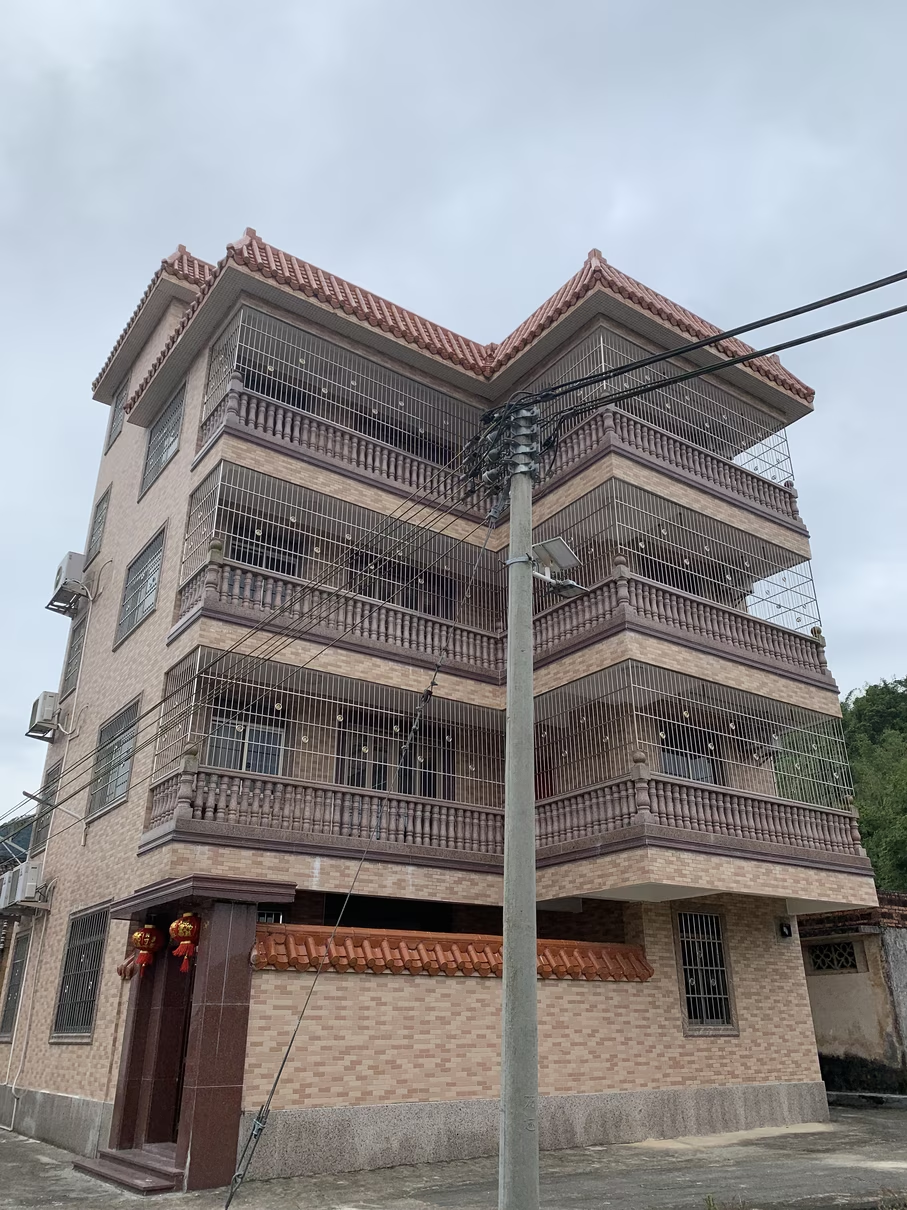
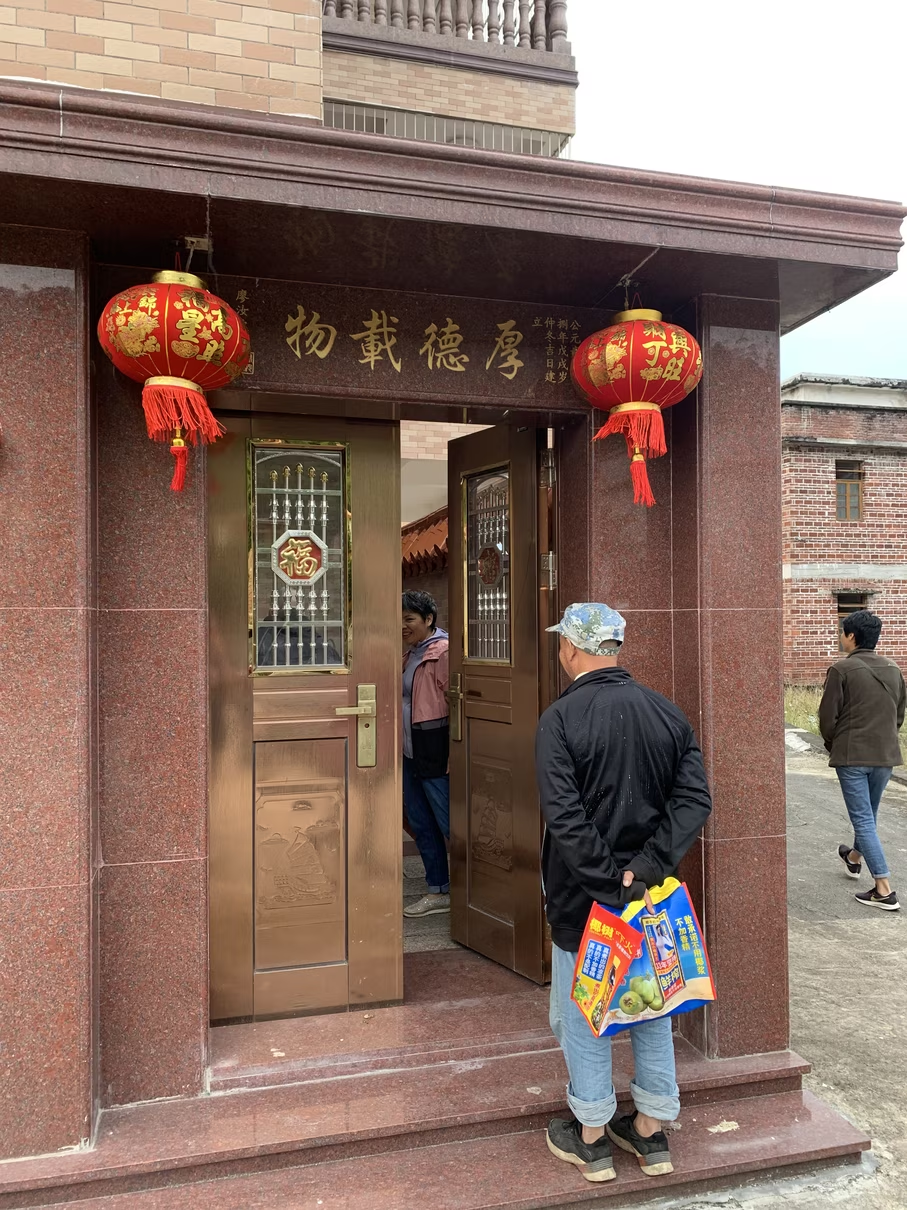
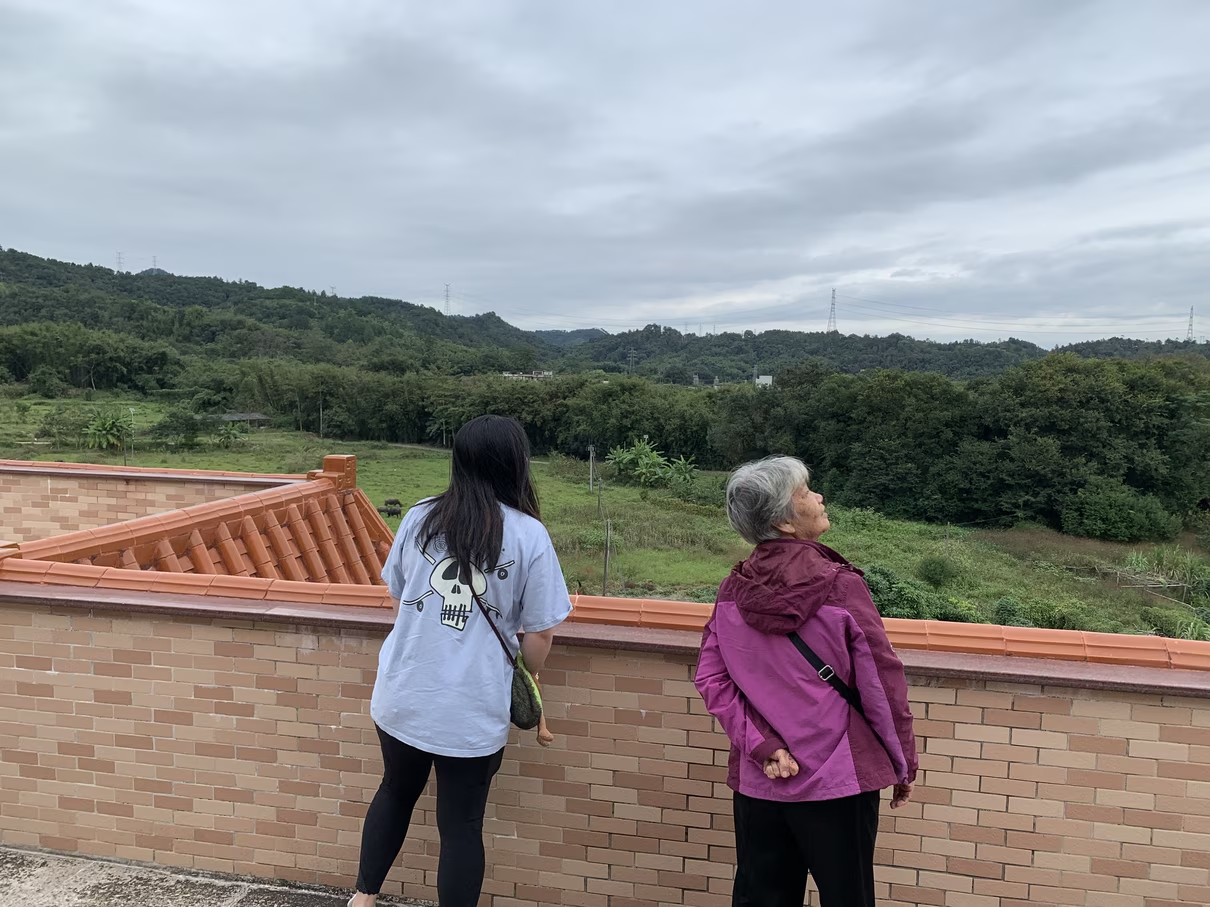
Shortly after arrival, a few locals in the village came by to talk with my in-laws. Jiayi mentioned they were distant cousins, and that this village was supposedly where her family originally hailed from. I took to calling them countryside cousins when asking Jiayi to translate for me. They were super nice, and though they tried not to show it, I could tell they were shocked to see a foreigner in such a remote place.
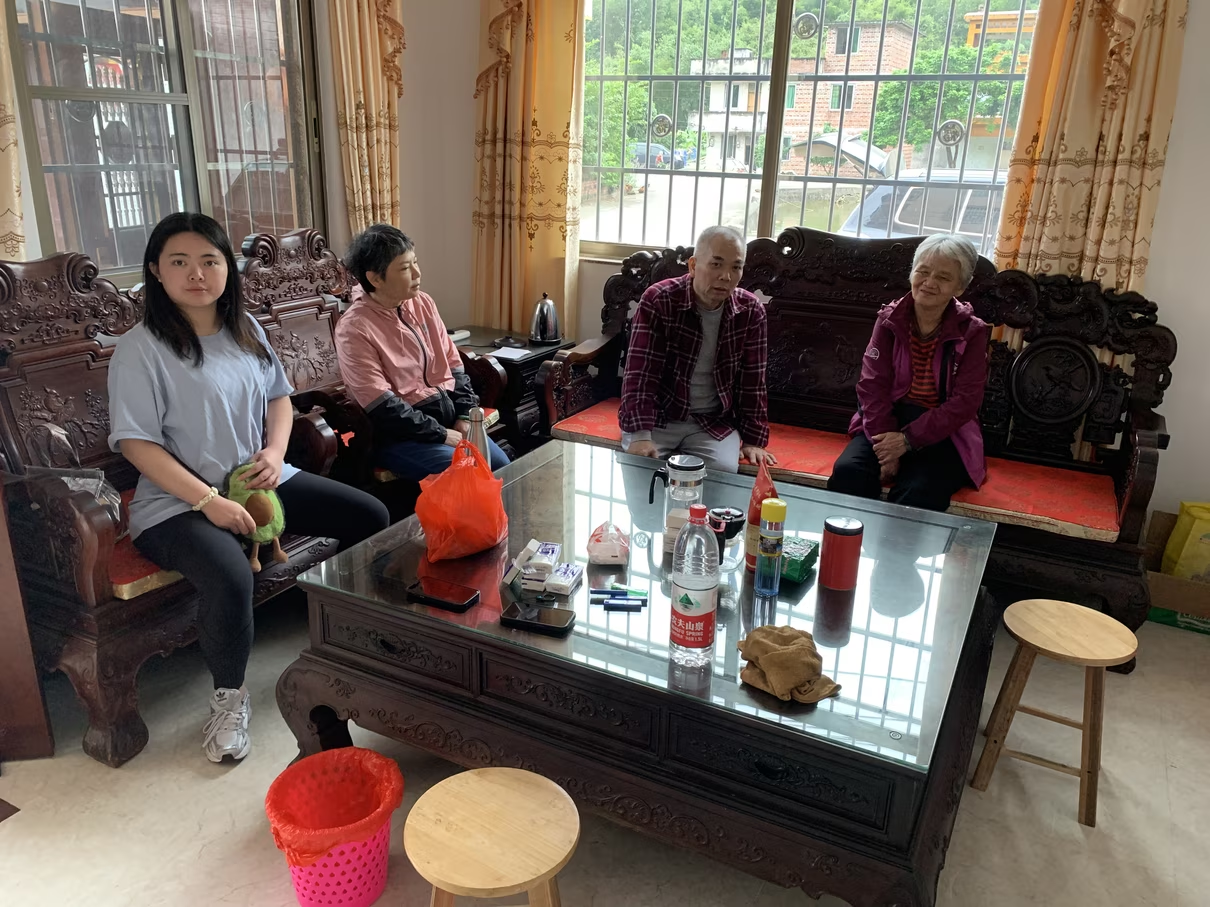
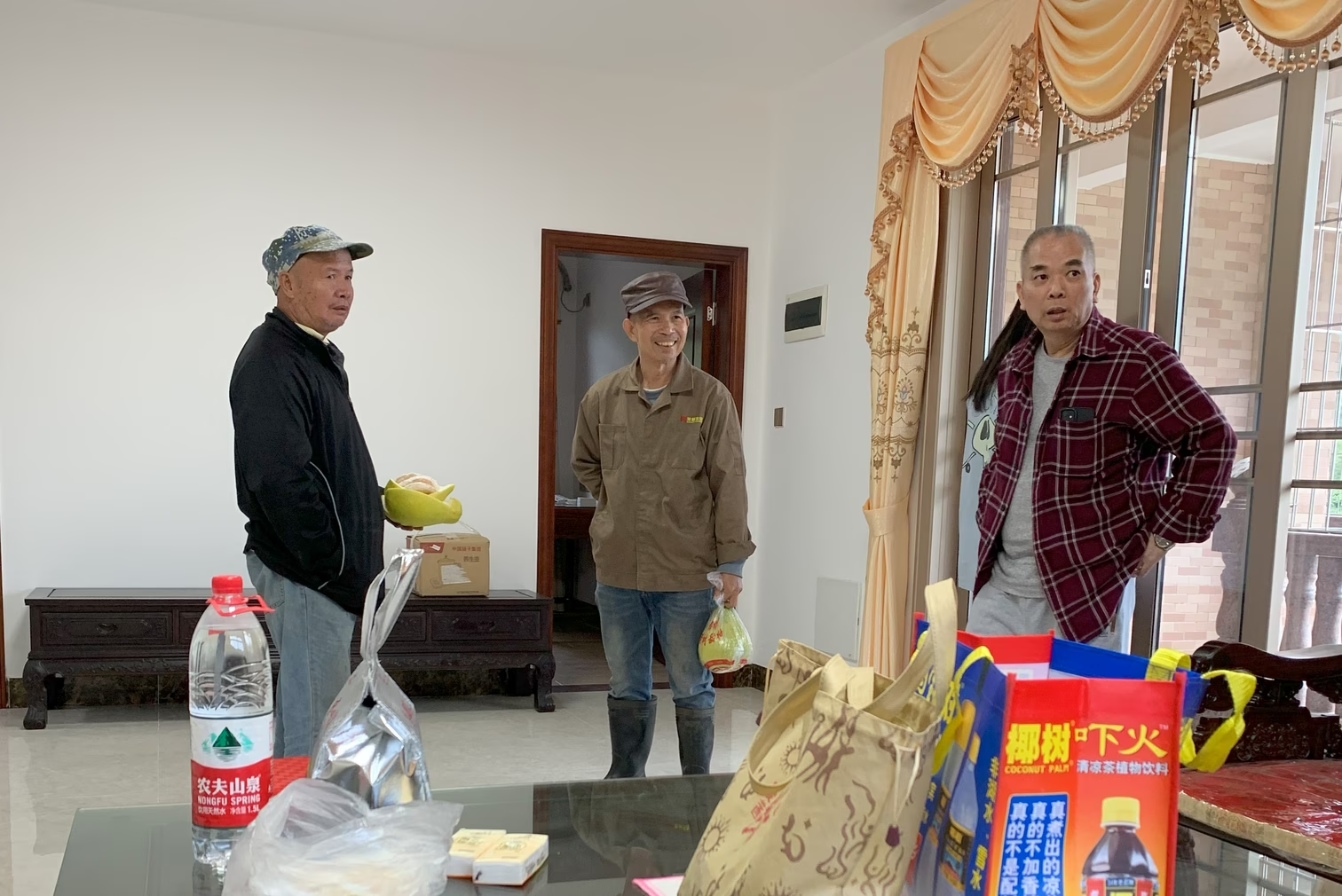
To end the day, we went back to Qingyuan to have dinner at a seafood restaurant where the food was chosen by inspecting live fish, lobster, crabs, etc... in massive tanks in the restaurant. They have similar kinds of restaurants in Sydney, but the scale of this one was impressive given the quantity and size of the tanks. Unfortunately, some of those tanks had turtles, and I was tempted to perform a prison break and free them in the river. One crab was already ahead of me and trying to escape on his own:
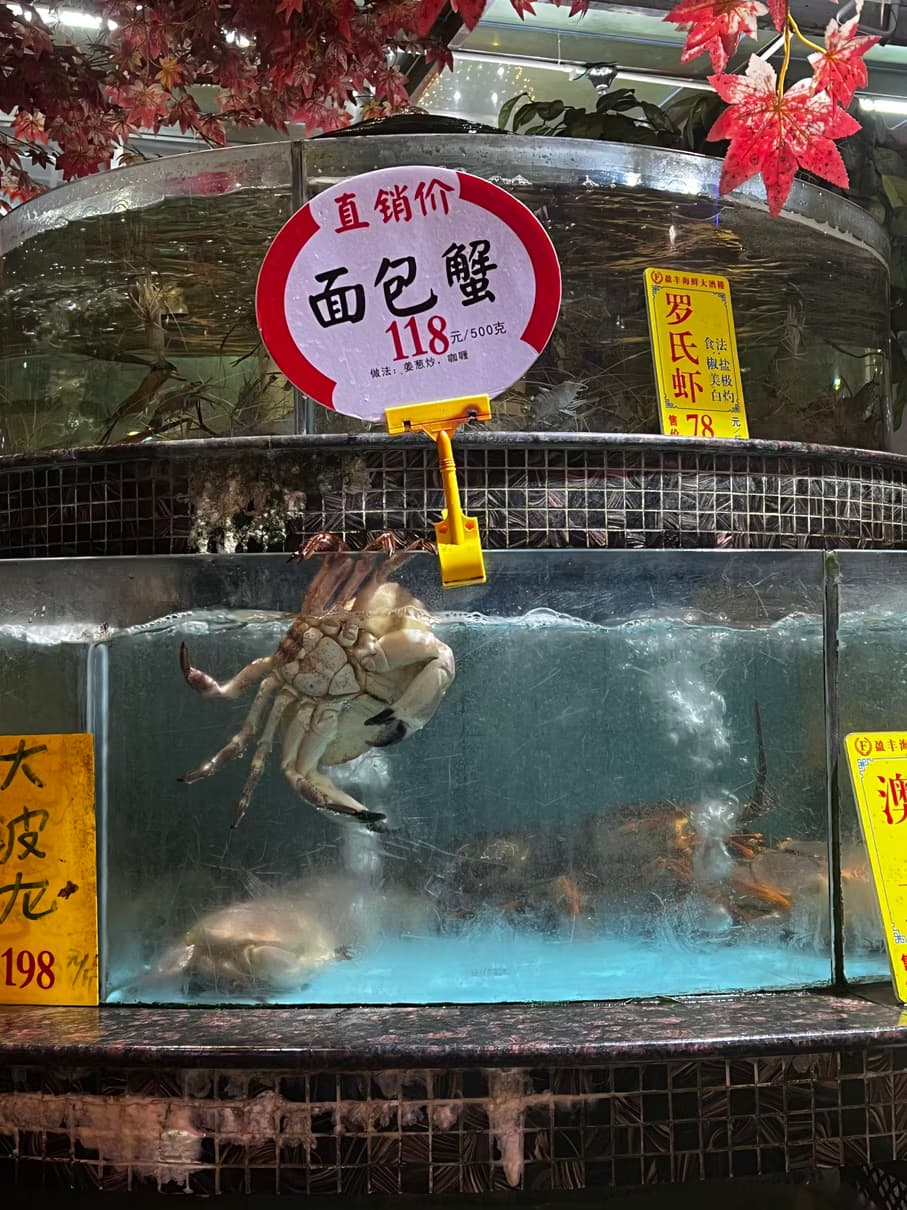
Hospital visit in Gaungzhou
This next story takes the cake for my most insane experience of our trip. Having stabilized considerably, we helped take Jiayi's father to Guangzhou for a consultation at a higher-quality hospital. A family friend's daughter worked as a nurse at Guangdong General Hospital, and she offered to help us cut through the extreme crowds typical of China's domestic hospitals.
Perhaps I should clarify a few things and offer context. By domestic hospital, I'm differentiating against other institutions called international hospitals. I don't know much about them, except that they are generally more expensive, less crowded, and prescribe Western styles of treatment. These are great options for expats in China, but we didn't visit one. Instead, we visited a normal hospital subjected to the scarcity, crowds, and throughput needs generated by a mega-city of almost 20 million. (Fun fact time - Guangzhou is also part of the Pearl River Delta, a web of cities that have urban sprawled themselves together to form the largest urban region on the planet by area and population: 86 million people. The cities included are Guangzhou, Foshan, Shenzhen, Hong Kong, Macau, and others.)
Additionally, hospitals in China house more than just operations or emergencies. This compound had general practitioners, all sorts of specialists, a built-in pharmacy, and many other services. Patients could get a referral to 3 specialists and some prescriptions from their GP, visit those specialists, and pick up their medicines, all on the same day. Lastly, Qingyuan, Jiayi's city, is well known across China for good quality chicken for whatever reason. If you're wondering why this is important, it will become clear soon 😅!
We planned to wake up early and leave by 7 AM, so that morning we peeled ourselves out of bed and headed over to her uncle's apartment. They had hired a driver, one of their family friends, to chauffer us for the day. As we arrived, the car was parked in the front, next to which my mother-in-law was kneeling down counting eggs, and my father-in-law and uncle-in-law were loading other produce and items into the hatchback. It seemed like we were bringing the whole farm! Given our destination was a hospital, I was initially shocked. My inquiries were met with a cursory, provisional answer on cultural gift-giving, so I decided to wait until we were settled in and on the road to ask Jiayi to elaborate.
Not long after departure, strange noises were emanating from the back, just behind me in the vehicle. Looking back, I could see a bag that seemed to be struggling. Hitting roundabouts and small pits in the road made the wriggling intensify. Finally, upon hitting a jarring crater in the road, I heard a panicked cluck! I made eye contact with Jiayi incredulously as her wicked grin burst into laughter. They'd tied up and brought two chickens!!!
Unable to ignore this, I interrogated Jiayi to learn that all of this produce would be gifted to the nurse's mother for helping us with the hospital visit. Qingyuan's quality chicken was somewhat of a prestigious gift that made for a more powerful show of appreciation. We met her first before going to the hospital to hand over the food and chickens. At our rendevous point, she appeared on a bicycle, accepted the gifts, stored everything (including the two live chickens) in the basket on her bike, and rode back out of sight - a brief, surreal encounter, but We would see her again later for lunch.
For anyone who isn't American, the juxtaposition of having a farm in the car enroute to the kind of hospital I'm about to describe was a world apart from my experiences back home. Healthcare in the US is exorbitant. However, all of that cash makes even an average hospital feel luxurious. Outside the sad circumstances that necessitate visiting one, I've enjoyed going to them since I was a kid. Maybe that's selfish against whichever family member was hospitalized, but these occurrences were almost always followed by an increase in gatherings of family. Despite feeling sad over someone's afflication, I was conditioned to expect small, warm reunions to parallel these scenarios. Many unfortunate circumstances during my childhood had the silver lining of bringing everyone together, but I digress. All that to say, the humanity evoked in hospitals is endearing. Therefore, I have experienced hospitals as warm, upscale, and strangely relaxing compared to the average person's view that they are cold, dark, and depressing. With this in mind, you'll better understand my reaction to the one in Guangzhou.
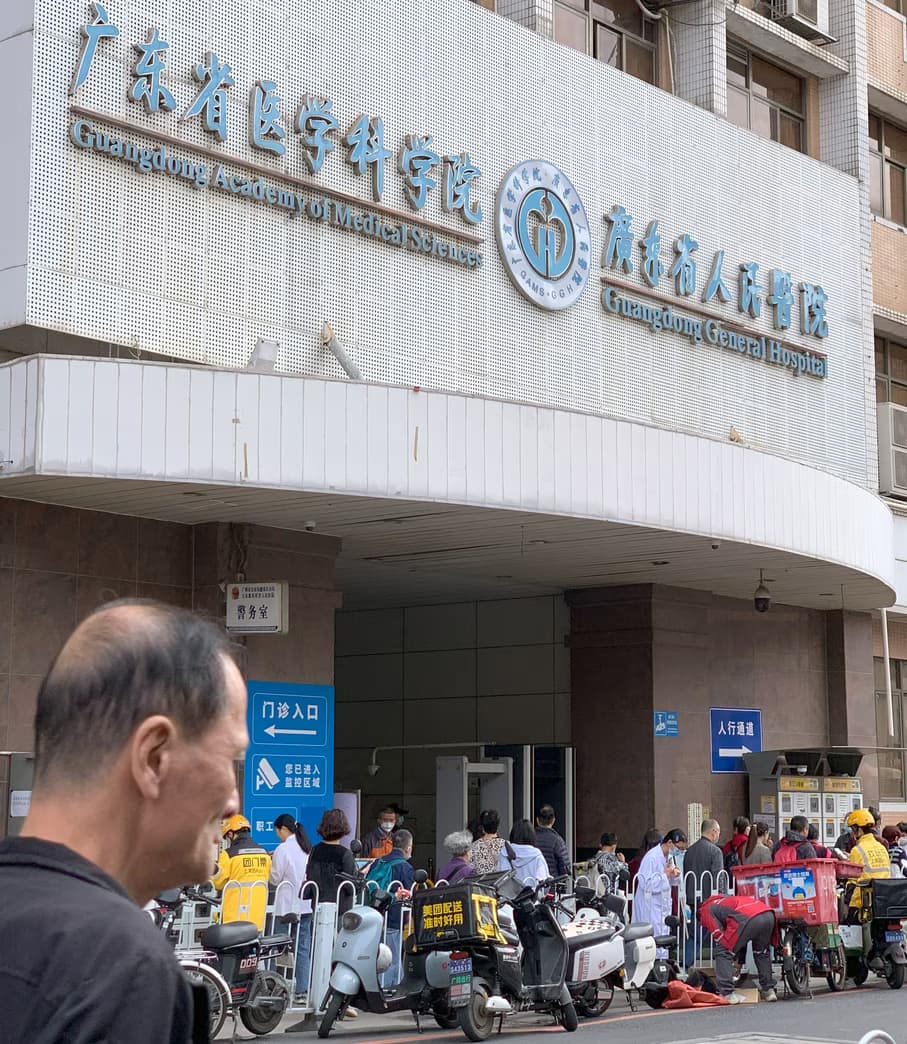
Arriving at the hospital, the sidewalks around the building were barely walkable due to dense crowds and construction. Squeezing past people while trying to clear a path for my father-in-law, we walked through the front gate into a courtyard encircled by several 10-ish-story hospital wings. At the center, there was a building-sized medical tent, possibly for vaccinations or donating blood, which seemed like a standard practice to reduce folks in the buildings. It was something you might see in a zombie apocalypse movie, the sort of pseudo-militaristic medical tents propped up for disaster relief. This was probably normal for crowd control, but my aforementioned perspective stoked my astonishment. In that vein, I was further dumbfounded by the amount of cigarette smoking taking place in this courtyard and in stairwells around the hospital. Cigarettes and hospitals probably shouldn't go together 🤷♂️.
Behind this tent, we met our nurse friend who we followed into a more intensely crowded hall. Here, among the general bustle, there were smaller mobs of people "lining up" at the offices of doctors and specialists. People fought to enter these rooms as walk-ins before the last patient could exit. Luckily, our nurse friend guided us past the rambunctious pack and into a tiny office for a consultation with a gastroenterologist regarding her father's stomach bleed. This conversation took less than 5 minutes causing me to have concern over how much due diligence was done here. Furthermore, the pack of hyenas outside possibly realized we had cut ahead and kept breaking into the office. At one point, an assistant to the specialist used his body to slam it shut and we barricaded it temporarily so that the doctor could finish speaking.
Next, we went to a heart doctor in a different wing. Here, there weren't many crowds like the ground floor, but we did have to take an elevator with like 30 people. The timing of this appointment was about the same: suspiciously brief. We kept being interrupted by other nurses this time, trying to get their patients taken care of during our consult. Along the way, we collected various prescriptions, so our nurse friend led us to the pharmacy. Jiayi entered the scripts into a ticketing machine where we paid. After just a few minutes, they called us to collect everything. Then, our nurse left to wash up and prepare for lunch, which we were regaling her and her mother to as a thank you.
Michelin-selected lunch at BingSheng Pin Wei
Our driver took us to BingSheng Pin Wei, a "Michelin-selected" restuarant. I'm not sure what this status means, however, the BingSheng company operates two other restaurants in Guangzhou that each have 1 Michelin star: BingSheng Mansion and BingSheng Private Kitchen. At the risk of sounding cheesy, this place was incredibly ambient and had an excellent atmosphere. Dining rooms were private and held a single table, a TV, and other amenities.
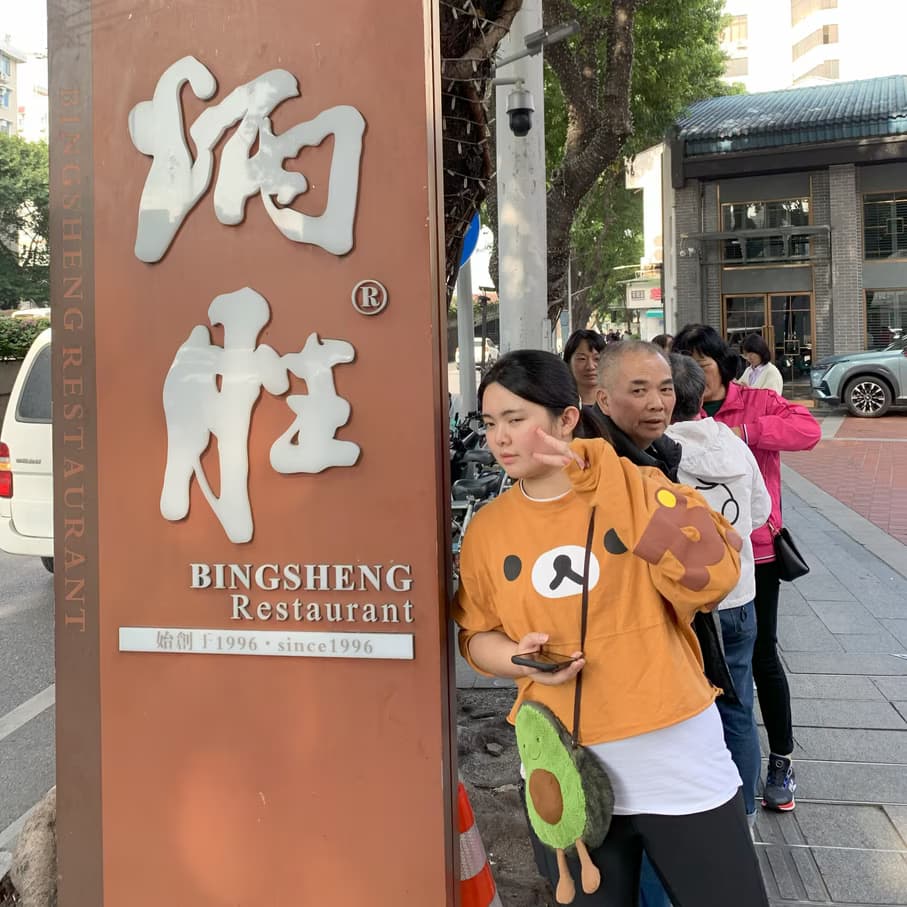
We were escorted to our dining room on the top floor, and Jiayi gave me an etiquette lesson regarding tea-pouring for our guests. Given the size of the table, the younger attendees, Jiayi and I, were meant to get up every now and again to refill everyone's tea. This meant that we had to pay attention to the pace at which everyone drank as letting the cups run dry would be considered rude. Happily, I can say we did a decent job except for one slip up where the nurse's mother ran out, but Jiayi realized immediately and corrected the fault (not that anyone was taking it that seriously, but still). In typical Cantonese fashion, we ordered various small dishes to share that were all savory. Many of these were things I didn't eat, but the ones I tried were delicious. My favorite dish was a honey-glazed char siu, Chinese-style BBQ pork. I reckon Guangzhou Jiu Jia still holds my top spot, but BingSheng piqued my interest. On our next visit, I would like to see how their Michilen-starred restaurants stack up.
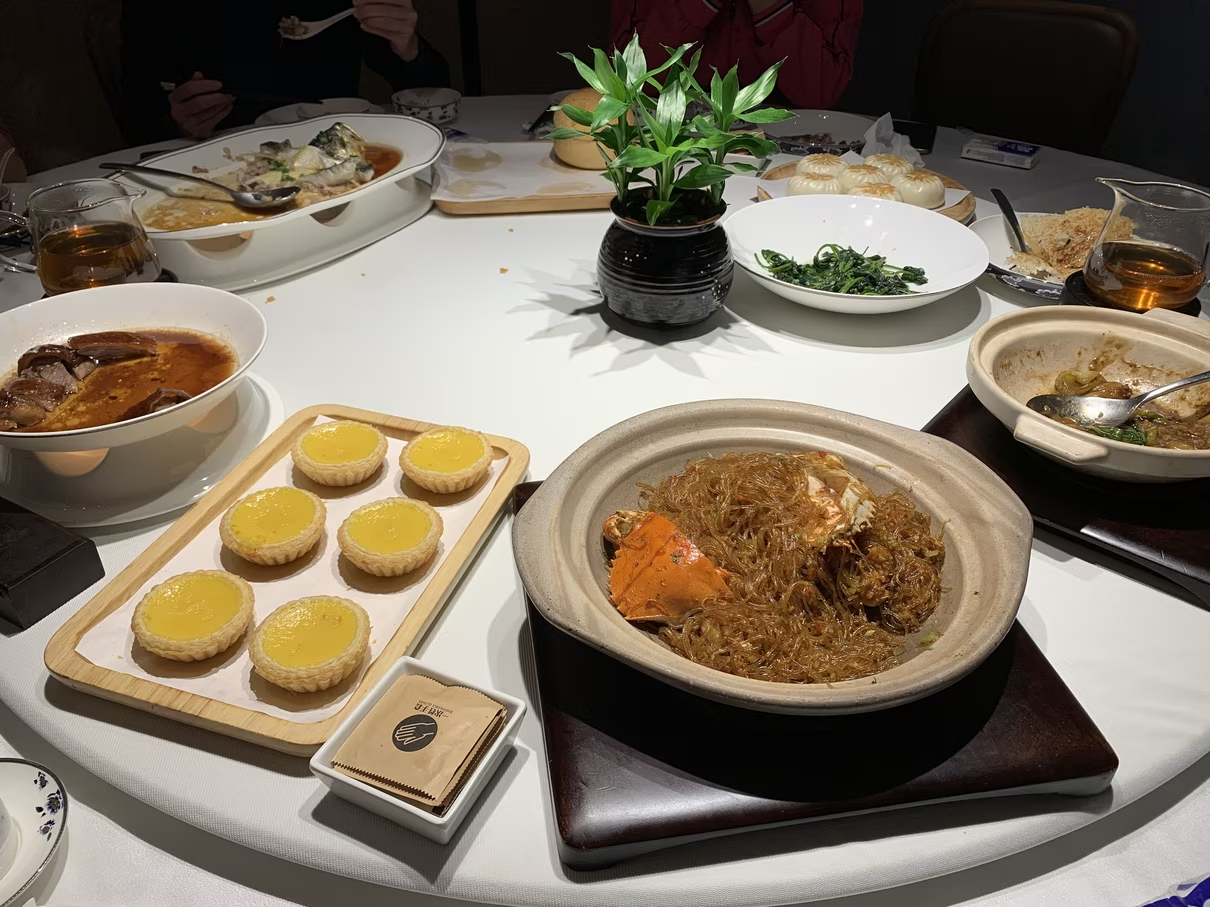
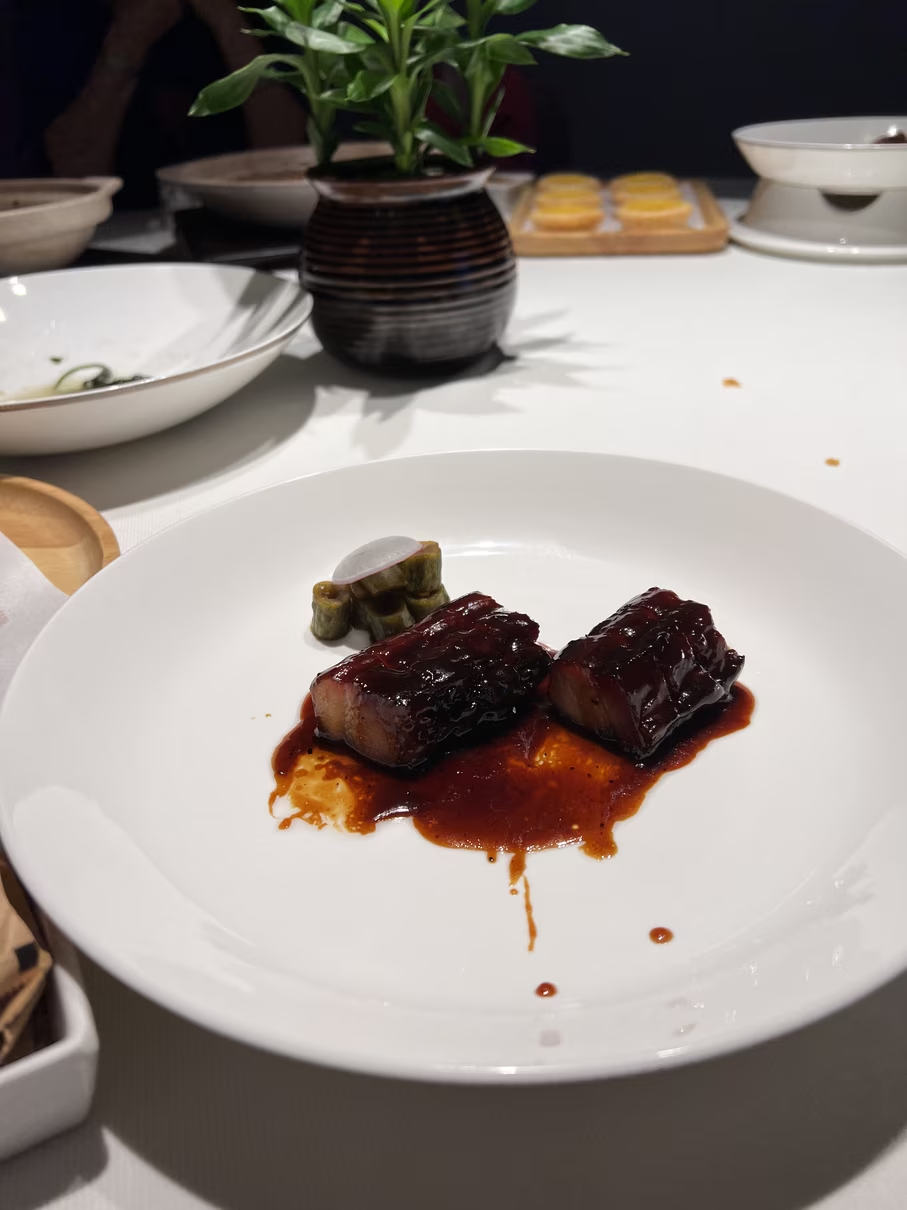
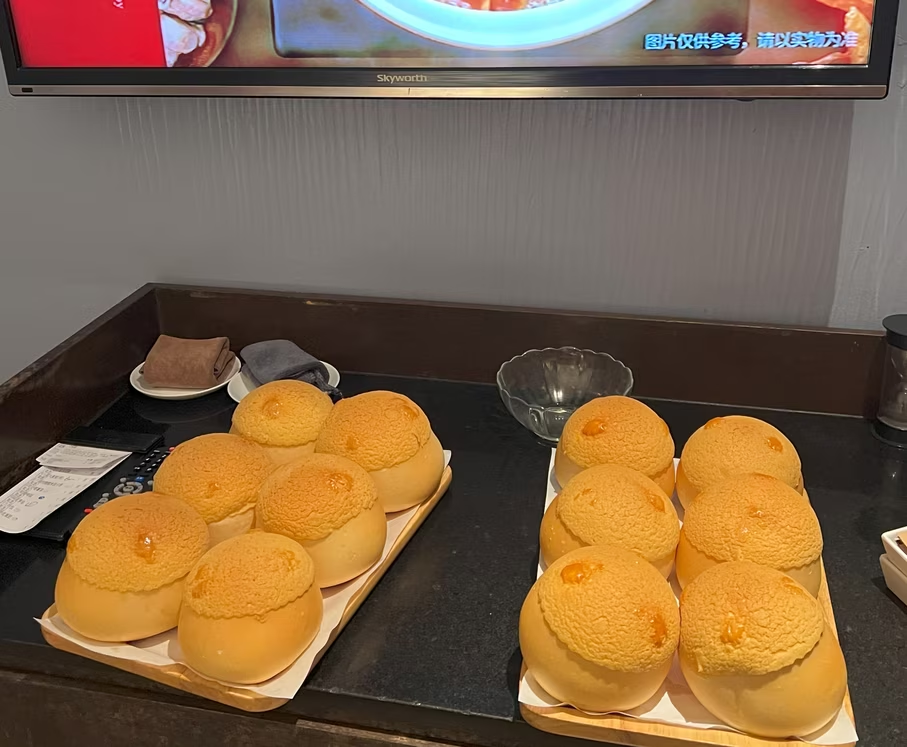
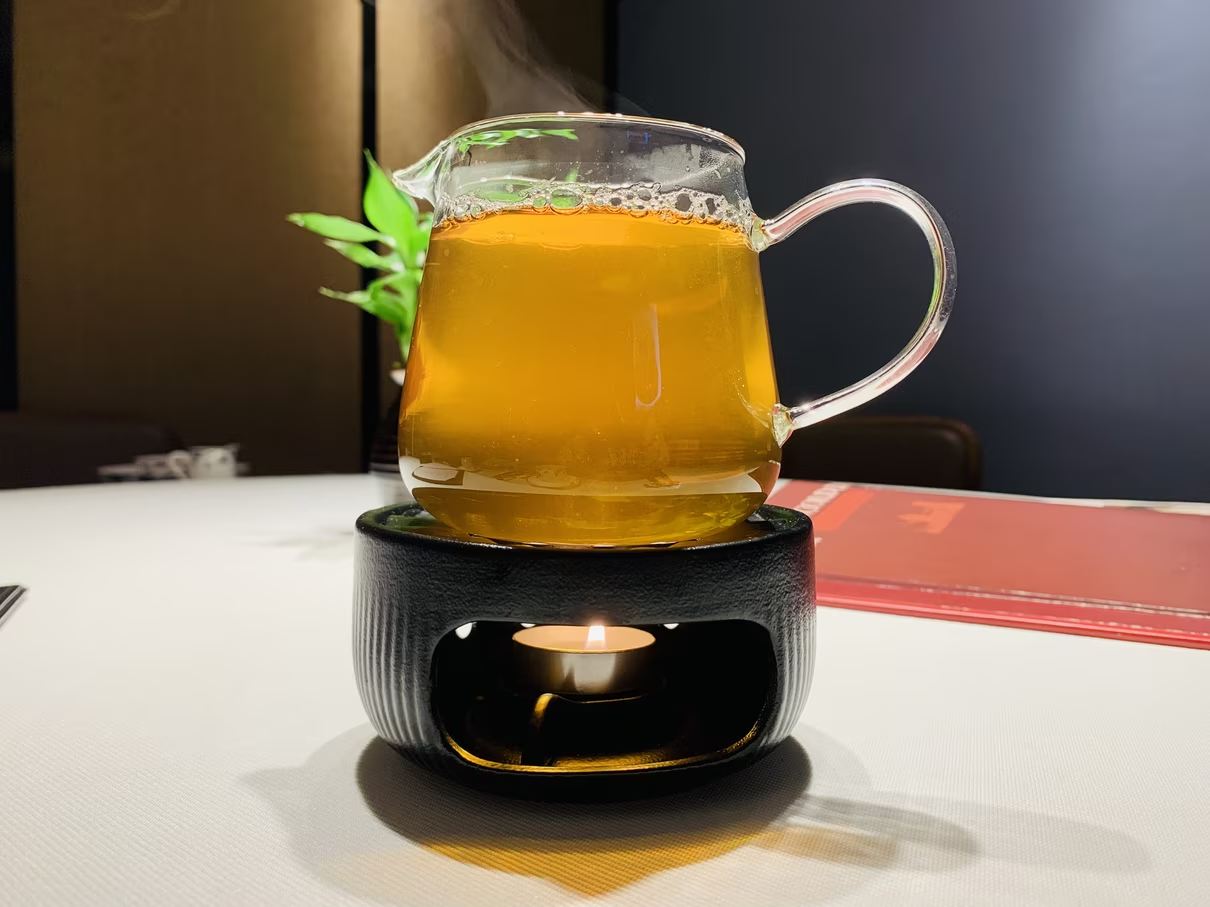
Final days in Qingyuan
Over the rest of the trip, we didn't travel as much. Mainly, we spent time with my in-laws and helped them take care of a few things like setting up some exercise equipment for her dad to rehabilitate. Jiayi's maternal uncle and aunt went out with us a few times, and they invited us to their apartment for a home-cooked dinner one evening! Jiayi's aunt and grandmother cooked a huge spread, and they cracked open a bottle of 18-year-old Glenlivet as my send-off since I would be leaving soon. The dinner was delicious, though they seemed cautious about what I would and wouldn't eat. She cooked several things with me in mind like fried rice and french fries 😅. Her grandmother was annoyed over what I would and wouldn't eat throughout the trip. At one point she rhetorically asked Jiayi if Americans eat anything at all, just like my parents would ask when I was little.
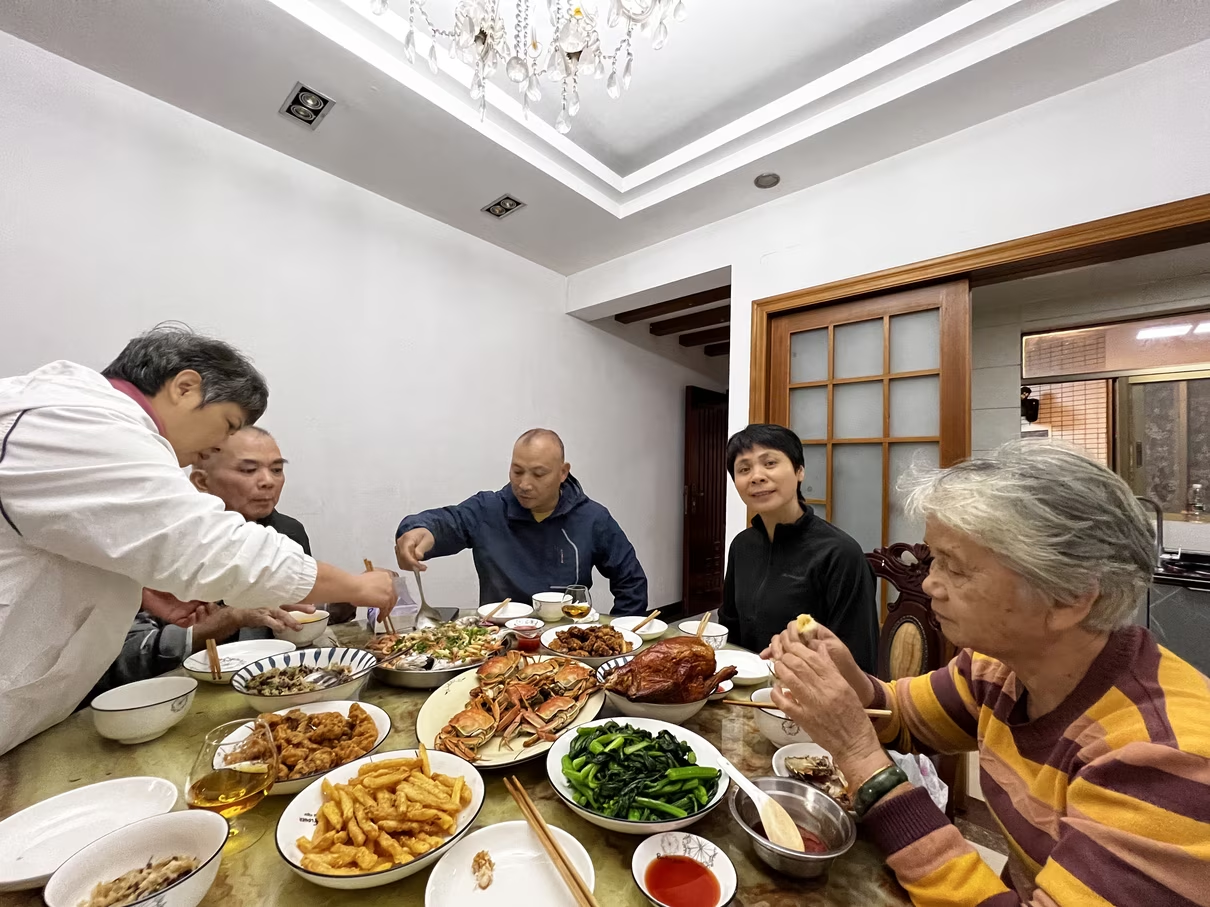
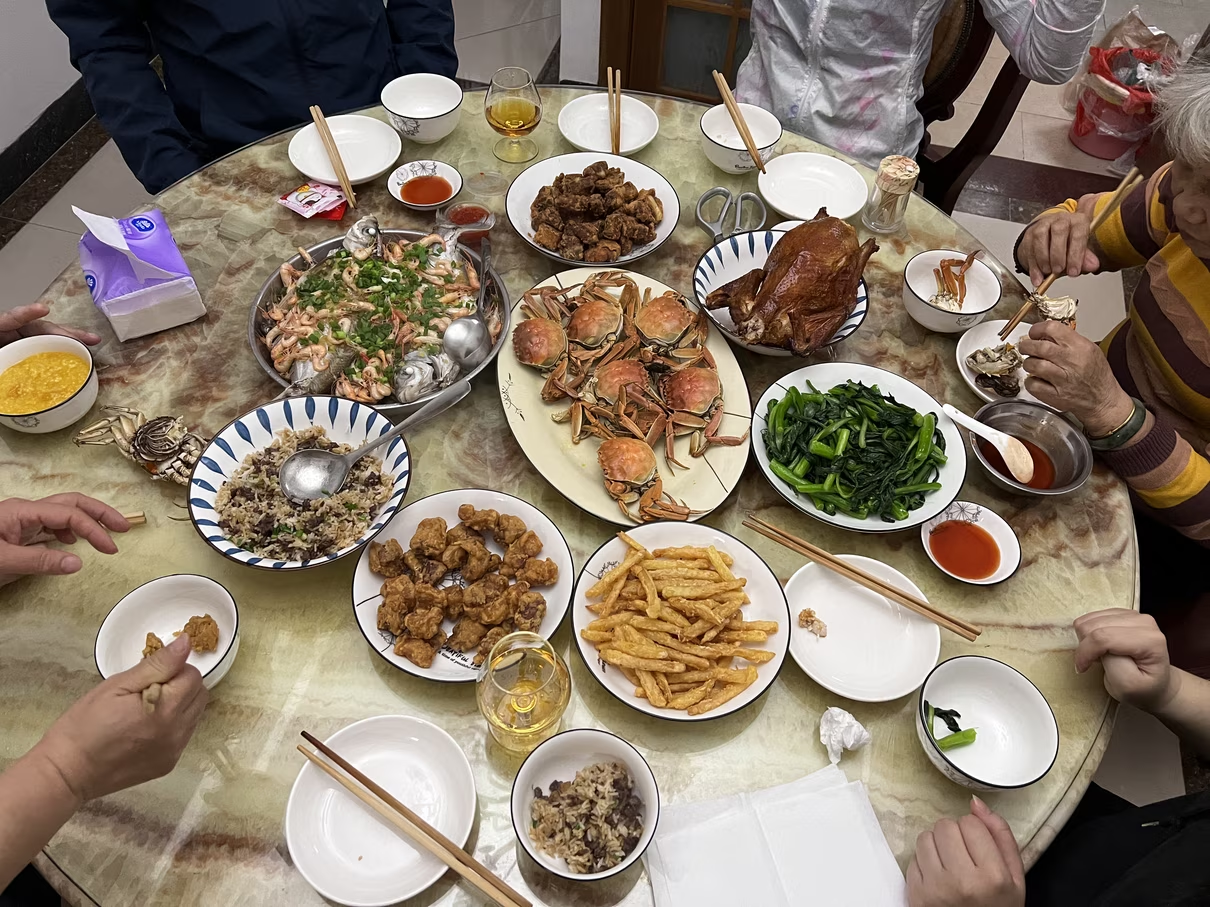
Jiayi's best friend since middle school also invited us to her apartment to eat with her and her parents. Since they knew I was American, they ordered Pizza Hut in addition to their Chinese food. It was a good thing too because I tried their fried fish and almost choked on a bone. They were all super polite and seemingly fascinated by meeting a foreigner, so Jiayi had to put in more work as my translator. Here is a photo of us together after dinner, but I look strange in the beauty cam filter her friend was using. As I understand it, the beauty cam is popular in China:
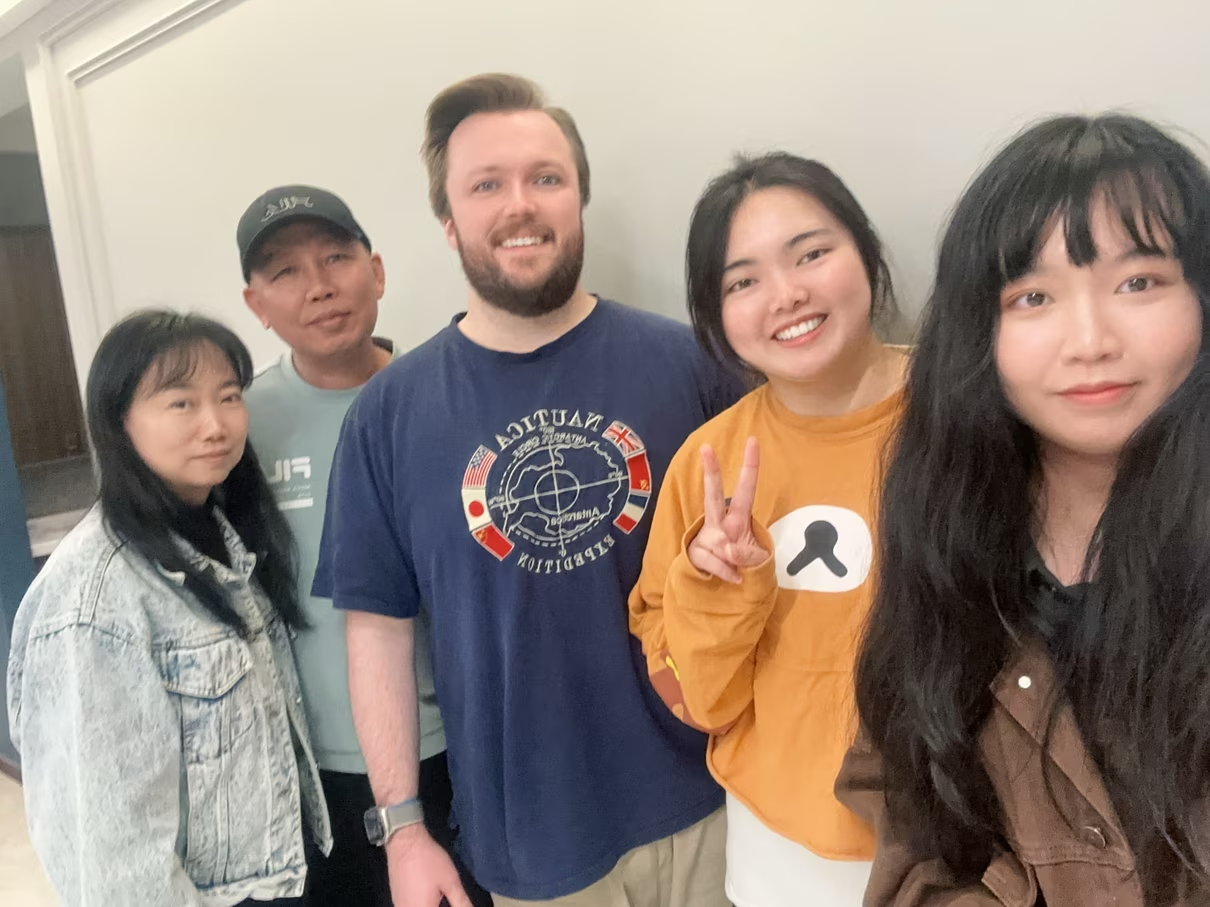
Come Friday night, Jiayi and I stayed up late since I had to head to the airport late for a 3 AM departure to kick off my 3 days of flying to the US 😵💫. We were exhausted, but we had our driver from the hospital trip take us to the airport and take Jiayi back home afterward since she was staying for another few weeks. That way, we got to have a nice goodbye which felt quite sad since we hadn't been apart this long in over 4 years.
Before heading through security, we quickly looked around Baiyun Airport's departure terminal. Though everything was closed at this hour, we found a Guangzhou Jiu Jia within the airport!!! We hadn't seen it when arriving, but it is now an imperative stop on any of our future trips through Biayun.
Wrapping up
Traveling around Guangdong province was a great experience and has piqued my interest to visit more Chinese cities. Local cuisine was excellent as well as the home-cooked meals made by her family. I'm looking forward to our next trip this year, around the same time as last year, to attend her brother's wedding. We worked in time to visit Shanghai, and the entire family is planning a trip to loop around the Pearl River Delta through Macau and Hong Kong. Perhaps I'll write a antoher post about those travels or to detail the fascinating aspects of traditional Chinese weddings given the wide breadth of differences from the Western style.
More importantly, almost a year later, Jiayi's father continues to heal and exercise. He is doing much better and has more active help from family and loved ones who all keep him in line to exercise and diet as best he can. There is still more to do for recovery. However, he's now had 9+ months of a stable, increasingly energetic condition, so hopefully, the worst is behind us. He even intends to join the family on our trip, which we wouldn't have thought possible a year ago! Finally, Jiayi and I wish a big thank you to all those in China who helped by offering to assist and donate blood and plasma. Thanks for reading and stay tuned for more in the future!